CHRISTIAN MEN OF INFLUENCE 2024
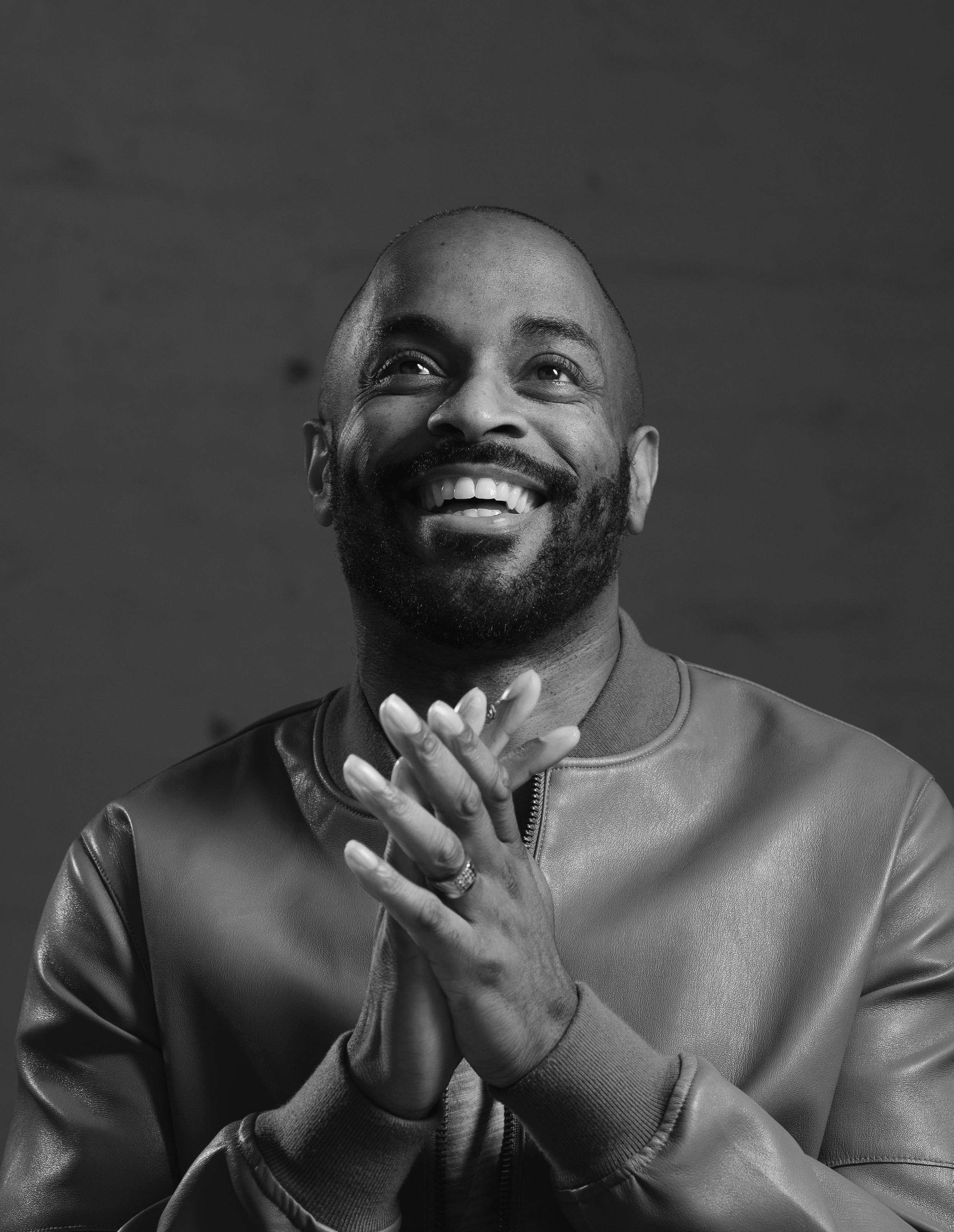
TIPS TO KEEP YOUR CHILDREN SAFE ONLINE
REACHING MEN WITH THE GOSPEL: HOW CHURCHES CAN DO SO

THE CHURCH’S ROLE IN FOUNDING LEADING FOOTBALL CLUBS
THE WINDRUSH GENERATION: THEY CAME, THEY LIVED AND LEFT A LEGACY
ISSUE
BLACKTHEUK’S AND CHRISTIANMULTI-ETHNICMAGAZINE £4.95 where sold JOHN FISHER BEM: HIS JOURNEY BACK TO HEALTH
131
Mark De-Lisser The man who makes the human voice beautiful
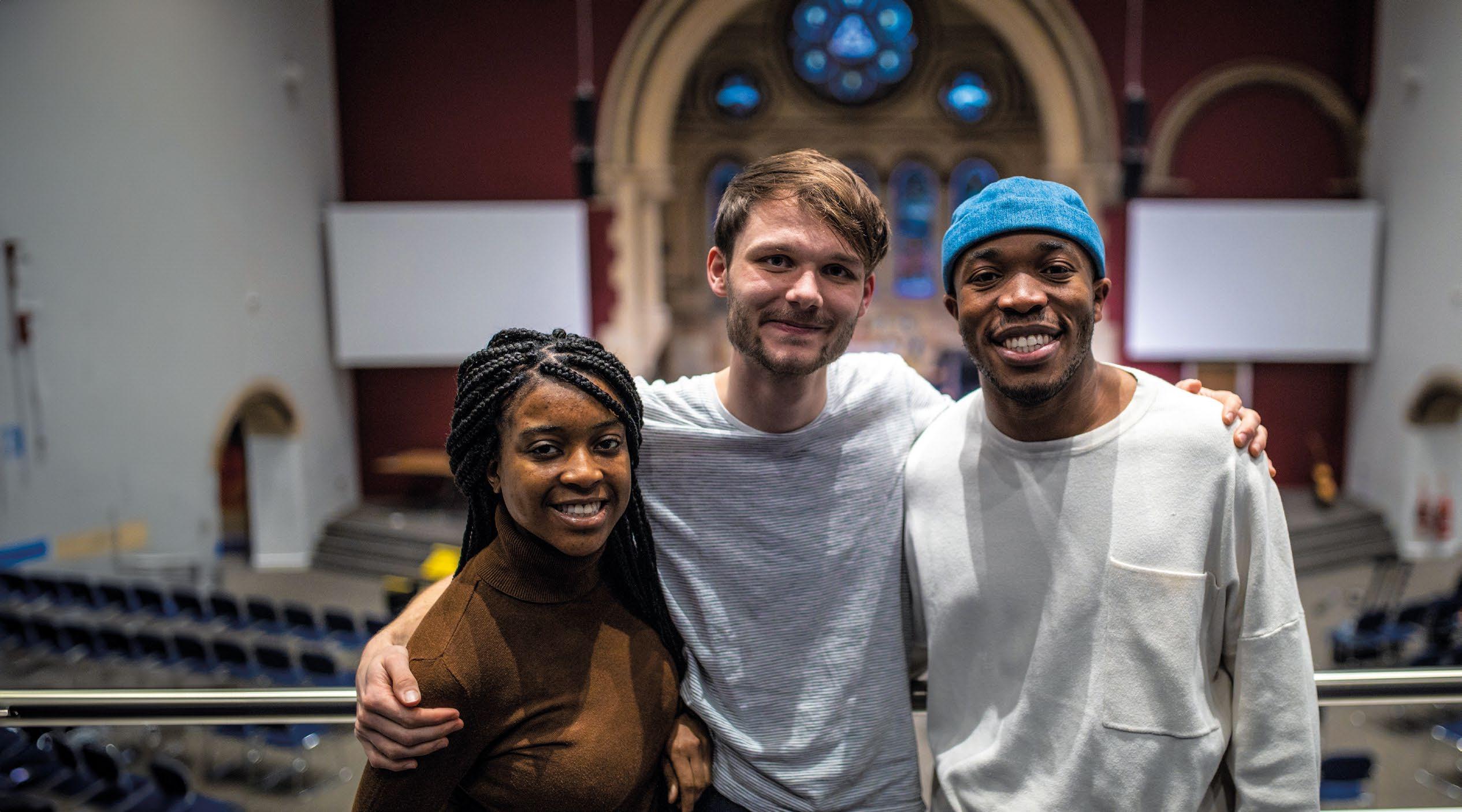
The church has so much potential for growth.
FUTURE YOUTH (FY) is an opportunity for 18s-30s to spend a year growing in young people and children’s ministry through ministry placements, training and mentoring.

FY is more than just a great experience year though; it is a chance for young people to be championed and for churches to grow.
Youth and children’s work can sometimes be made to feel like the smallest cog in the machine – and yet it lays the groundwork for the future of the church as well as bringing life and vibrancy to church congregations today.
FY participants test God’s calling on their lives by pursuing ministry in a safe and supportive environment and receiving training through a nationally run course. All placements will provide ministry opportunities across a range of ages and contexts.
The year is free to do with accommodation and expenses covered.
Future Youth meant that I could do a placement at an established church, while also pioneering a new youth project at IMPRINT Leicester. I hope this will help me improve my caring for people, being a mentor for youth and my evangelism to bring Jesus to people.
Joshua Leicester Diocese

Find out more at cofe.io/mes
EDITOR
Marcia Dixon MBE editor@keepthefaith.co.uk
GRAPHIC DESIGNER
Becky Wybrow
SUB-EDITOR
Jackie Raymond
ADVERTISING
Valerie San Pedro advertising@keepthefaith.co.uk
T: 0203 868 0664
MARKETING
Karen Seronay karen@keepthefaith.co.uk
Mairem Honrada-Magarro mairem@keepthefaith.co.uk
ACCOUNTS AND SUBSCRIPTIONS
finance@keepthefaith.co.uk
PUBLISHED BY
MTD Publishing Ltd 71 -73 Sheldon Street London WC2H 9JQ
T: 0845 193 4431 www.keepthefaith.co.uk
Facebook keepthefaithmag X (formerly Twitter) @keepthefaithmag Instagram keepthefaithmag
THE PUBLISHER WOULD LIKE TO THANK:
Dr T Ayodele Ajayi, Karen Allen, Shirley Anstis, Alton P Bell, Pastor Stephen Brooks, Pastor Yvonne Brooks, Gary Clayton, O’Neil Dennis, Akosua DF, Juliet Fletcher, Roy Francis, Vanessa Grossett, Vernette John-Joiles, Professor Paul Morrison, Pastor Clement Okusi, Joy Roxborough, Pastor Denis Wade, Verona White, Olivia Williams, our advertisers and supporters
The opinions expressed in this publication are not necessarily those of the Publisher.
Editor’s NOTE
ISSUE 131

Dear Readers,
I hope you agree that gratitude is an important quality to nurture in our lives because it makes us thankful for the good things we have. It can also make us appreciate the obstacles we face because they allow us to exercise our spiritual muscles, build mental strength, and draw us closer to God.
In this edition of Keep The Faith we’ve turned a spotlight on men to celebrate their contribution to the Church and wider world, and to explore some challenges they experience. We also bring to the fore Christian men making an impact in our annual Men of Influence list.
Juliet Fletcher interviewed Mark DeLisser, who is featured on the Keep The Faith cover. She spoke to him about his work, his faith and his experience of arranging the music for Stand By Me, the classic song performed by the Kingdom Choir at the wedding of Prince Harry and Meghan Markle.
There’s also an interview with John Fisher BEM, founder of IDMC. Whilst the choir celebrates its 30th anniversary this year, John is on a journey back to health following a stroke. He shares the role his faith in God and his strength of character have played in his recovery.
We can’t forget the Windrush Generation, so we pay homage to the foundation they laid for subsequent generations and their achievements.
This edition also includes articles about the church roots of Britain’s football leagues; keeping children safe on the web; and gospel music news.
I am grateful for the individuals who write for Keep The Faith, and I hope that as you read their wonderful writings, you’ll be inspired, encouraged and informed.
Happy reading!
Marcia Dixon
Marcia Dixon MBE Editor
To discuss how Keep The Faith could work with you, request a media pack or book an advert, please call 020 3868 0664 or email advertising@keepthefaith.co.uk
www.keepthefaith.co.uk 03

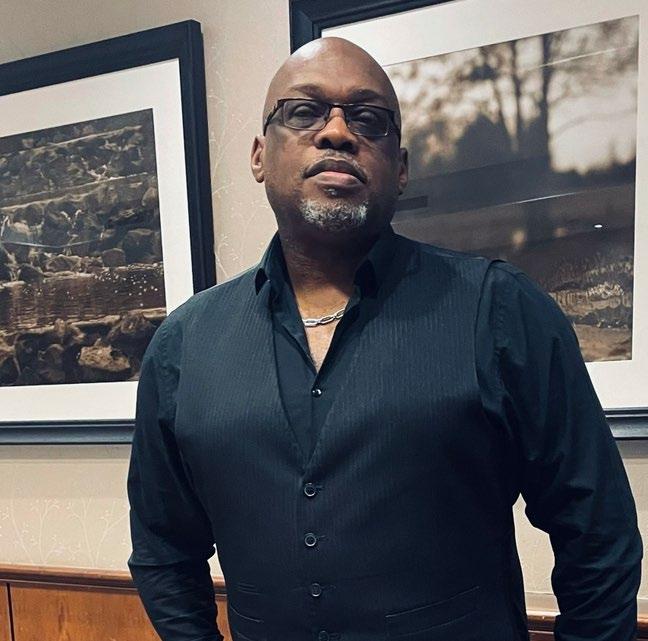


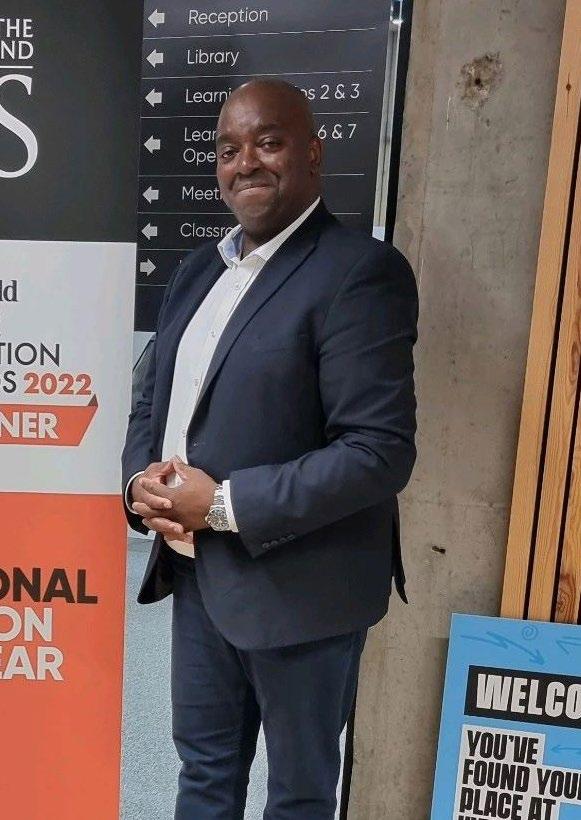
of African enslavement By Alton P Bell
36 Men, let’s talk about mental health! By Dr T Ayodele Ajayi
37 Lasting lessons from my first job By Gary Clayton
38 Men and their hair By Verona White
39 Social Workers: Whose servants? By Joy Roxborough
40 Christian men, business and the call to entrepreneurship By Pastor Denis Wade
41 Keeping young people safe online By Vernette John-Joiles
42 Matters of the heart By Pastor Yvonne Brooks
43 Why men’s health should be a woman’s concern By Olivia Williams
44 The business side to being an author By Vanessa Grossett
12 CONTENTS ISSUE 131 05 KTF starts filming documentary about women in ministry 05 Pastor Yvonne Brooks wins award 05 Bishop Eric Brown given Keep The Faith Award for exemplary leadership 06 Windrush stalwarts recognised for their work 06 UK businesswoman appointed as global lead by US business hub 07 Special service held to remember COVID deaths 08 StepFWD Gospel News By O’Neil Dennis 12 The girl ordained to sing By Akosua DF 14 Christian men of influence 2024 By Marcia Dixon MBE 19 The critical role of fathers in education By Rev Stephen Brooks 20 Black King... You are everything! By Karen Allen 21 How to reach men with the Gospel By Pastor Clement Okusi 22 “Much more than life and death” By Roy Francis 24 Mark De-Lisser: The man who hones the human voice into a thing of beauty By Juliet Fletcher 26 John
back to good health
faith
building
The came, they lived, they left a legacy
31 Paying homage to a great people By
MBE 32 The importance and necessity of Black self-determination By Bishop Joe Aldred 34 Food 4 Thought By Marcia Dixon MBE
Fisher BEM: Journeying
By Marcia Dixon MBE 28 The role of
in
a great career By Professor Paul Morrison 30
By Shirley Anstis
Marcia Dixon
pain
35 Reparations: The chance to heal the
04 Find us on X and Facebook: @KeepTheFaithmag 26 28 14 24
KTF starts filming documentary about women in ministr y

In a move designed to expand into other forms of media to share stories about the Black Christian community, Keep The Faith has started work on a documentary about women in ministry.
It will shine a spotlight on the work, faith and ministry of five Christian women: Bishop Rosemarie Mallett, Pastor Marjorie Esomowei, Pastor Yvonne Brooks, Tanya Hughes, and Pastor Rhona Tackie. Award-winning filmmaker Laurelle Jones is the director. The documentary should be completed by the autumn.
Keep The Faith publisher Marcia Dixon said: “I am excited about starting this journey to share stories about the Black Christian community through documentaries. They will seek to be informative, entertaining, and serve as a legacy piece for future generations to learn about the lives about Black people of faith.”
A GoFundMe campaign has been launched to raise funds to help finance this new initiative. Visit https://bit.ly/GFWIMDoc to make a donation.
There are also opportunities for individuals, organisations or businesses to sponsor this initiative. Sponsorship proposals are available on request. Email finance@keepthefaith.co.uk
PASTOR YVONNE BROOKS WINS AWARD
Yvonne Brooks, a pastor at the New Jerusalem Community Church in Birmingham alongside her husband, Bishop Melvin Brooks, was the recipient of the Power of a Woman (TPAW) Award, sponsored by Keep The Faith, for her ministerial work.
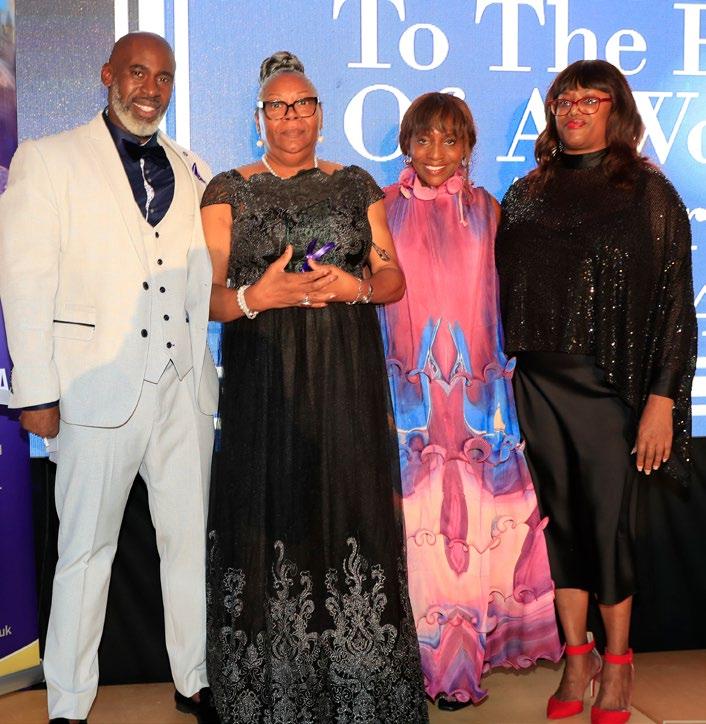
POA is the brainchild of Fredi ‘Kruga’ Nwaka, who launched the awards in 2023 in honour of his late mother, Angela Nwaka.
Pastor Brooks was ‘tickled’ at winning the award, and during her acceptance speech reminded the 400+ audience that they were born to achieve. She said: “I want us all to realise we were born with purpose, on purpose, and for purpose. I don’t believe anyone is excess to requirements. We were birthed in the mind of God, and He released us onto this earth to fulfil the purpose that is in our DNA and all over our lives.”
Visit www.thepowerofawoman.co.uk to nominate a woman for the 2025 awards.
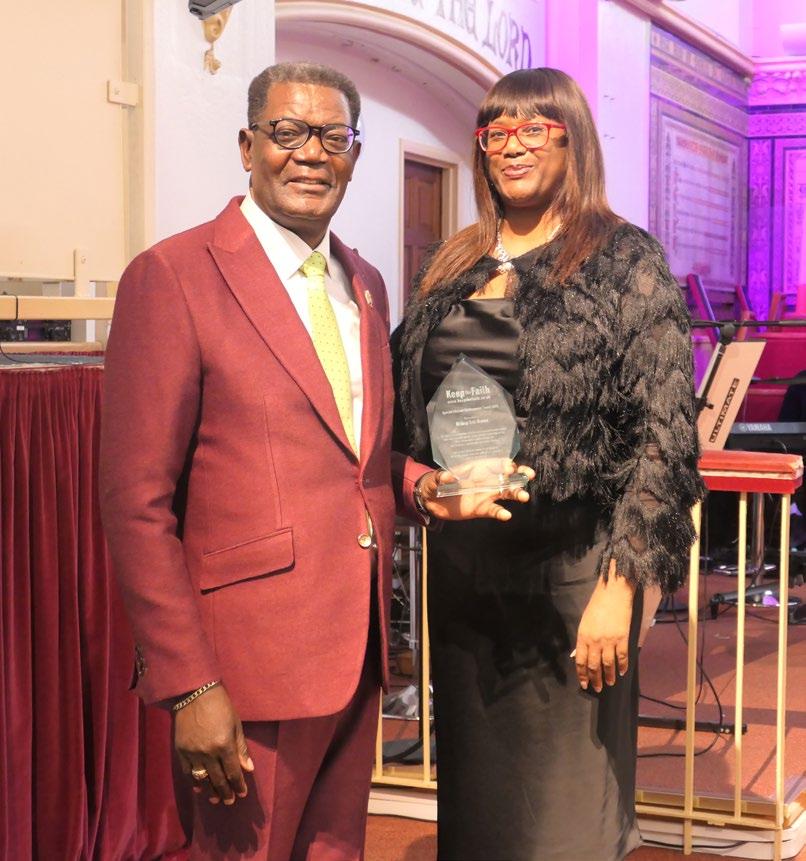
Bishop Eric Brown given Keep The Faith Award for exemplary leadership
Bishop Eric Brown is one Britain’s most respected church leaders and, alongside his wife, Rev Millicent Brown, was the focus of a special service, held in their honour as they retired from pastoral leadership of NTCG Brixton, south London.
The church was packed as members and the wider community paid homage to the popular couple. By the end of the service, the couple were visibly moved by the tributes given by people from various church departments and civic leaders, who praised the valuable contribution they had made in people’s lives, in and out of the church.
Keep The Faith editor, Marcia Dixon MBE, also attended the service and presented Bishop Brown with an award for exemplary Christian leadership.
Marcia said: “Bishop Brown has served the Church and community well – through his former roles as Administrative Bishop of NTCG UK; Pentecostal President of Churches Together in England; and Chair of Trustees of Citizens UK, along with his pastoral work. Keep The Faith has always admired Bishop Brown’s ministry and are honoured to publicly celebrate his life and his work. We wish him and his wife well during their retirement.”
www.keepthefaith.co.uk 05
WINDRUSH STALWARTS RECOGNISED FOR THEIR WORK
Two members of the Windrush Generation, Clovis Constantine Salmon OBE and Carmen Wiltshire, have been nominated for a National Diversity Award for their valuable contribution to society. Both are Christians, and highlight that age is just a number, as they are still making a difference and impacting lives.
Clovis Constantine Salmon OBE, 97, who arrived in the UK from Jamaica in 1954, is renowned for recording Black British culture with photographs and film from the 1960s onwards. He first documented the evolution of Black British Caribbean church life with his Super 8 camera, starting at the Glad Tidings Church on Somerleyton Road, Brixton, where he served as a deacon before moving on to the New Covenant Church of God, Brixton. He also captured footage about major happenings within the Black community, like the Brixton riots in the 1980s.
The Tate Modern, Barbican, and the National Portrait Gallery are amongst the major institutions that have showcased Clovis’ work, which has also been featured in TV
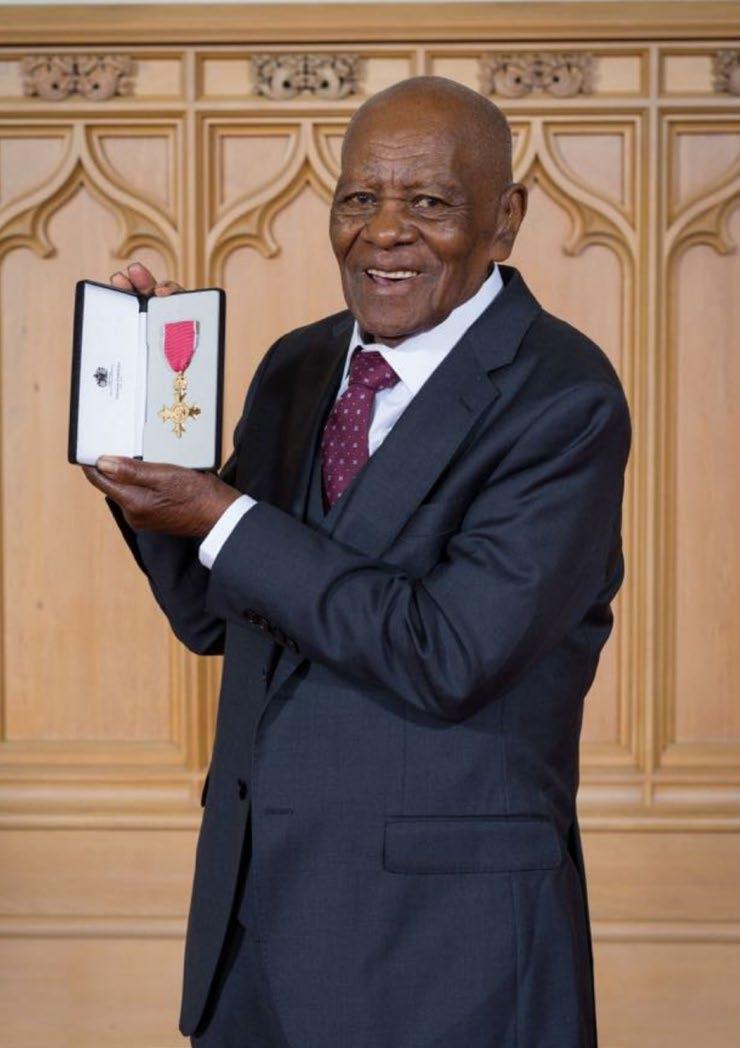
documentaries. His legacy is safeguarded in the Black Cultural Archives (BCA).
In April 2024, Clovis published a children’s book entitled The Fastest Wheel Builder in Britain: A Story of Clovis Salmon, aka ‘Sam the Wheels’
Carmen Wiltshire has been a minister in the Church of God of Prophecy since 1972, serving the church and wider community. During her early years of ministry, she supported the homeless and mentored individuals, and some of those she mentored have gone on to achieve great success.
At the age of 69, Carmen started the Karoy Foundation, where she has led several sustainable aid projects in Ghana, Jamaica, and the UK. Her initiatives include constructing
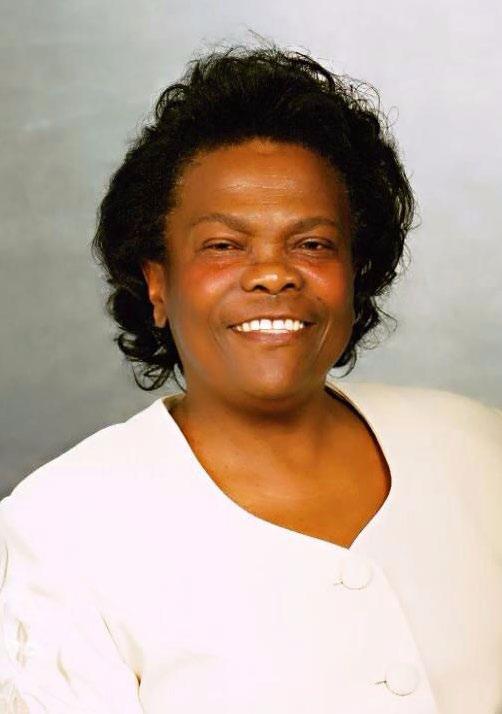
a school in Ghana; implementing five clean water borehole projects in a village; providing breakfast for underprivileged children in a Jamaican school; and establishing a school for adults in Tooting, London, with courses in mathematics, English, computing, and dressmaking. All this alongside her husband Roy, who has given his wholehearted support to her initiatives.
Now aged 84, Carmen remains committed to supporting the disadvantaged and vulnerable in society and the wider world.
Both Carmen and Clovis are examples of the indomitable spirit that characterises the Windrush Generation.
Visit www.nationaldiversityawards.co.uk
UK BUSINESSWOMAN APPOINTED AS GLOBAL LEAD BY US BUSINESS HUB
Claudine Reid MBE, one of the most well-known businesswomen within Britain’s Black Christian community, has been appointed Global Opportunities UK leader for the Atlanta Black Chamber of Commerce
Atlanta is home to some of Black America’s leading Black entrepreneurs, including billionaire Tyler Perry. Claudine’s role will entail building connections between Black entrepreneurs in the UK and Atlanta.
An award-winning businesswoman, Claudine is Managing Director of PJs Community Services, and Chair of Lloyds Bank Business Advisory Group. She is delighted with this new appointment. She told Keep The Faith: “It’s a really exciting appointment, not only for what it means for Atlanta, connecting with entrepreneurs across the UK, but also the opportunities it presents for Black entrepreneurs in the UK.”
“My work will entail identifying and perusing new opportunities for trade partnerships within the UK from the Atlanta side. I will also be responsible for implementing strategies to build relationships with key stakeholders and helping Black entrepreneurs to leverage those types of opportunities in Atlanta.”
Visit www.metroatlantachamber.com

06 Find us on X and Facebook: @KeepTheFaithmag
CLOVIS CONSTANTINE SALMON OBE
CARMEN WILTSHIRE

Spring Harvest will be back in 2025… and Rick Warren is coming!
Following another packed-out event this Easter, we are thrilled to announce the return of Spring Harvest for 2025!
How about joining us? Your life might change forever.
Spring Harvest is for EVERYONE. It’s a yearly gathering that has been sparking inspiration and revival for individuals, families, and churches for over 40 years.
Providing relevant and insightful teaching, passionate worship, and a sense of community that feels safe and welcoming, Spring Harvest is all about empowering you, your family, your friends and your church to Gather, Grow and Go.
Happening from 7th to 11th April in Skegness and 14th to 18th April in Minehead, Spring Harvest 2025 promises some mountain-top moments for the whole family, your friends, your congregation… anyone who decides to come, and anyone you bring with you.
Whilst our event line-up is still in the works, we have some exciting news to share. Pastor and world-renowned author Rick Warren will be joining us in person at both Skegness and Minehead next April
Rick Warren is the founder of Saddleback Church, an evangelical Baptist megachurch in Lake Forest, California. Since 2022, he is also Director of Finishing the Task – a mission coalition. One of his books, The Purpose

Driven Life, has sold more than 50 million copies in more than 85 languages.
“We are so looking forward to welcoming Pastor Rick Warren to Spring Harvest next year,” expressed Abby Guinness, Head of Spring Harvest. “He has so much to share from his long commitment to the Christian life and the local church. His work with Finishing the Task is exciting for all those who want to see the Great Commission of Jesus become a reality in our world.”
As well as some great teaching, the event promises plenty of worship, prayer and fun. The Butlin’s Resorts, famed for their great facilities and exciting attractions, provide the perfect backdrop for this celebration. It’s an atmosphere where faith and joy collide.
We extend a warm invitation to join us for a week of Spring Harvest!
Booking opens June 12th at 8AM online and on the phone. For all the details about Spring Harvest 2025, hop on over to https://www.springharvest.org.
It’s really the best place you could be next Easter.
Special service held to remember COVID deaths
The annual Service of Reflection, held to commemorate the impact of the worldwide pandemic on Black communities in the UK, and provide a focal point for the bereaved to remember loved ones, was held recently at the New Testament Assembly, Tooting, South London.
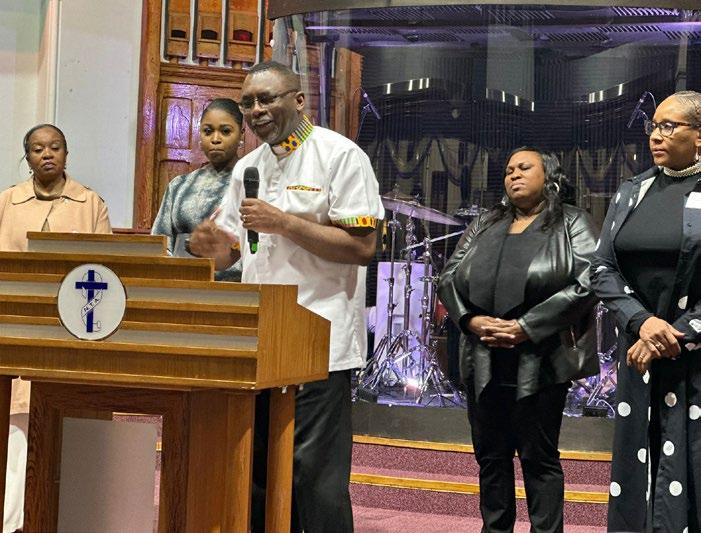
The service was organised by Reverend Cassius Francis of the Wesleyan Holiness Church (WHC). He said: “The initial idea for this service came from the realisation of the disproportionate impact of the pandemic on Britain’s Black communities. The aim was to acknowledge what had happened, remember those who had passed and grieve in a safe space.”
The service was an intergenerational event, featuring contributions from children, teenagers, as well as dignitaries and church leaders.
One of the service highlights was the roll call of names. Reverend David Whyte, National leader of the WHC, reminded those present of the biblical importance of remembering those who had passed and encouraged people who had experienced the loss of loved ones from COVID-19 to go to the front of the church and state their name publicly. Several took the opportunity to do so. After the service one person shared: “This is the first time that I have been able to properly grieve for my family member after all of these years.”
The fourth annual Service of Reflection will take place on Sunday 23 March 2025, at Manchester Cathedral.
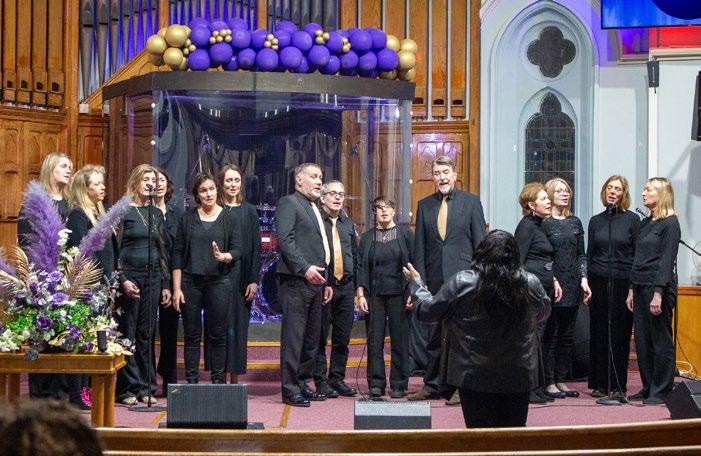
www.keepthefaith.co.uk 07

RSL AWARDS & GMIA HONOUR UK GOSPEL ICONS DURING LAUNCH OF NEW GOSPEL MUSIC QUALIFICATION
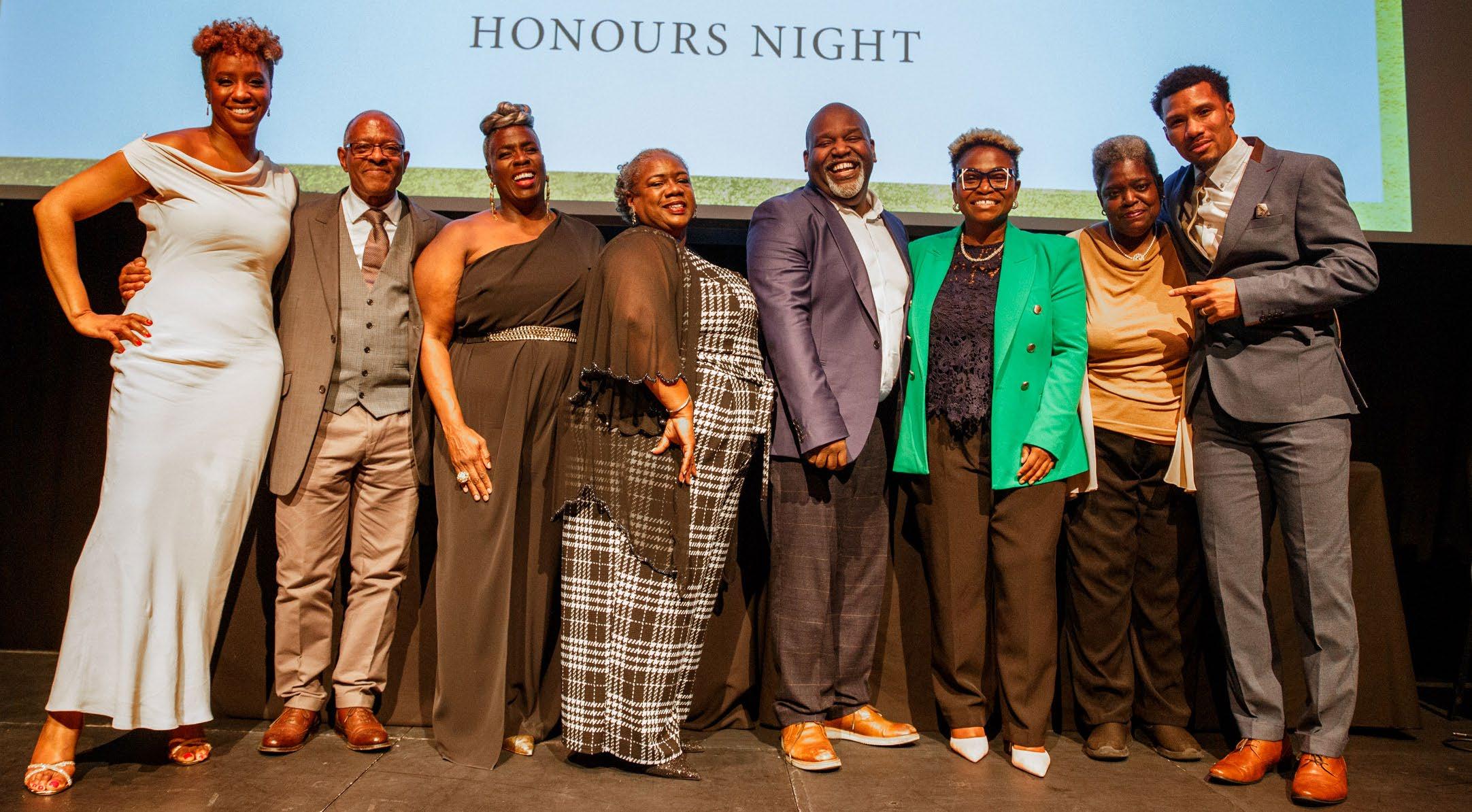
Due to a groundbreaking collaboration between international awarding organisation RSL Awards and the GMIA (Gospel Music Industry Alliance), it is now possible for gospel singers and musicians to obtain a standard of excellence with graded music qualifications in gospel music for the first time.
This initiative was recently launched at a special event at London’s iconic Kings Place, where 18 musicians and artists were recognised for their contribution to UK Gospel with an honorary award.
Several highly acclaimed UK gospel choir directors, such as Bazil Meade MBE, Tyndale Thomas MBE and Karen Gibson MBE, were among the many inspirational individuals given Honorary Fellows.
Notable gospel music recording artists, such as Noel Robinson, Priscilla JonesCampbell; composers, such as Ken Burton; prolific music educators Audrey MattisLawrence and Ray Prince, as well as music producers Nicky Brown and Ayo Oyerinde were also awarded. All the honourees received a Honourary Level 7 RSL & GMIA
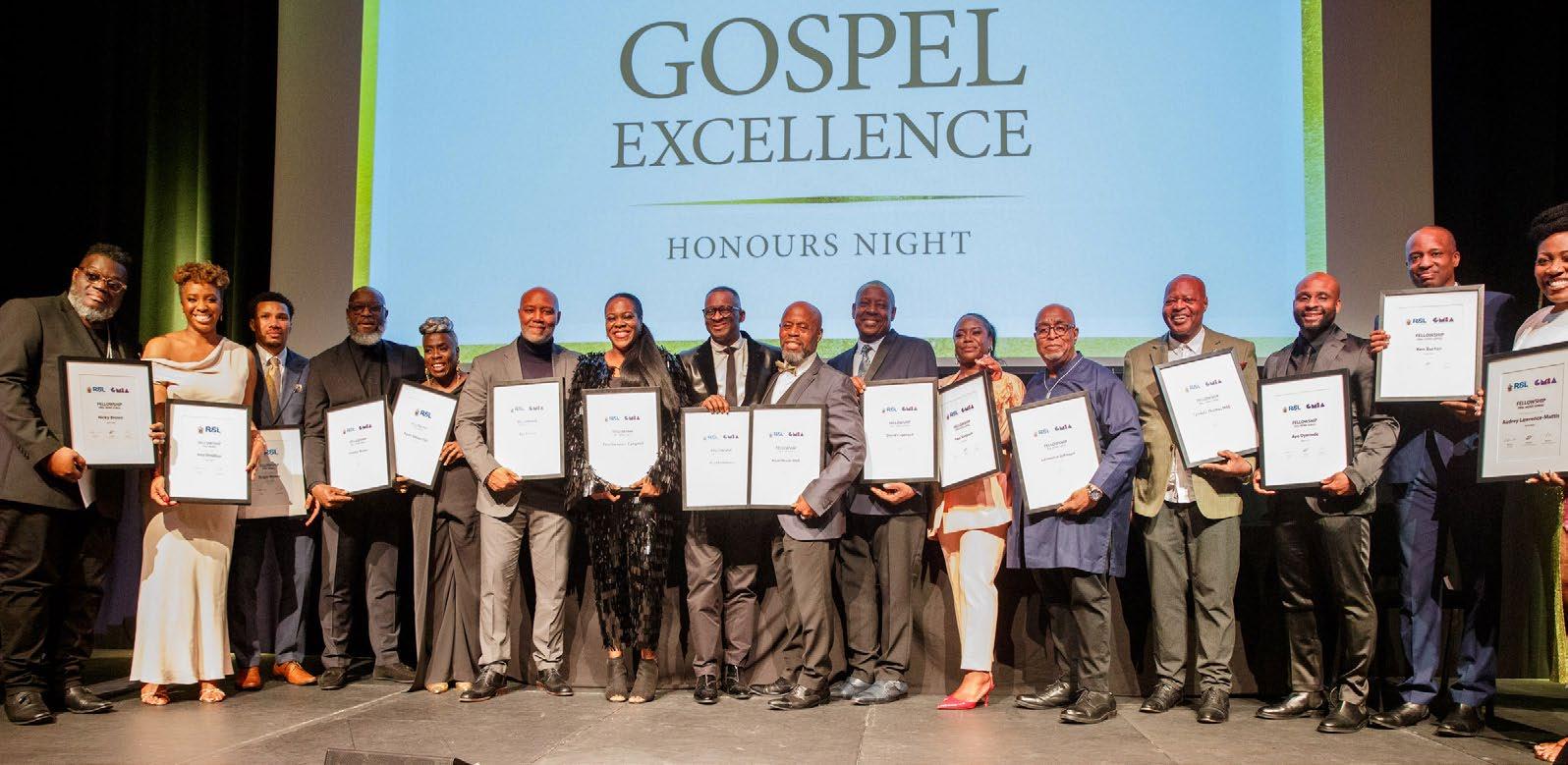
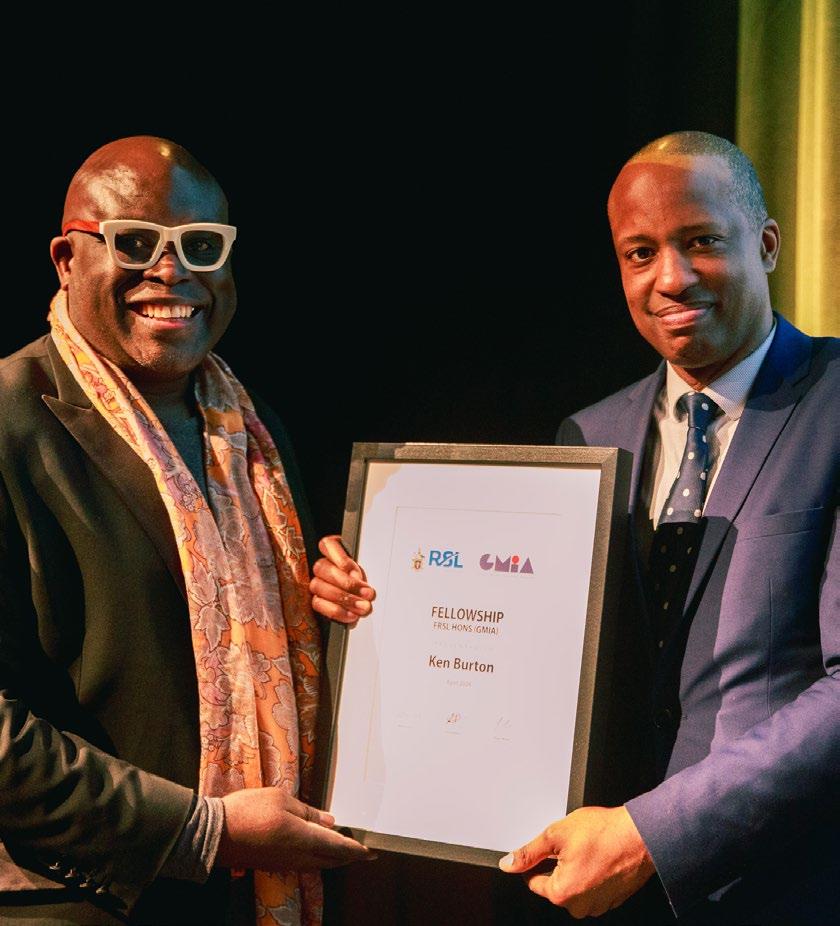
Fellowship as formal recognition of their exceptional talents, creativity, and continuous contribution to the music industry.
Many familiar faces from the UK gospel community were present to celebrate this major development for gospel music heritage and, by default, Black history. As Muyiwa Olarewaju OBE observed, the influence of gospel music permeates popular music and culture, while it can also be traced to have birthed most other music genres, such as rock and blues.
08 Find us on X and Facebook: @KeepTheFaithmag
GOSPEL NEWS
Muyiwa Olarewaju OBE and Ken Burton
GMIA Board of Directors
Recipients of RSL Awards
It’s noticeable that the popularity of gospel music continues to grow – especially through choirs, as we can see from the vibrant scene in the UK today. Gospel choirs have performed at royal weddings, as well as festivals and awards ceremonies, where they have performed alongside the most influential artists in the world today, such as Sir Paul McCartney, Elton John and Mariah Carey.
RSL Awards and GMIA will offer a suite of Ofqual-regulated grades to formally assess gospel practitioners who demonstrate their performance skills at grade 6 level or above. The qualifications carry UCAS points ideal for university and higher education.
The qualifications were developed through a series of workshops. For vocal syllabuses, much work was undertaken by Audrey Lawrence-Mattis, Karen Gibson MBE and Alex Foryan. Both RSL and GMIA are set to create resources to support up-and-coming gospel practitioners. The development of the qualifications signals an exciting new chapter for the UK gospel industry which we can’t wait to see unfold.
RSL & GMIA Honorary Fellows were awarded to:
Audrey Lawrence-Mattis
Ayo Oyerinde
Bazil Meade MBE
Clinton Jordan
David Copeland
Jerome Brown
John Fisher BEM
Karen Gibson MBE
Ken Burton
Lawrence Johnson
Nicky Brown
Noel Robinson
Priscilla Jones-Campbell
Ray Prince
Tyndale Thomas MBE
In addition, RSL Fellows were also awarded to Anu Omideyi and Roger Moore. Special appreciation was extended to Audrey Gray, CEO of GMIA and Naomi Morris of RSL for their contributions.
Learn more about the qualifications at https://www.rslawards.com/gmia
Article written by Samantha Radford
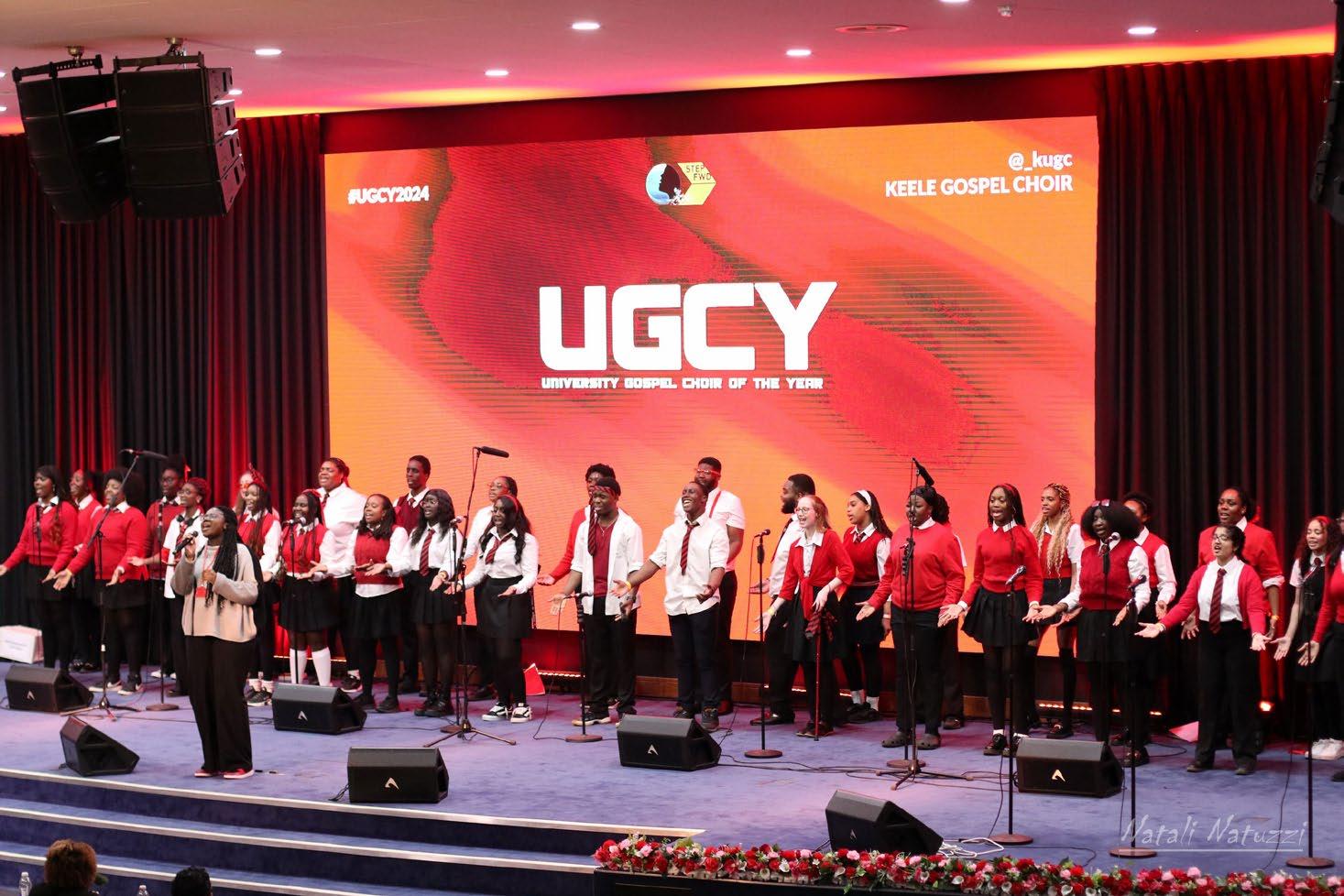
Miriam Culy writes about the positive impact singing with a gospel choir can have on mental health and well-being
Being part of my university gospel choir has been a truly life-changing experience for me – and I’m not the only one! University gospel choirs across the UK are bringing students together for fellowship, worship and prayer – on campus – and providing love and support for each of the members involved.
University can be a tough time for many students – juggling workloads, being away from home, and all the other struggles life brings. After my second year, I was struggling with my physical health; the harsh reality of suddenly becoming a wheelchair user; and the bitter depression that accompanied this. When I turned up to the Keele University Gospel Choir (KUGC) taster session in the first week of my third year, I knew at once that I had found a home. And I know that this choir has provided a family not just for me, but for every member of KUGC.
The beauty of a gospel choir is that they have Jesus at the centre. I had been in other choirs before KUGC, but this shift in focus made all the difference. We worship and pray before rehearsing. We support one another as brothers and sisters in Christ. We love one another without judgement or condemnation. And I am so grateful to the choir for that, because after everything I had been through with my physical and mental health, their love and support helped me to keep fighting. It stopped me from dropping out of university, and I genuinely don’t think I would’ve made it through my third year without their support.
It isn’t just me or those at Keele who have experienced incredible love and support
from their gospel choir, though. In universities all across the country, students are finding a family in their university gospel choir. Lorraine Wright MBE, founder of University Gospel Choir of the Year Competition, who has seen the benefits of university gospel choirs over the last 12 years, said:
“The testimonies have been intense. We’ve heard from students who were likely to drop out of university but had this support system around them. We’ve heard from people who didn’t have any other outlet to praise and worship, but were able to use their gospel choir as an outlet to do that. And we’ve heard of people who had mental health challenges, and their gospel choir really helped support them through it. Their choirs have been a rock for these students.”
You might still be wondering whether this is for you. Maybe you’re uncertain if you are talented enough or confident enough to sing in a choir. Whatever is holding you back, I urge you to go for it! Music is not something that only the most talented elite can partake in – music is for everyone and is something we are encouraged to do in worship.
In the Bible, singing is mentioned over 400 times, 50 of which are commands. Ephesians 5:19 tells us to ‘Sing and make music from your heart to the Lord’ – and that is the aim of any gospel choir, to make music from our hearts to praise the Lord our God.
I had very little confidence in my singing ability when I joined KUGC – as a female singer with a tenor range, I’d been made to feel like I wasn’t good enough in the past because I couldn’t hit the soprano notes
Continued overleaf....
and struggled even with alto. No one ever made me feel like that in gospel choir.
Although the parts and harmonies are of course important, we are doing it all to worship the Lord our God, and that surpasses any qualms about musical technicality, range or know-how. With hard work and dedication, alongside the constant encouragement and support of our amazing vocal director, our medleys always come together in the end.
Our KUGC president, Chidinma Ogu, said of the gospel choir: “I’m so glad I took a step out of my comfort zone, because God has blessed me immensely through being part of it.” We have seen over the last two years God provide for our choir, allowing us to exceed all expectations and land second place at the University Gospel Choir of the Year Finals 2024.
Joining KUGC was truly the best decision I made at university, and I would encourage anyone to give their gospel choir a go!
5 EVENTS YOU SHOULD GET TO THIS SUMMER
Whether you’re a seasoned gospel enthusiast or just looking for a fresh and uplifting experience, the list of summer events this year is hotter than ever! From electrifying concerts to heart-warming choir performances, there’s no shortage of entertainment to lift your spirits and brighten your summer days. So, grab your friends, bring along your family, and join in the celebration of music, faith and community. Search Eventbrite and book your tickets today!
VICTORY SOUNDS Sinach Live In Concert, 7th July, London
FRED HAMMOND Greatest Hits Concert, 13th July, Birmingham
THE GRACE BRUNCH Holi Boys and Girls Summer, 21st July, Secret Location
CREATION FEST, 1st - 4th August, Cornwall
LIVERPOOL GOSPEL MUSIC FESTIVAL, 7th September, Liverpool

Gospel News is curated by O’Neil Dennis, Founder of AStepFWD.com, the UK Christian Charts, StepFWD Awards and more. To get in touch, email info@astepfwd.com
FWD FOCUS
KINGDOM TOUR
London and Manchester will experience one of the most long-awaited global events, as the Kingdom World Tour with Maverick City Music and Kirk Franklin hits the UK in August 2024! This highly anticipated tour stop promises to be a powerhouse of gospel music.

From Maverick City Music’s innovative sound to Kirk Franklin’s legendary hits, Kingdom Tour is set to be an unforgettable experience through the heart of gospel music. So, mark your calendars, gather your friends, and prepare to be swept away by two of the biggest names in gospel, plus support from top UK acts Warehouse Worship, Charles Dada and Areatha Anderson Williams. Get ready to witness the Kingdom come alive in London and Manchester this summer!
UK CHRISTIAN CHARTS
Great music is back on the menu as the UK Christian Charts gets underway again, with monthly listings of the best tracks from the tremendous pool of talent across the country.
AStepFWD’s COO, Tolu Adebekun, explained: “At the end of 2023 we invested heavily in improving the process of creating the charts. We built a proprietary software that pulls together the new releases from over 600 artists. It reduces the time to find new releases from weeks to hours. We are now entering a whole new era of UK Christian and gospel music curation!”
Here are a few top tracks from the UK Christian Charts to add to your playlist:
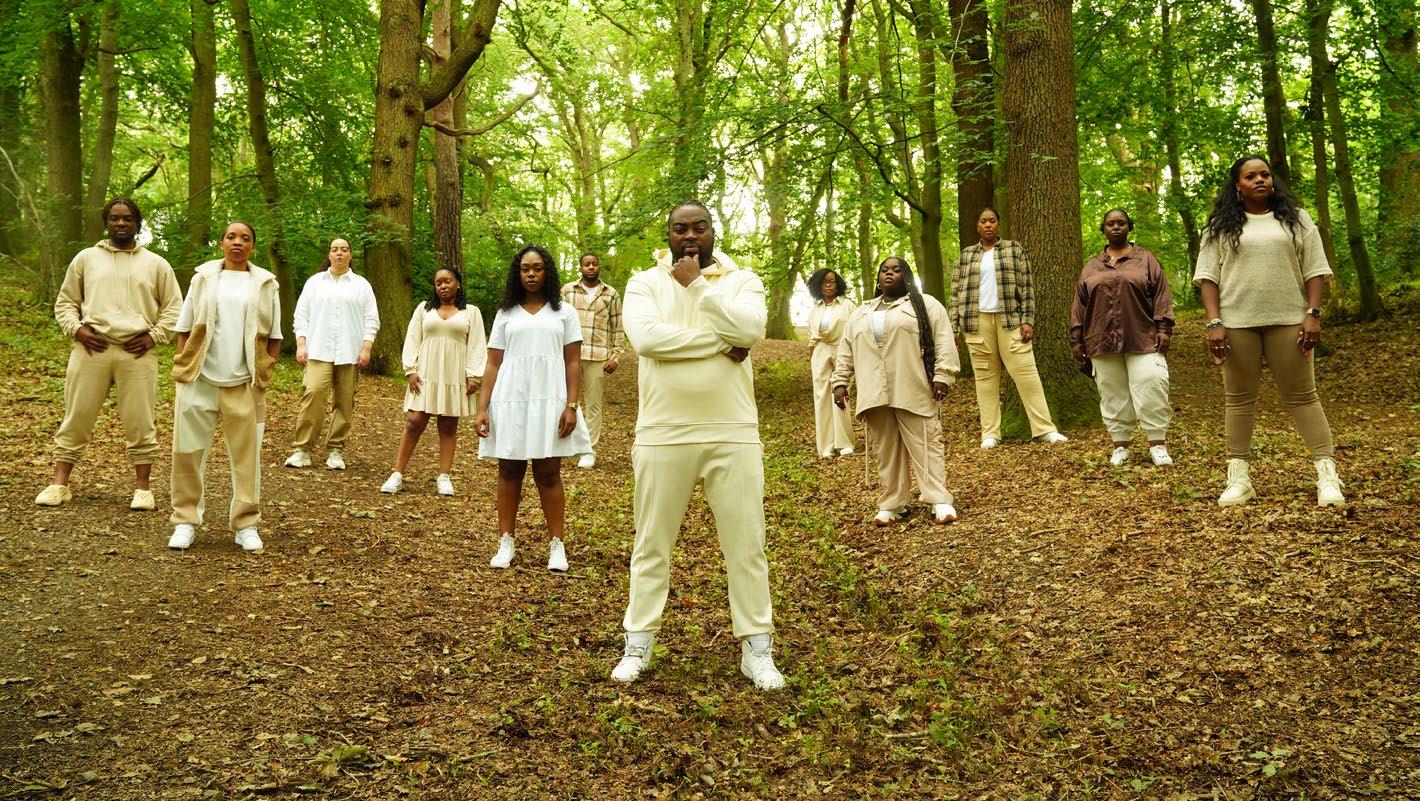
CONTEMPORARY GOSPEL: ‘I Will Not Fail (Unplugged)’ Volney Morgan & New Ye
RnB/SOUL: ‘Hiding Place’ NaffymaR, Noël Mio, Pawasonic
AFROBEAT: ‘Good God II’ Limoblaze, Naomi Raine
REGGAE: ‘Holy Is The Lamb’ Shezzie
RAP: ‘Wavy’ Reblah
10 Find us on X and Facebook: @KeepTheFaithmag
Miriam Culy
Volney Morgan & New Ye
Digital £30
Digital + Print £39
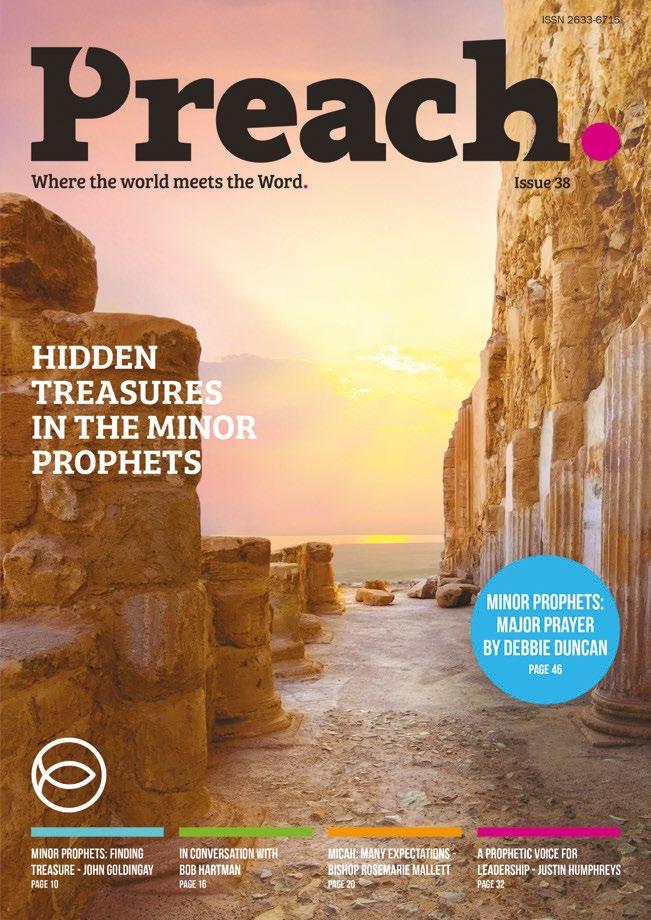

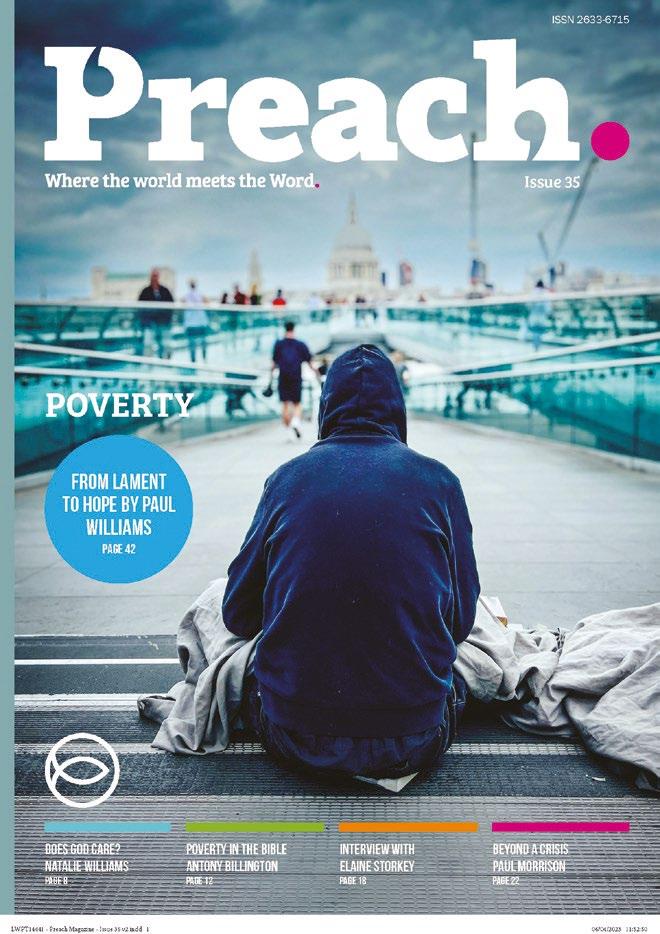
The magazine
Bible teachers
have
PASSION
applying the Bible
daily living Request your FREE special edition Best of Preach below
for
who
a
for
to
LWPT supports local church-based leaders through Bible-based preaching, resources and tuition grants. The Preach archive is a treasure trove of interviews, practical advice, book reviews and more – membership gives you easy access to ALL of it. Annual membership
Scan the QR code or visit preachweb.org/best-of-preach
The girl ordained to sing
UK Gospel’s Areatha Anderson Williams is renowned for her soul-stirring vocals and powerful stage presence. The London-born singer’s passion for music and faith was nurtured from a young age, shaping her into the powerful artist she is today. Areatha’s notable collaborations include ministering alongside Joe Mettle, Dunsin Oyekan, Nathaniel Bassey, Phil Thompson and Sinach, among others. 2022 saw Areatha duet with Grammy-nominated Travis Greene in front of 35,000 people at the Big Church Festival. With three singles under her belt, the singer has her sights set on a live album recording in the future. She spoke to Akosua DF about music, her experience ministering with some of gospel’s biggest stars, and her hopes for the future.



12

AKOSUA DF (ADF): For our readers who aren’t familiar with your journey, tell us a bit about how you got into music.
AREATHA ANDERSON WILLIAMS (AAW): It was God-ordained. God used His servants to speak a word over me. At my dedication, there was a word that went forth saying that God would use my voice to be a blessing to His kingdom and to the world. So, I’ll say that’s what started everything, but my mum got me involved in a lot of musical activities, like choirs, keyboard lessons, and drama classes, so that got me into singing. Ministry-wise, things really kicked off when I joined Victory Bible Church International under the leadership of Bishop Clement Asihene. He saw the gift in me and nurtured it. I started travelling with him for ministry; people started to invite me to minister; and the rest, as they say, is history.
ADF: A little birdie told me that your dad named you after the legendary Aretha Franklin. What are his thoughts on your artistry?
AAW: Yes, so my dad named me after Aretha Franklin. He loves music and sincerely believes he can sing [chuckles]. He was always very intentional in ensuring that there was music around me. He is one of my greatest cheerleaders and critics. He always has something technical to say about my ministrations, but I love it because he is interested in how God is using me. Interestingly he does try to teach me how to sing and improve my stagecraft [laughs]…
ADF: You veered into world of afrobeats at some point. Did you plan to establish yourself as an afrobeat artist? Do you regret giving it up?
AAW: Once upon a time I was a budding afrobeat singer…. yes, I ventured into the world
of secular music. Let’s just say that was many moons ago [laughs]! You know what, I have absolutely no regrets at all leaving that world. I won’t lie, it was fun meeting different people; getting into the studio; making money, etc., but there was no true meaning to it all. There was no real satisfaction in doing it because I always knew that I was called by God. I knew that there was an assignment for my life. Even though the music I was doing wasn’t vulgar, I can’t truthfully say I was pleased with what I was doing. I did, however, learn a lot about the industry, so that was a plus, but I love what I do now and would never go back to secular music.
ADF: We are super blessed to have you doing kingdom work so I’m glad to hear you don’t plan to return to afrobeats. You’ve worked with some of the gospel industry’s most renowned artists. What are some of the greatest lessons you’ve learned during your season of serving?
AAW: I’ve been super blessed to work with some of gospel’s biggest names and noticed that serving has been a great stepping stone for me. It’s one of the secrets of my growth. I try to always ask them questions and have gleaned so much from them. They have years of ministry under their belts, so it’s great to tap into their wisdom and anointing. If you were to ask what the highlight of all these years of serving has been, I’d probably say working with Minister Dunsin Oyekan. He takes time out to pour into his background singers: he’ll talk with us, pray with us, etc. I believe every artist should serve in some capacity to ensure that they are always learning and developing.
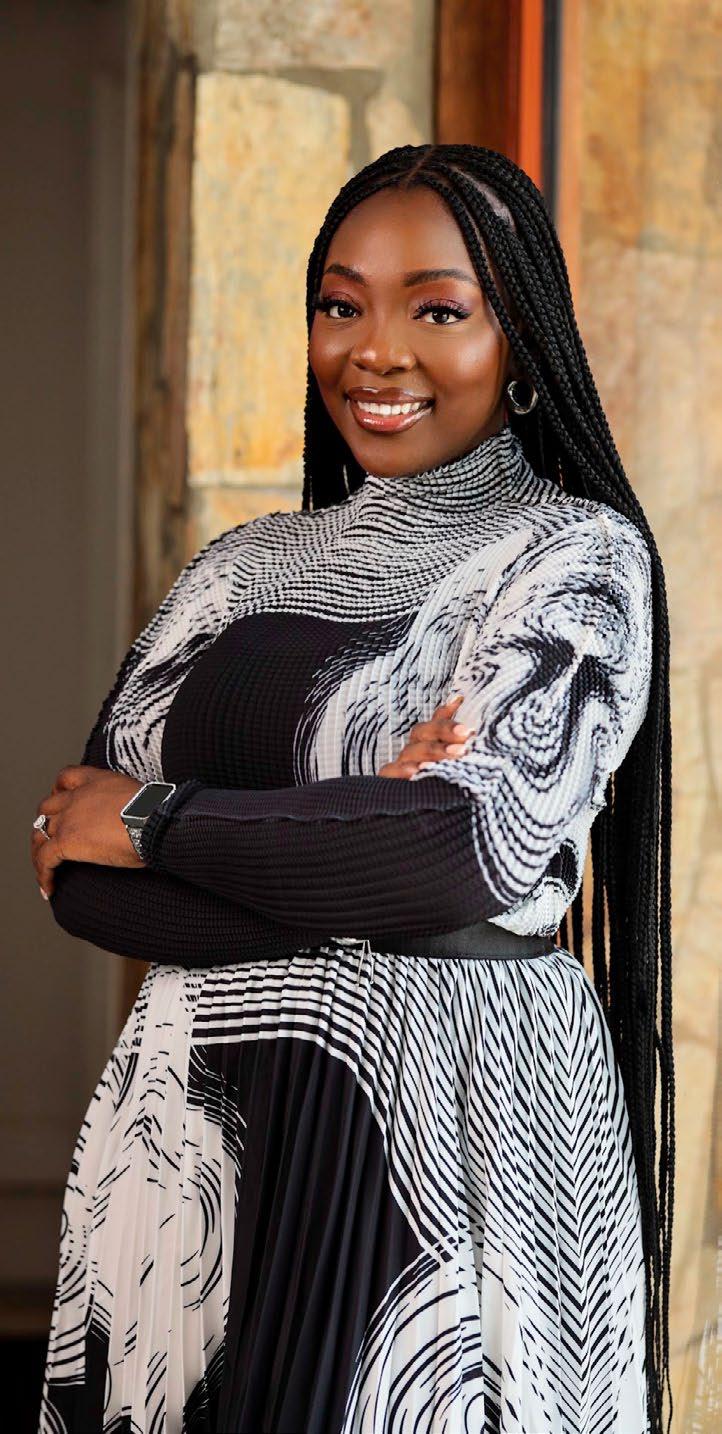
ADF: What’s your most memorable ministration to date?
AAW: Oooh, that’s a good question! It’s a ministration for an event that wasn’t heavily publicised, so I doubt many people will know of it. There was an event by Divine Soldiers, hosted by Minister Roland Regan. I went to minister in Ireland and God moved through me in a mighty way. Healing and deliverance took place during the meeting, it was surreal. Another memorable ministration would be leading about 20,000 people in worship at the Manchester Arena during Apostle Joshua Selman’s 2023 Koinonia UK Conference God has been faithful to His word concerning my life and I am truly grateful to be used by Him.
ADF: After a four-year hiatus you are back with your third single, ‘Jesus’. Tell us the story behind the song.
AAW: Gosh, it has been a long time since I released music, but I am back. ‘Jesus’ was birthed during a very difficult season of my life. I was going through a lot but couldn’t really unburden myself onto anyone. The song was my response to the Lord. I decided not to complain or question God but rather affirm myself based on His Word. I had to remind myself who Jesus was to me – ‘… the Rock on which I stand’. Like David, I had to encourage myself in the Lord and rise above my circumstances. I believe that the song will be blessing to everyone who hears it.
ADF: Can we expect a full-length project from you anytime soon?
AAW: Well, that is my aim, however I won’t give any exact dates yet. All I’ll say for now is please keep me in your prayers as I would love to do a live album recording in the very near future.
ADF: We would love to have a live project from you, so yes, you can count on our prayers. If you could collaborate or go on tour with any artist, who would that be?
AAW: Jekalyn Carr… that’s a no brainer [chuckles]! I absolutely love her ministry and would love to record a song with her … maybe one sweet day. Another person I would love to work with would be Todd Dulaney. He is an incredible songwriter, and his vocal delivery is excellent. It would be awesome to tour with him. Oooh, and Maverick City Music… I think there’s a lot to learn from them. They’ve been touring nonstop since the pandemic, so it would be good to learn about tour life from them. They host writing camps and regularly collaborate with different artists, so working with them in any capacity would be a great learning experience.
‘Jesus’ by Areatha Anderson Williams is available on all digital music platforms. Follow Areatha on social media: Instagram @areathaandersonmusic; X @areathaanderson and visit www.areathaanderson.com
www.keepthefaith.co.uk 13
CHRISTIAN MEN OF INFLUENCE
The Black community is filled with numerous Christian men making a positive and transformative impact in all spheres of society. In this 2024 Keep The Faith Men of Influence list, we have featured individuals who are making waves in the Church and wider society with their work, faith or business. Have a read. Be inspired, motivated, and glad that these men are utilising their talents, fulfilling their purpose, and making their community proud.

SEGUN AKINWOLEOLA
Founder, The Gym Kitchen
Segun Akinwoleola is one of a growing number of young Christians making a major mark in the business world, and in his case, it’s the world of fast-moving consumer goods (FMCG). Segun is one of a few Black entrepreneurs in FMCG with his own brand, The Gym Kitchen, which sells healthy ready meals, grains and lentils in major retail outlets, like Tesco, Sainsbury’s, Morrisons, Asda, Co-op, Amazon, and Ocado. The Food Gym was one of five Black businesses that recently won £100,000 worth of free advertising in a competition run by Lloyds Bank and Channel 4. In May 2024, The Gym Kitchen won an award at the Tesco Business Conference for innovation. Segun is a Christian with a first-class degree in Business Management, and is passionate about entrepreneurship and diversity within FMCG. He regularly offers support to the next generation of food founders.
Visit www.thegymkitchen.co.uk

PASTOR MATTHEW ASHIMOLOWO
Senior Pastor, Kingsway International Christian Centre
Pastor Matthew Ashimolowo is a trailblazer, role model, and key leader within Britain’s Black Christian community and beyond. He is Senior Pastor of Kingsway International Christian Centre – one of the largest churches in Western Europe – and provides leadership oversight to 16 UK congregations and 32 churches overseas. Pastor Matthew is responsible for launching the UK’s first church-owned television channel, KICC TV, and his radio/television ministry, Winning Ways, can be viewed by an audience of several hundred million people in Europe, Africa, Asia, the USA and the Caribbean. He is an awardwinning author, whose titles include What’s Wrong With Being Black?, and can be seen regularly on social media, leading prayer initiatives.
Visit www.kicc.org.uk
DR ROBERT BECKFORD
Academic, author and TV presenter
Dr Robert Beckford is a leading Black academic, theologian and writer. He is currently Professor of Climate and Social Justice at the University of Winchester; Professor of Black Theology at the Queen’s Foundation, Birmingham; and Professor of Theology at Vrije Universiteit (VU), Amsterdam. He is constantly encouraging Black church leaders and lay members to study theology so as to increase their knowledge and understanding of Christianity. A prolific writer, Dr Beckford has published eight books. Titles include God and the Gangs: An Urban Toolkit for Those Who Won’t Be Bought Out, Sold Out or Scared Out, and his latest offering, Decolonising Gospel Music Through Praxis. Dr Beckford has also made 25 documentaries that have been broadcast on the BBC and Channel 4. Topics include God is Black, Who Wrote the Bible?, Jamaican Bible Remixed and the most recent, After The Flood
Follow him on Facebook
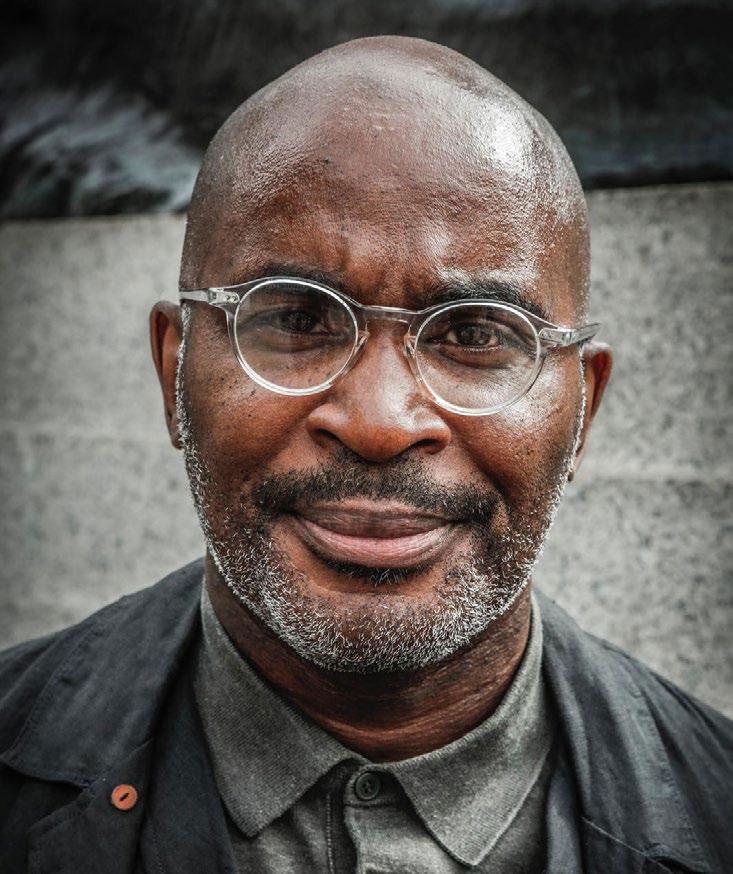
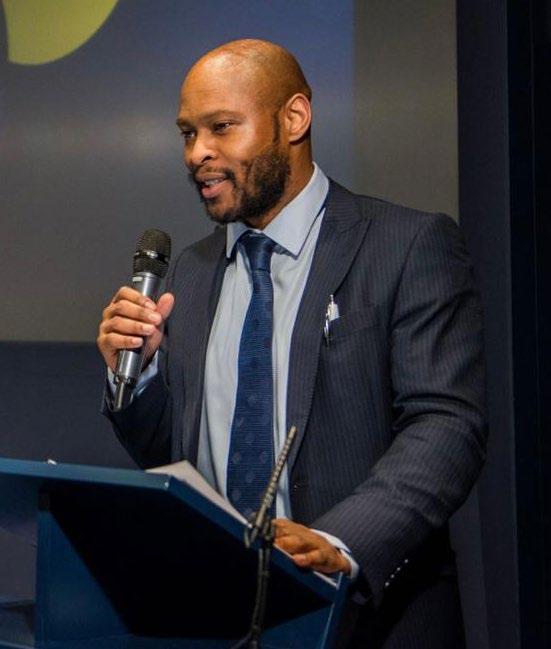
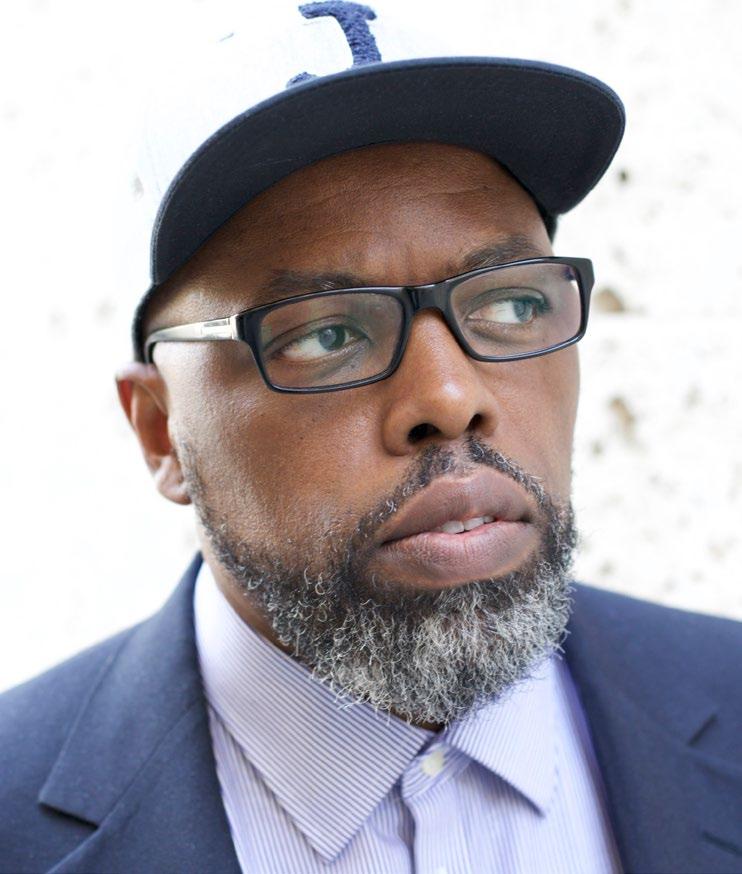 SEGUN AKINWOLEOLA
PASTOR MATTHEW ASHIMOLOWO
DR ROBERT BECKFORD
SEGUN AKINWOLEOLA
PASTOR MATTHEW ASHIMOLOWO
DR ROBERT BECKFORD
EFREM BUCKLE 14 Find us on X and Facebook: @KeepTheFaithmag
SHANE BOWES
SHANE BOWES
CEO, Pentecostal Credit Union
Shane Bowes has been CEO of the Pentecostal Credit Union (PCU) since 2016. Founded by the late Rev Carmel Jones in 1980, the PCU is now regarded financially as one of the strongest credit unions in the UK, and provides a range of financial services including loans. Many church leaders have used PCU’s loan services to help them buy their church buildings. The PCU has grown in wealth and profile since Shane has been at the helm, and is now worth over £13million. The PCU is focused on increasing membership amongst young people, as well as supporting and encouraging the economic development and empowerment of the Black community and has specific initiatives for its membership in this regard.
Visit www.pcuuk.com
EFREM BUCKLE
Deputy CEO and Director of Training and Mentoring, London City Mission
Efrem Buckle serves as London City Mission’s Deputy CEO and Director of Training and Mentoring, and draws deeply on his 30-year experience working in urban gospel ministry on four continents. London City Mission (LCM) is a leading Christian charity that works alongside local churches in London to share the Gospel and equip believers to share a message of hope to those least likely to hear it. Efrem has worked at LCM for 10 years and started as a part-time training manager. For the past 20 years, he has served as church-planting pastor of ecclesia, the church he co-founded, based in Lewisham, south London. He still serves the church along with his wife of over 30 years. Efrem has studied at Oak Hill College; completed the Urban Ministry Program; and is the proprietor of Urban Mission School, the church-run, government-registered independent school he established in 2016.
Visit www.lcm.org.uk
BISHOP JOHN FRANCIS
Founder, Ruach City Church
For over four decades, Bishop John Francis has been a person of influence and impact within Britain’s Black Christian community. He came to wider public attention in the 1980s as director of the Inspirational Choir, who signed a record deal with CBS. Bishop Francis was an in-demand preacher before he started Ruach City Church (RCC) in Brixton in 1992. The church was renowned for being a church that grew quickly, attracting people of all backgrounds. RCC now has four branches. The Brixton branch is gearing up to move to a new venue in Streatham and the church has partnered with a housing association to build affordable housing in south London. Bishop Francis is regularly called on to be part of
initiatives that call for engagement between the Church, its institutions and wider society.
Visit www.ruachcitychurch.org.uk
SHABAZZ GRAHAM
Creator of Qcast
Shabazz Graham is the creator, co-founder and CEO of Qcast, a virtual interview app and enterprise solution tool. The app encourages people to ask questions to elicit answers that will benefit other people on the app, and has been used at events hosted by churches, charities and businesses to facilitate discussion and connection. Qcast aims to encourage people to ask good questions in an environment where answers are solution-focused, particularly on subjects of major concerns to society. Such is its ingenuity, Shabazz has been approached by major corporations interested in purchasing it. Shabazz has had a long career in media. He has made documentaries for charities and corporates, and has worked for many leading organisations, including MTV, Channel 4, BBC, Channel 5, and advertising agencies. He has also been a radio news reviewer and guest commentator on multiple podcasts, speaking as a social advocate on controversial, topical questions.
Visit www.qcast.io
BISHOP CLAION GRANDISON
National Administrative Bishop, New Testament Church of God UK
Bishop Grandison presides over New Testament Church of God (NTCG) – a historic Pentecostal church denomination with 130 churches, 350 ministers and 11,000 members. He also oversees the denomination’s 82 cross-cultural churches. Bishop Grandison was appointed to the role in 2022, and over the last 18 months, NTCG has experienced a new energy as it implements Bishop Claion’s vision that they be a relevant, relational church that’s active in the community, and sharing the Gospel. Members are currently gearing up for their 2024 National Convention, which take place from 23-25 August at the International Conference Centre in Wales. Bishop Grandison is a graduate of Spurgeon’s College, where he gained a degree in theology, and is a guest lecturer in Pentecostal studies. In his spare time, Bishop Claion is an avid writer of poetry and aims to publish his first book later this year.
Visit www.ntcg.org.uk
REV LES ISAAC OBE
President, Ascension Trust
Rev Les Isaac is one of Britain’s most well-known and respected church leaders. He is the founder of the Ascension Trust (AT), an organisation committed to equipping the Church to share the Gospel in the modern world. Its most
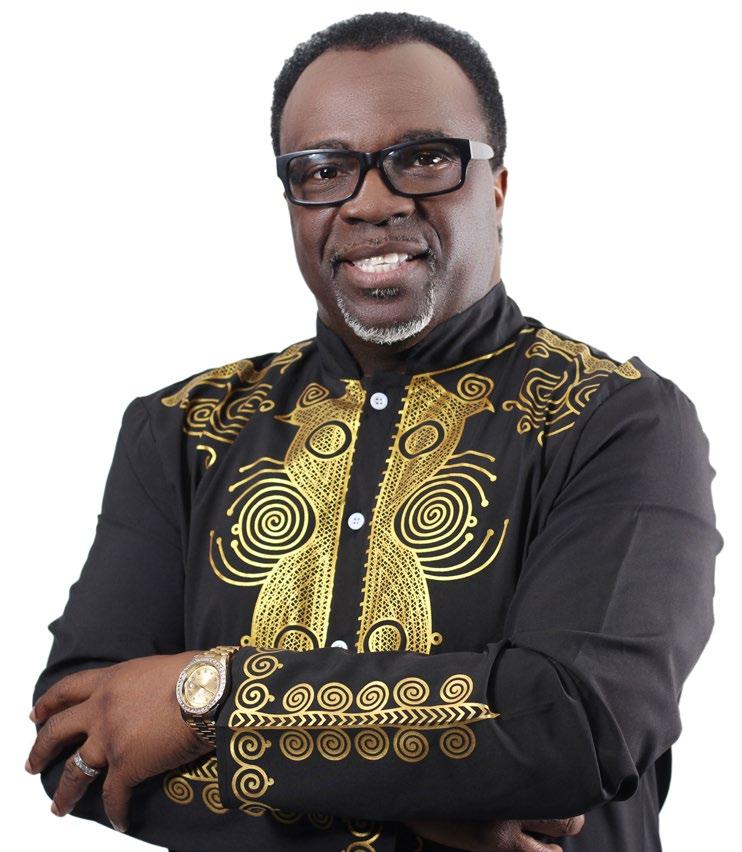
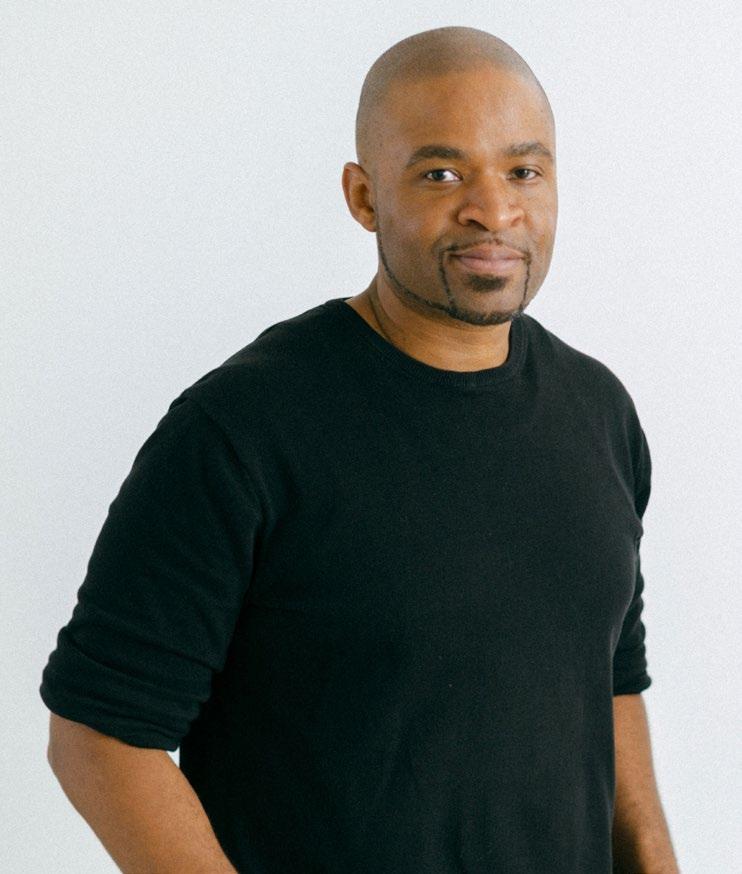
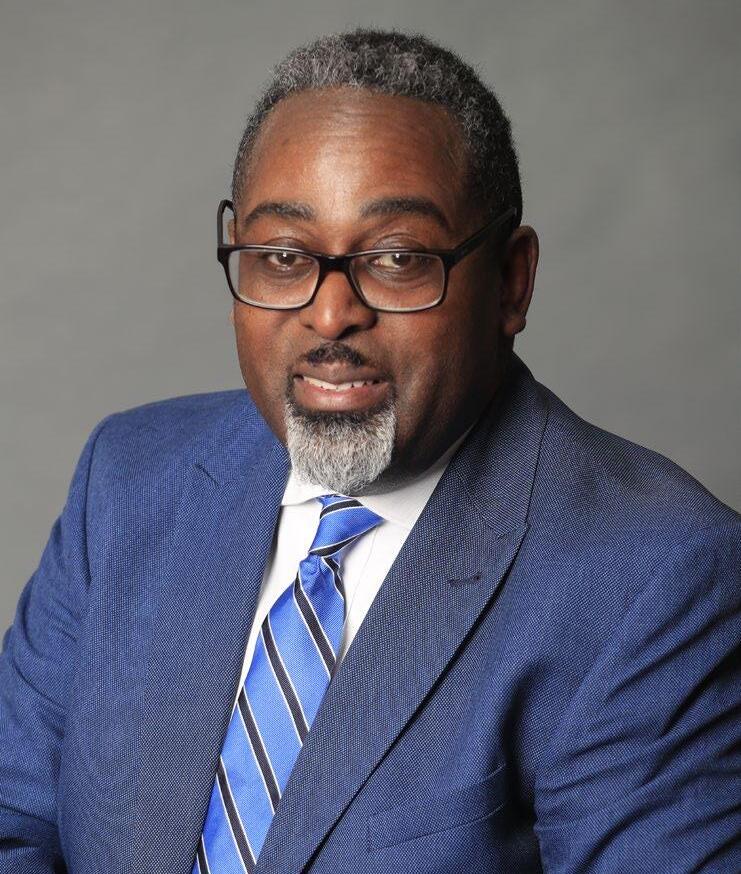
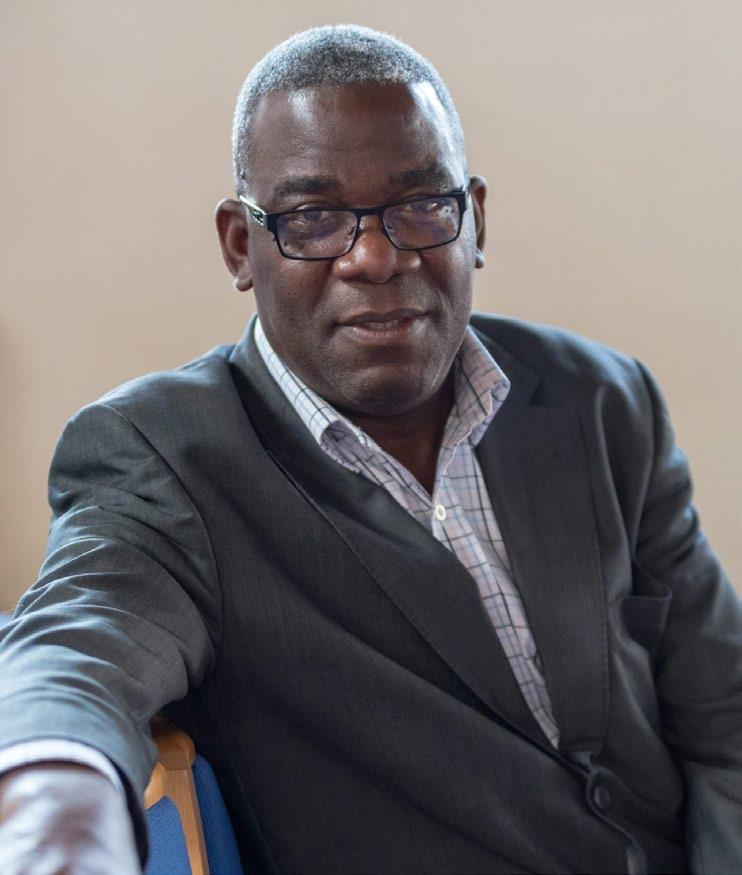 BISHOP JOHN FRANCIS
SHABAZZ GRAHAM
BISHOP JOHN FRANCIS
SHABAZZ GRAHAM
REV LES ISAAC OBE
BISHOP CLAION GRANDISON
well-known initiative is Street Pastors. Although he is no longer at the helm of AT, Rev Isaac remains very active in the church world. He is an in-demand speaker and preacher in the UK and overseas, and along with his wife, Louise, regularly hosts Enrichment Days for married couples, and pre-marriage workshops for courting and engaged couples. Rev Isaac is also a changemaker. In 2022 his sermon about integrity in public life, delivered at the annual National Parliamentary Prayer Breakfast, inspired the then Health Secretary Sajid Javid to resign, which created a domino effect. Other senior politicians in the Tory Cabinet resigned and the then Prime Minister, Boris Johnson, stepped down, making way for Rishi Sunak to become leader of the Tory Party and Britain’s first Prime Minister of Indian origin.
Visit www.ascensiontrust.org.uk
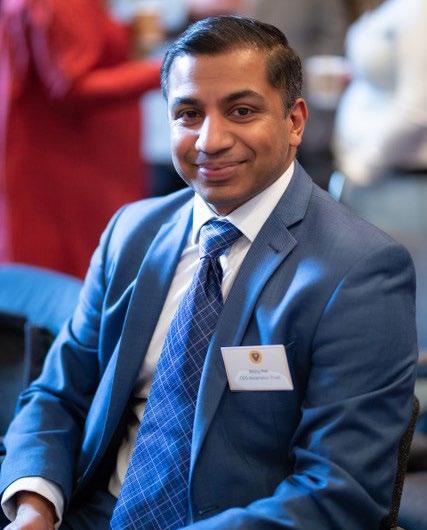
BEJOY PAL
CEO, The Ascension Trust
Bejoy Pal is CEO of the Ascension Trust (AT), an organisation that serves as the governing body for eight church-led initiatives, including Street Pastors, School and College Pastors, The Synergy Network, 60/40 Youth Mission, and Overseas Mission. Bejoy has been part of the Ascension Trust for nine years and was appointed CEO in January 2022. A Street Pastor in Croydon and a School Pastor in Lambeth, Bejoy has been involved in youth work/ministry for many years, supporting missions and projects in Moldova and countries across East and West Africa; as well as connecting with the young people and community at Christchurch Purley, which has been his spiritual home for over 20 years. He desires to see a united church, visibly present in local communities, and bringing the transformational message of Jesus’ Gospel through peace, hope, faith and love.
Visit www.ascensiontrust.org.uk
REV DAVID SHOSANYA
Founder of PAIDEIA Training & Consultancy and The Ministers Appreciation Ball
Rev David Shosanya is a much-loved and respected church leader and speaker, who has experienced in a wide range of fields. He is currently CEO of Paideia Training & Consultancy, which provides leadership training for voluntary organisations, churches and corporations. He is also founder of the popular Ministers Appreciation Ball – an annual event that brings together church leaders to socialise with their peers. Rev Shosanya is an in-demand speaker, and regularly invited to speak at churches and secular events. He is a sought-after adviser by church leaders. A former columnist with Keep The Faith magazine, Rev Shosanya is a co-founder of Street Pastors, and was formerly a regional minister for the London Baptist Association.
Visit www.paideiatrainingandconsultancy.co.uk
LIMOBLAZE
Award-winning gospel artist
Limoblaze, born Samuel Onwubiko, is an award-winning Nigerian gospel artist, based in the UK, and signed to US-based label Reach Records. He is known for the song, ‘Jireh (My Provider) Afrobeat Remix’ ft. Happi and Lecrae. The song has had over 212,000 views on Instagram Reels. The song reached number 31 on Billboard’s US Afrobeat song chart, peaked at number 41 on Billboard’s Hot Christian Songs chart, and number 15 on Billboard’s Gospel Song chart. Limoblaze has released six albums; the last one, Sunday in Lagos (2022), showcased the vibrant sounds of Nigeria’s largest city. Limoblaze won the 2024 MOBO Award for Best Gospel Act and was nominated for Dove Awards in categories for Best Rap/Hip-hop Song and Album of the Year. He was also nominated for Best Rap/Hip-Hop Song for Jireh (My Provider) at the Stellar Awards, and in 2023 was recognised as one of the TIDAL Rising Artists to Watch.
Visit www.limoblaze.com
TIM PEMBERTON
BBC Head of Religion & Ethics
Tim Pemberton is Head of Content for radio, online and social media in BBC Religion and Ethics. He oversees a team of producers and editors who make programmes for BBC Radio 4, Radio 3, Radio 2, the World Service and BBC Sounds. Titles include Thought For The Day (R4), Moral Maze (R4), Sunday (R4), and Sunday Worship. Tim is the son of the late Superintendent Desmond Pemberton, who was head of the Wesleyan Holiness Church UK for many years. He joined the BBC in 1989 as a production trainee and moved on to BBC Radio Wales, where he worked for three years as a producer before moving to BBC Network Radio and Television.
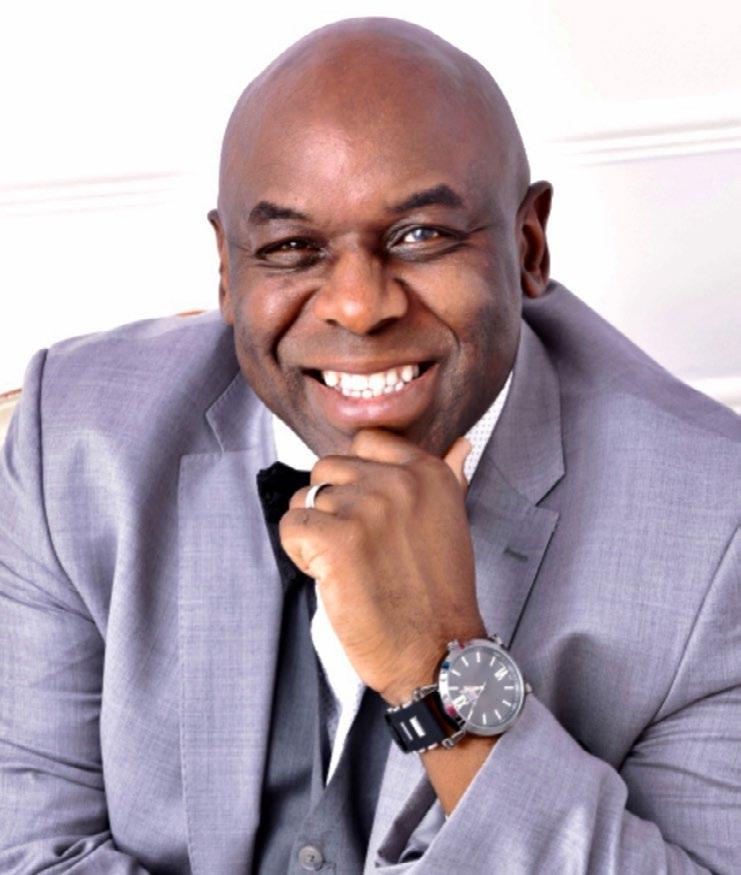

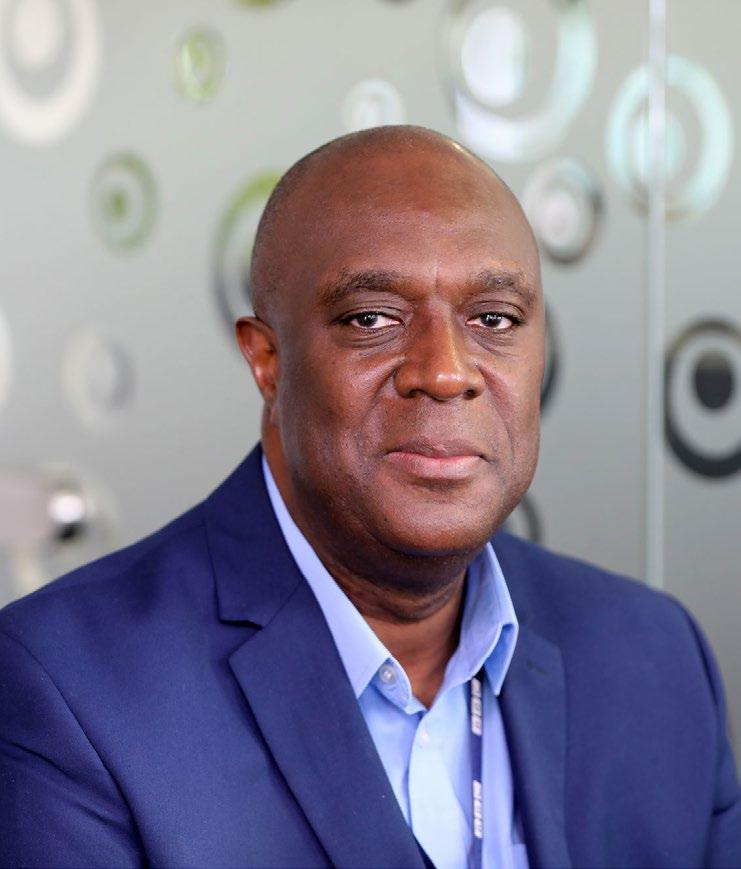

16 Find us on X and Facebook: @KeepTheFaithmag
REV DAVID SHOSANYA
LIMOBLAZE
MUYIWA OLAREWAJU OBE
TIM PEMBERTON
BEJOY PAL
He has held a number of prominent roles at the BBC, including Managing Editor of BBC Radio Gloucestershire and Executive Editor of BBC Africa, BBC World Service.
Visit www.bbc.co.uk
MUYIWA OLAREWAJU OBE
Station Director, Premier Gospel; worship leader; presenter of Turning Point International
Muyiwa is a multi-talented, award-winning worship leader and media personality. He is one of the most successful worship leaders to come out of Britain’s African churches. He has released a total of seven albums and has performed throughout the UK, Europe and Africa. Aside from being an artist, Muyiwa is also Director of Premier Gospel, Britain’s leading gospel music station and home to the Premier Gospel Awards. For the past 14 years, Muyiwa has presented Turning Point International, a faith-based programme broadcast to 70 million people across Africa and Europe. He is presently developing www.haapu.tv (a web platform) along with two other partners, which will broadcast faith-based content. In 2020 Muyiwa received an OBE for services to music.
Visit www.premiergospel.org.uk

REV DR ISRAEL OLUWOLE OLOFINJANA (PhD)
Director, One People Commission, Evangelical Alliance; author
A Baptist minister, Nigerian-born Rev Dr Israel Oluwole Olofinjana is leader of the One People Commission – an arm of the Evangelical Alliance – that celebrates diversity, promotes unity, and connects with Britain’s ethnic churches. Rev Dr Olofinjana is the founding director of the Centre for Missionaries from the Majority World; an Honorary Research Fellow at the Queen’s Foundation for Ecumenical Theological Education in Birmingham; and is a member of the Advisory Group on Race and Theology of the Society for the Study of Theology (SST). He is on the Christian Aid Working Group of Black-Majority Church
leaders, exploring the intersection of climate justice and racial justice; and a member of Tearfund’s Theology Committee. Israel lectures at Christ Theological College on themes related to World Christianity.
Visit www.eauk.org
PASTOR ADE OMOOBA MBE
Church leader, social entrepreneur, and public campaigner
Pastor Omooba has played a pivotal role in the Church for over 35 years. He is co-founder of Christian Concern and the Christian Legal Centre, organisations that defend Christians against unjust laws that seek to curtail the expression of their faith. Pastor Omooba is co-founder of the Christian Victory Group (CVG), which has helped churches in the UK and Africa establish over 100 social action projects. In recent years, Pastor Omooba has served as President of the National Church Leaders Forum (NCLF), which is a Christian voice for Britain’s Black Church community, and helped oversee the publication of its second manifesto – the Black Church Political Mobilisation: Manifesto for Action – which calls on churches to engage in social action in a wide range of areas. Pastor Omooba received an MBE for voluntary services in 2019.
Visit www.christianconcern.com and www.nclf.org.uk
BISHOP TEDROY POWELL
Leader of Church of God of Prophecy, UK
Bishop Tedroy Powell is the leader of Church of God of Prophecy that was founded in the UK in 1953. Bishop Powell was appointed to the role in 2017 and presides over more than 40 churches across the UK. Prior to that, he served as pastor of House of Bread, a COGOP branch based in New Cross, southeast London. During his time at House of Bread, he started Hillview Community Services, a community enterprise which provides educational support to its community. In 2004, he was appointed as National Overseer for Belgium and the Netherlands and established four church plants in those countries. Bishop Powell also serves as a Pentecostal and Charismatic President of Churches Together in England.
Visit www.cogop.org.uk
BISHOP MIKE ROYAL
General Secretary, Churches Together in England (CTE)
Mike Royal is General Secretary of Churches Together in England (CTE) which brings together over 50 church streams to work together in unity. Bishop Royal is the former Co-CEO of Cinnamon Network, a charity which helps churches develop and run community initiatives, and is a founding trustee and former National Director of Transforming Lives for Good (TLG), a charity
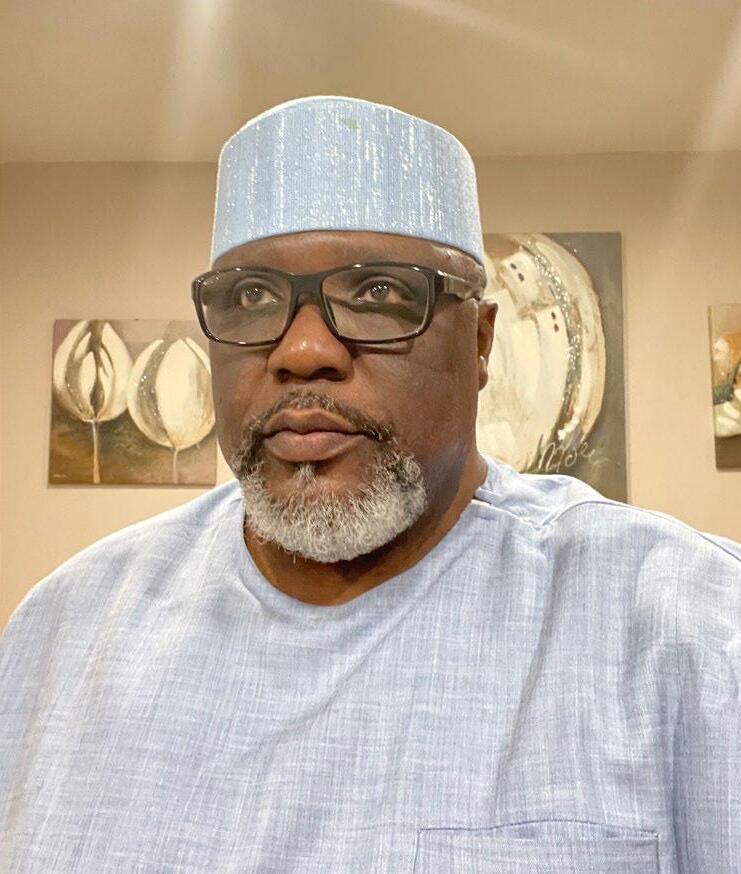
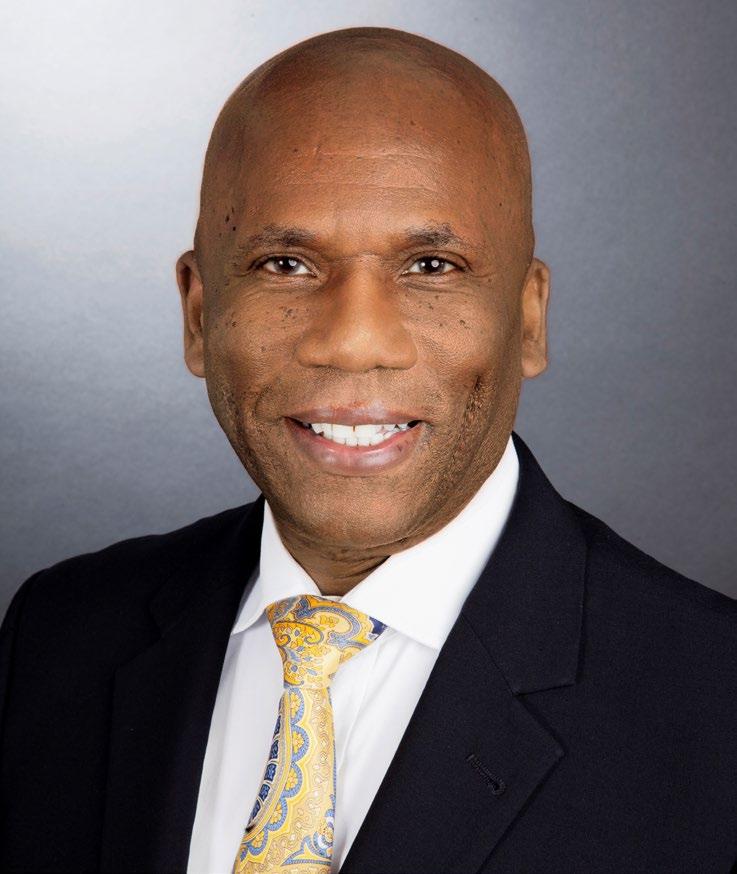
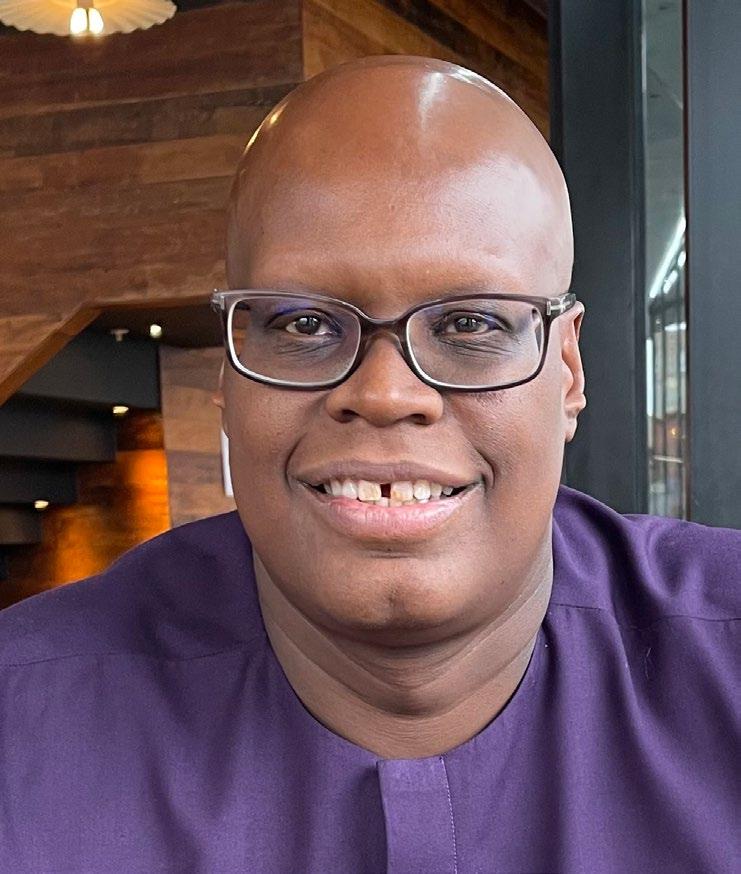
 PASTOR ADE OMOOBA MBE
BISHOP TEDROY POWELL
BISHOP MIKE ROYAL NOEL ROBINSON
REV DR ISRAEL OLUWOLE OLOFINJANA
PASTOR ADE OMOOBA MBE
BISHOP TEDROY POWELL
BISHOP MIKE ROYAL NOEL ROBINSON
REV DR ISRAEL OLUWOLE OLOFINJANA
that works with children and young people at risk of exclusion from school. Mike has an academic background in urban planning and Black theology. He also has over 14 years’ experience as a mental health chaplain with Birmingham and Solihull Mental Health Foundation Trust. Mike has been in ordained pastoral ministry since 1993 and was consecrated as a Pentecostal Bishop in 2016.
Visit www.cte.org.uk
NOEL ROBINSON
Worship leader, musician, songwriter and producer Noel Robinson is an award-winning songwriter, recording artist and pioneer of the UK gospel music and worship scene. Noel is committed to training worship leaders and musicians. For several years, he hosted The Kingdom Worship Movement (KWM) events, held in London, Birmingham, Bristol and Manchester, which comprised of workshops and live worship sessions. Aside from leading worship at ministry events throughout the UK and across the world, Noel is the main presenter on Vox Collective, a Christian music series broadcast on God TV. He is currently working on a new album, scheduled for release later this year, and will be hosting a worship retreat in July.
Visit www.noelrobinson.com
AMANI SIMPSON
CEO of Aviard Inspires, youth coach, filmmaker and campaigner
Amani Simpson is a young man committed to creating positive pathways for the next generation. He is also a filmmaker, and his debut short film AMANI has been viewed over 4 million times. As CEO of AVIARD Inspires, Amani has produced impactful youth initiatives alongside The Mayor of London, Goldman Sachs and former 2x Heavyweight champion Anthony Joshua. He’s won numerous awards including the Governor-General’s Diaspora Achievement Award for Excellence from his mother country, Jamaica, for his work supporting young people with their mental health during the COVID-19 pandemic.
Visit www.amanisimpson.com and www.aviard.co.uk
COLIN TOMLIN
Co-Founder, Pitch Black magazine
Along with his wife, Judy, Colin co-publishes Pitch Black magazine, which celebrates and challenges the UK’s Black business and professional communities to be their very best. Pitch Black magazine started after the murder of George Floyd, and the first copy was issued during Black History Month 2021. Pitch Black is committed to featuring stories about Britain’s leading business people, and people who have
graced its front cover include Lincoln ‘Len’ Dyke, Dudley Dryden and Tony Wade, founders of Dyke & Dryden; Dr Yvonne Thompson CBE; Lord Dr Michael Hastings; and Ken and Mary Okoroafor. Colin, the son of a pioneering leader of the New Testament Church of God UK, currently lives in Norfolk. He serves as a Generous Giving Adviser for the Diocese of Norwich, advising over 500 parishes to be more generous and become self-sustaining.
Visit www.pitchblack.online
PASTOR MIKE WHITE
Senior Pastor, The Tab, Lewisham
Mike White is Senior Pastor at The Tab, currently one of the fastest-growing Black Pentecostal churches in London and runs several community initiatives under its Restoration Empowerment and Community (R.E.A.C.H) initiative. Pastor Mike has a passion for ‘the local church and leadership’ and has served as a consultant to several local churches and national church organisations in the UK by providing guidance and training on Contemporary Leadership and Transitional Leadership. A highly regarded preacher and speaker, thousands watch The Tab services live on social media, and Pastor Mike is regularly invited to speak at churches and conferences throughout the UK, Europe, Asia, Africa, the USA, and the Caribbean. He has also been featured as a speaker and host on TBN UK, Premier Gospel Radio UK, and the Word Network USA. A graduate in theology, Pastor Mike serves as a guest lecturer and governor for Spurgeon’s Theological Seminary College, London.
Visit www.thetab.org.uk
SIMON WRIGHT
Managing Director, The Honey Group
Simon Wright is a founding director of Honey Legal, a national estate planning firm. From a standing start in 2010, Honey Legal today has over 74,500 clients, and the value of protection given was over £21 billion at the end of 2023. During the COVID-19 crisis, Honey Legal played a key supporting role, giving away free wills to over 3,000 NHS and front-line key workers. On average, Honey Legal clients donate over of £12 million to charities each year. He played a vital role in transforming the company into a regulated entity, and has over 22 years of experience in the financial services sector. A committed Christian, Simon is passionate about supporting his local community. In 2018, he took up running as a hobby, and within 18 months had raced in three international marathons. He has used his passion for running to raise thousands of pounds to support various child-focused and community charities, as well as helping to fund local food banks.
Visit www.honeylegal.co.uk

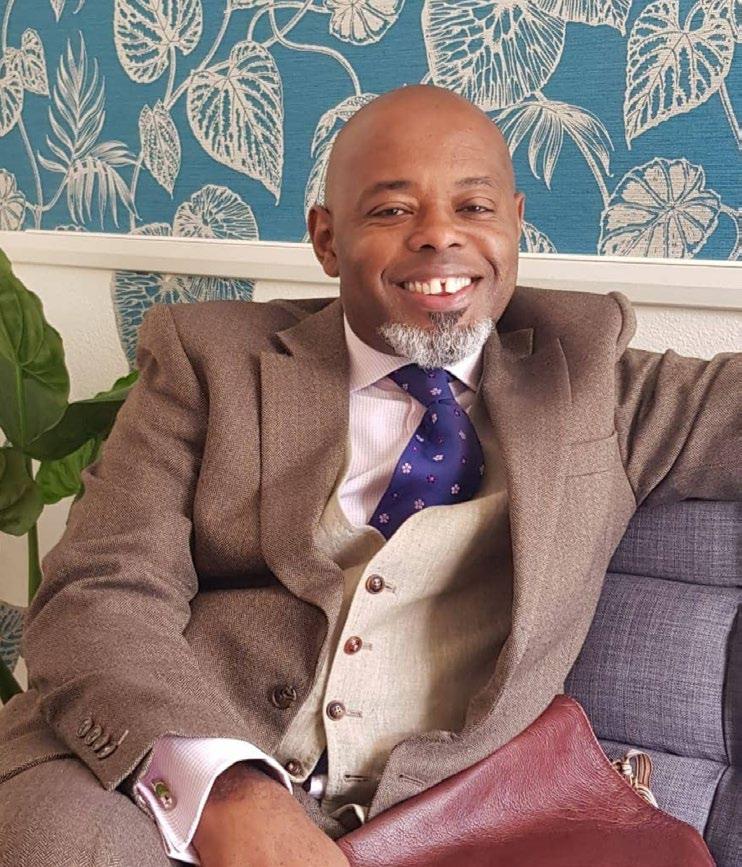


18 Find us on X and Facebook: @KeepTheFaithmag
COLIN TOMLIN
PASTOR MIKE WHITE
SIMON WRIGHT
AMANI SIMPSON

The critical role of fathers in education

Rev Stephen Brooks shares the positive impact children experience when their fathers play a role in their reading and educational development
Afather’s presence and active involvement matter greatly in predicting their children’s educational outcomes. While motherly influence is often heralded in child development discussions, the biblical perspective highlights the significance of fathers – especially in promoting literacy. Consider this: in an average year, a child lives for 8,760 hours. Of these, approximately 2,900 hours are spent sleeping, 1,200 hours in school, and a substantial 4,640 hours under the conscious care of parents.
Let’s explore the evidence that highlights the impact of fatherly engagement, particularly in supporting literacy skills.
Proverbs 22:6 implores, ‘Train up a child in the way he should go, and when he is old he will not depart from it.’ As spiritual leaders of their households, fathers exemplify this principle when they actively engage in reading with their children. Just as God guides His children, earthly fathers guide their children on the path of literacy, modelling the joy and importance of reading through their own actions.
Fathers play a critical role in their children’s literacy development from an early age. By reading aloud, sharing stories, exploring the world together, and engaging in meaningful conversations, fathers build critical thinking skills in their children. Research consistently shows that parental involvement significantly affects educational outcomes. Recent attention has turned to the unique and specific impact of fathers and male caregivers – especially on the literacy skills of their children.
The Department for Education (DfE) conducted studies that reveal compelling insights:
• Fathers who regularly engage with their three-year-olds contribute to improved academic performance by the age of five.
• Continued father involvement at age five is linked to enhanced school scores at age seven.
• Father involvement at age seven predicts higher educational attainment by age 20, benefiting both boys and girls.
• Early father involvement protects boys against criminal behaviour later in life.
• The influence of fathers extends to shaping their children’s positive attitudes towards school.
• When fathers actively participate in literacy activities, such as reading together or discussing books, they significantly influence their children’s learning outcomes.
• Children experience greater school enjoyment, improved attendance, and enhanced social and emotional development when fathers are actively involved.
Deuteronomy 6:4-7 emphasises the importance of passing down wisdom from one generation to the next: “You shall teach [these words] diligently to your children and shall talk of them when you sit in your house, and when you walk by the way, and when you lie down, and when you rise up.” Reading with fathers creates special bonding moments, and these shared experiences weave a tapestry of love and connection, strengthening the father-child relationship.
The power of words is exalted in the Gospel of John: ‘In the beginning was the Word, and the Word was with God, and the Word was God’ (John 1:1). Fathers, as stewards of language, echo this divine proclamation when they enrich and increase their children’s vocabulary. Just as God spoke creation into existence, fathers speak life into their children’s linguistic development, nurturing the seeds of communication.
The book of Galatians promotes the principle of inclusion within the family unit: ‘There is neither Jew nor Greek, there is neither slave nor free, there is neither male nor female; for you are all one in Christ Jesus’ (Galatians 3:28). Fathers, in their commitment to nurturing literacy, challenge societal norms and promote harmony within the household. By actively participating in literacy promotion, fathers exemplify the unity and mutual respect advocated in Scripture.
Let us heed the call within the Scriptures: fathers, grandfathers, uncles, and all paternal figures, embrace your divine mandate to cultivate literacy in the minds of the next generation. Your influence is irreplaceable, your guidance indispensable. And to the mothers, let us rally around our men, supporting and empowering them in their vital role as literacy champions. Together, let us shape a future where every child through the transformative power of literacy is empowered.
For support and free resources I would encourage you to visit the Institute of Wellbeing (see link below). They are working on a nationwide initiative to support parents in creating a positive home-learning environment to improve language and literacy skills in children aged 0-5 years.
Reading is a powerful tool, one that opens doors to wisdom, understanding and spiritual growth. Let us encourage our children to read widely, for in the pages of books they discover not only knowledge but also the very essence of life.
Click here to visit the website: https://theinstituteofwellbeing.com
www.keepthefaith.co.uk 19
Rev Stephen Brooks leads Mount Peniel Church, Stafford
Black King... You are everything!
Karen Allen writes about her mission to support Black kings and encourage greater communication, collaboration and compassion between Black men and women
Driving in my car, listening to ‘Superheroes’ by Stormzy, I found myself crying at the line: ‘Young Black King, you are everything and more…’ In that moment I thought about the countless Black kings who surround me, both young and old. As a mother of four young Black kings –aunty to one, godmother and advisor to many – it is a privilege to play a role in their lives. What often brings me to tears is the thought that my story could have been so very different….
The year was 2019, the month October, a Friday. I recall the day because we were preparing to do the fifth run of a community play I had written and directed, called ‘The Countdown’. My house was full of boys, nine to be exact, making a lot of noise and mess.
As I walked past the living room, mentally preparing myself for what lay ahead, my thoughts ran towards the brick wall that often left me feeling frustrated and furious. Where were the fathers of these boys? Why were they not present in their lives? Why did so many Black men think it was OK to be absent? In that moment I had an encounter that changed everything.
Within a month I started a campaign entitled ‘He’s Black, I’m Proud’. The purpose was to honour and highlight Black men who were doing incredible and inspirational things within their families, communities, churches, or in the corporate world. My mission was to challenge the norm and change the narrative of criticising and complaining about what Black men were not doing, by championing and celebrating what they were doing.
The encounter I had on October 2019 was a candid conversation with God, who convicted me to focus on my desires rather than on my disappointment. My desire was to be an advocate and an arbitrator for Black men, ignore the “fools”, and illuminate the kings.
In February 2020, exactly one month prior to the COVID-19 pandemic, I hosted the very first ‘Kings Roundtable’ event called ‘Brave, Bold, Brilliant and Black’. The event aimed to provide a space where Black kings would be safe and celebrated, and they would also be served by women
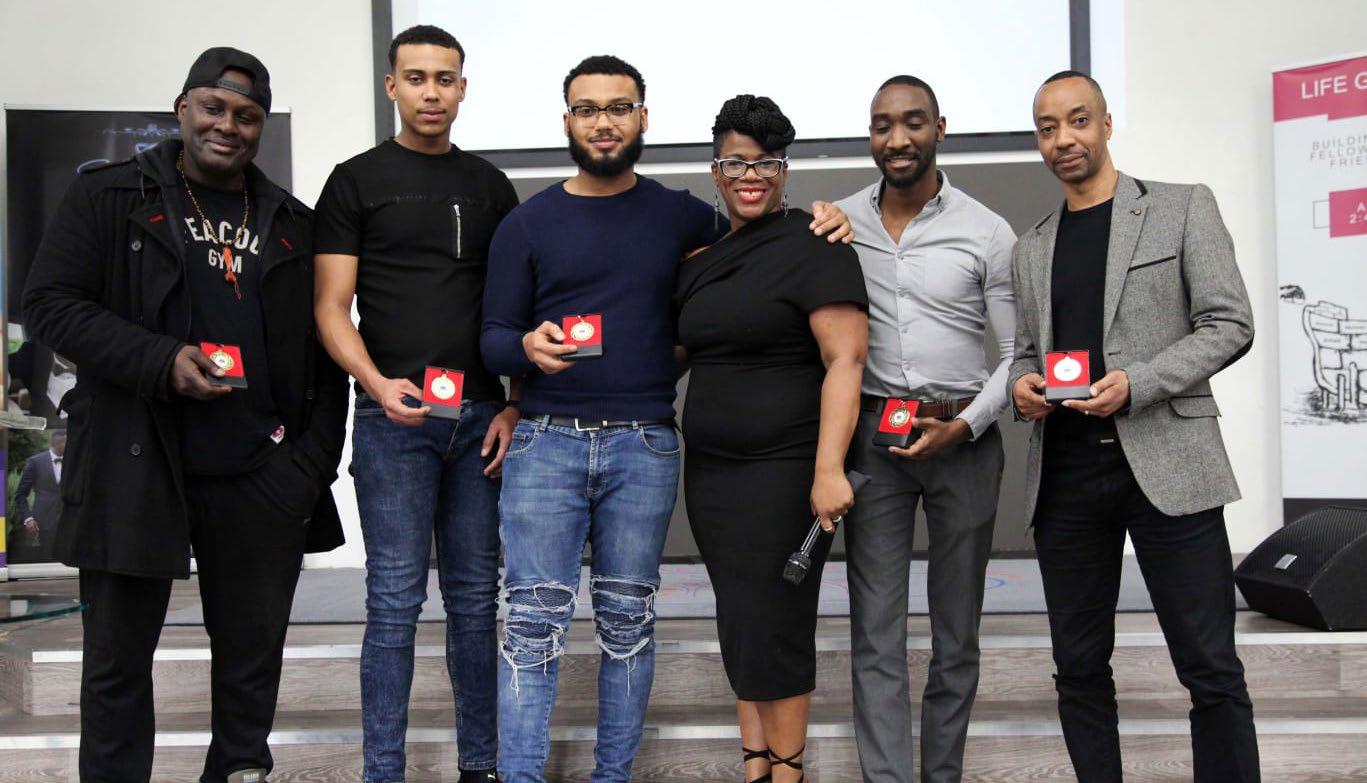
as a demonstration of counteracting the toxic culture of the Black male-female divide. There were over 100 people in attendance and it was revolutionary.
That same year, I wrote and released my third book, Thou Art the Man, a spiritual memoir aimed at empowering and encouraging men – particularly Black men – and also enlightening women about the integral part they play in healing the hearts of their men. I absolutely love Black men, and believe wholeheartedly that Black women must be intentional in their dealings with Black men if we are to experience love and harmony according to God’s divine plan. God created the woman to be a helper suitable for the man and, in fulfilling our God-given purpose, it is my conviction that, by default, our men will experience healing and wholeness.
Since that fateful day in October 2019, I have been criticised by some women about the way I “stick up for the men”. Many mistake my support for the kings as my excusing negligent or abusive behaviour. This is not the case. My mission is to lead a movement of people who share my passion to experience connection, communication, collaboration and compassion between men and women, especially within the Black community.
In January 2024, I put out a clarion call for “Abigail’s Army” – women who will join me on this mission. The goal is simple: we are women who will use our weapons of spiritual warfare to wage war against the enemy who has since the beginning of time targeted our men. Men
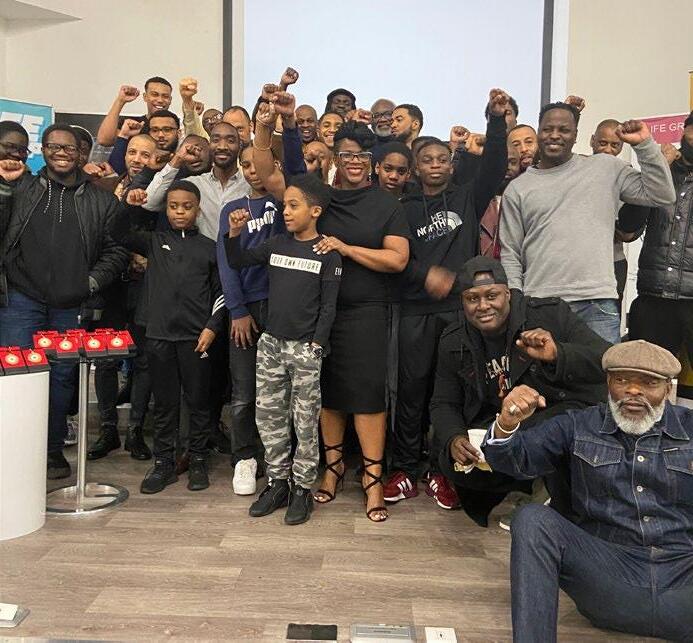
are not the enemy. Some women do not like to hear this, but we were the ones who “messed things up” in the beginning, so it is my conviction that we are the ones whom God has chosen to “fix up this mess”.
I would like to dedicate this article to one Black king within our community who we recently lost, suddenly and unexpectedly: Ray Lewis CBE, founder and pioneer of Eastside Young Leaders Academy (EYLA). He was a king in both word and deed. Writing this with deep sadness in my heart has strengthened me to continue along the path to give Black kings their flowers while they are yet alive. Black King, you are everything… and more! This is my decree and my declaration. Too many Black men have gone to their grave without hearing those words, or similar words that could have given them hope or helped them to heal. I am on a mission. Kings, you can count on me.

www.karenallen.info
Karen Allen is a minister, personal development coach, and activist who is changing the narrative for young people and Black men. Visit
20 Find us on X and Facebook: @KeepTheFaithmag

It has been said that Christianity is “the only religion with a shortage of men”. One of the sad characteristics of Christian congregations in Western Europe is the huge decline in male attendance, with most churches having a significant gender imbalance. Some surveys have shown the female/male ratio to be as high as 70:30 in churches – a stark contrast to the UK female/male population being approximately 51:49. This gender imbalance has far-reaching implications for the health and vitality of the Church.
One such consequence has been the feminisation of the Church. It is not uncommon to walk into a church and see a male pastor, yet be greeted by women; ushered by women; have your tithes and offerings collected by women; listen to announcements made by women; be led in worship by women; and given after-service refreshments by women.
This imbalance affects children, teenagers, young adults, singles looking for a spouse, families, and the ‘missio dei’ (the mission of God). The sad truth is that men who attend church regularly are a minority group, and the modern church is not doing what Jesus did, which was to reach men with the good news.
WHAT CAN CHURCHES DO TO ATTRACT AND ENGAGE MORE MEN?
Jesus showed us how to grow healthy churches: focus on men first. Jesus spent most of His time developing 12 men. He knew that if you transform men, you transform the family, the community and society.
Here are FOUR ways to make churches men-friendly:
THE PREMISES
Many churches do not realise that their buildings can either attract or repel men. Many
How to reach men with the Gospel
Across the UK, women have outnumbered men in church for years. Pastor Clement Okusi shares how churches can get more men in the pews
churches have a very feminine decor and feel to them. These spaces are often filled with soft pastel colours, pot pourri, lavenders and flowers. I remember one mature lady wanting to be a blessing to our church by bringing a dozen bunches of silk flowers to decorate our church building. When I saw them I immediately felt my masculinity start to ebb!
Organisations like Starbucks & McDonald’s put a lot of thought, effort and expense into their colour schemes in order to attract both men and women. Churches must also realise that their spaces need to be designed in a way that is gender-balanced, appealing both to men and women.
THE PRAISE
One observation of the modern church has been the feminisation of the songs we sing. Years ago, we sang battle songs about the Lord marching into battle, taking back what the enemy has stolen, and the blood of Jesus. These songs appealed to men’s masculinity, and to their sense of adventure and daring. Nowadays, however, many worship teams are dominated by female singers, which has led to worship songs that are overtly ‘feminine’ and view Jesus more as our boyfriend and lover!
Also, the pitch and cadence of the songs can repel men. Once, I was at a church that sang songs in soprano. Despite my best efforts, my baritone voice just could not sing the songs, so I stopped. Men want to sing songs whose themes and tones appeal to them. Churches need to intentionally have worship experiences that appeal to both men as well as women.
THE PREACHER
For most men, the preacher and the sermon are the most important part of a service. From the pulpit, men receive direction, instruction and revelation. Men want the preacher to tell them something that makes
them reflect about God and their life. Men want to be challenged and corrected by a person they can respect and be inspired by. Men want to hear sermons on topics they can relate to as men, such as sex, money, power, leadership, vision and accomplishments.
Even the different translations of the Bible can attract or repel men. Some churches have embraced gender-neutral translations of the Bible, instead of translations that refer to the orthodox view of God using male pronouns. Men want unambiguous and masculine portrayals of God.
THE PROGRAMMES
Any church that wishes to attract men needs to actively empower men in areas of leadership and involve them in church governance and decision-making processes.
A dedicated men’s ministry, with activities that resonate with men, such as leadership, sports, outdoor activities and working with their hands, is also much needed. These should include men’s discipleship classes, men’s breakfasts, mentorship and men’s Bible study groups, for example. Men are by nature competitive, so activities like football, table tennis, paintball shooting, and bowling will usually appeal to them. Mental health and emotional well-being are big issues in our society, so creating environments where men feel comfortable expressing their struggles are also needed.
When we redress the male/female imbalance, churches will see more men in their pews.
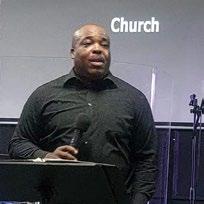
Pastor Clement Okusi is senior pastor of Eternity Church in Croydon and has seen many men saved under his ministry. Visit www.eternitychurchcroydon.com
www.keepthefaith.co.uk 21
“MUCH MORE THAN LIFE AND DEATH”
With the approach of Euro 2024, Roy Francis explores the Church’s role in establishing today’s football league and poses the question: ‘Should the Church use sport to share the Gospel?’

Football is like religion in that it inspires the kind of passion, belief and devotion that most spiritual leaders can only dream of. At this time of the year, when most leagues in England have drawn to a close, it’s the European Cup football tournament – second in prestige to the World Cup football tournament – that most of Europe, if not the world, will be watching this summer.
As far as financial rewards go, the English Premier League is top. Each year it brings in around £7.6 billion to the economy through match-day ticket sales, and broadcast rights. It supports many industries, including marketing, hospitality, conferences, as well as businesses in local authorities.
It might come as a surprise, but many of the most successful clubs in today’s English Football League owe their origins to the Church, whose work in socially deprived areas was the Christian soil the game took root in and flourished. Aston Villa, Birmingham City, Barnsley, Everton, Liverpool, Manchester City, Bolton Wanderers, Queens Park Rangers, Southampton, and Tottenham Hotspur can all trace their beginnings to churches as part of what we would today call outreach ministry.
Victorian vicars saw the potential of football as a way of diverting young people’s attention away from alcohol, delinquency, and personal conflict, and adopted it. It was their way of guiding the young people in their care towards Christian values.
The thinking behind this was a 19th century idea of ‘muscular’, ‘masculine’, or ‘manly’ Christianity. It contended that games
like football – and sports in general – was a good way to build character. Peter Lupson, who has written extensively on football and the Church, says ‘Courage – not ducking the hard challenge – fair play, unselfishness – you played for the team – and self-control’ were Christian traits churches wanted to instil in young people, similar to those typical of the public schools of Rugby, Eton, Harrow, Charterhouse, and Oxford and Cambridge universities.
An interesting story in the history of football is Barnsley FC, which was started by Rev Tiverton Preedy in 1887 at St Peter’s Church, in what was then a deprived, squalid part of the town. Barnsley St Peter’s Football Club – as it was originally called – was a way of giving young men in the area something to do, especially during the winter months (cricket occupied the summer) and as a soft way of instilling Christian virtues and leading them to Christ. The team played regularly in Barnsley until 1893, when it joined the Sheffield and District League, winning its first trophy in the same year.
In that year also, Rev Tiverton left Barnsley to take up a curacy at St Clement’s in City Road, Islington, thereafter moving to White Lion Street, another area in the borough. A keen sportsman, who knew the transformative power of sport, Tiverton established boxing and wrestling clubs as a way of ministering to the people of the area, including those who sold fruits and flowers in what was then the beginning of Chapel Market.
Number 71 White Lion Street, Islington, is
where my parents started their church in 1967. It is one of the earliest Black Pentecostal churches in London and was also the home of the Inspirational Choir. Although our church wasn’t aware then of the history of this part of the street, it’s good to know, for descendants of members of the church have gone on to make their mark in the world of sport.
Back in Barnsley, it’s intriguing to witness how the twists and turns of life unfold. While the connection between Barnsley Football Club and its roots in the local church community may not be as robust as it once was, there’s a resurgence of that bond –

22 Find us on X and Facebook: @KeepTheFaithmag
thanks to Bruce Dyer. In 1994 he became Britain’s first teenager to be signed for over £1 million when he joined Crystal Palace FC. He also played a pivotal role for Barnsley until his retirement in 2008. Notably, Bruce is the son of the late George Dyer, who almost single-handedly made reggae gospel music acceptable to the Black Church community in Britain, by staging many of the finest gospel reggae concerts, featuring artists from Jamaica and the Caribbean.
What Bruce is doing in Barnsley is following in the footsteps of Rev Tiverton, seeing sports – and in his case football – as a way of ‘winning souls’. He is the pastor of ‘Love Life Ministry’; has strong links to Barnsley Football Club; stages football tournaments, coaching sessions, outreach work; and holds church services. Each year at the Love Life Sports Ground in Grimethorpe, Barnsley, Bruce stages sporting activities and youth development initiatives, aiming to teach young people football as well as life skills and, through these, to help lead them to Christ.
When it comes to the role football plays in the Black community, it’s hard now to imagine there was once a time when hardly any Caribbeans were playing football in the English leagues, let alone watching it from the terraces. Now, 43% of all football players here in the UK are Black, and there’s virtually no English club that doesn’t include a Black player, and many of the biggest names in the game are Black.
Football has not only transformed Black players’ lives, but also the clubs they play for, and many people believe it has helped foster
good relations between the races. When once Black players had to contend with racism in their clubs – from their teammates, on the terraces, and from opposing fans – football now helps to heal, bind and unite.
With so many Black players being heroes to their fans, it’s hard to continue to abuse them if they keep scoring goals, keep defending so brilliantly, and keep skilfully orchestrating the game from midfield. It is now a proven path for Black youngsters who want to enter the game, for their heroes are in it and are doing well – unlike in the past, when negative stereotypes, racism and fear blocked their way.
How did this happen, especially when the community Black players came from had little or limited tradition of playing football? The answer lies in the pioneering ability of several Black players – children of the Windrush Generation – who blazed the trail for transformation of the English Football League and, to a large extent, British society. In this sense, Laurie Cunningham, Cyrille Regis, Brendon Batson, Garth Crooks and Viv Anderson (and others) occupy pantheon status in the game.
It’s unfortunate that our churches often overlook the immense potential for using sport as a means of building character, community service, and serving God. In today’s sports-centric society, it’s evident how many individuals, both in England and worldwide, are engrossed in events like the upcoming Euros.
Indeed, we live in a football- and sports-obsessed age. Just think how many people will be watching the Euros this summer!
Some say it is the new religion, with its quasi-religious status, commanding a level of devotion once reserved for churches and religious institutions.
About 50,000 churches exist in Britain today, and with a membership of less than 10% of the population, some would say the Church is in decline – though there are pockets of revival. The proportion of people defining themselves as Christian has fallen from about 66% in 1983 to less than 40% in 2016. Those professing no religion at all has risen from 33% to 52%.
Interestingly, in today’s society, many people are more passionate and devoted to football than to Christianity – a result, many would say, of the increasing secularisation of society. The Church unfortunately is caught in a bind; it needs to adapt, but at the same time it is trying to hold on to traditional values and revealed truths. At times it finds this difficult. Perhaps it needs the skill, leadership and vision of someone like Bill Shankly – perhaps Liverpool’s greatest manager –who, when commenting on his devotion to Liverpool, said:
“Some people believe football is a matter of life and death. I am very disappointed with that attitude. I can assure you it is much, much more important than that.”

Roy N Francis is a former BBC TV producer, founder of Roy Francis Productions, and is author of ‘Windrush and the Black Pentecostal Church in Britain’. Visit https://www.royfrancis.co.uk/

MARK DE-LISSER:
The man who hones the human voice into a thing of beauty

Mark De-Lisser is a one of the foremost vocal coach/trainers, music arrangers, and choir directors to come from Britain’s Black faith community. His musical talent was honed in the Seventh-Day Adventist Church, in which he was raised, and his gift for music has made room for him in all sorts of environments. His achievements are many.
He is director of the ACM Gospel Choir, now known as MDL Singers, which he started in 2003. He is founder of Singology, a community of over 800 singers who meet weekly in person (across nine locations in London) and virtually to sing; and his vocal coach skills have been used on a range of TV shows, including The Voice, Let it Shine, Pitch Battle, This is My Song, Ant & Dec’s Saturday Night Takeaway, and The Masked Singer. He is also part of the BBC’s Songs of Praise team of presenters.
He is musical director of The Dementia Choir, birthed out of the highly acclaimed BBC documentary. Such is his knowledge of choirs, he has authored a book entitled 100 Ways To Inspire Your Choir
Mark’s place in history is secured as the arranger for Stand By Me, the song performed by The Kingdom Choir in 2018 in front of billions at the royal wedding of Prince Harry and Meghan Markle. Mark spoke to gospel stalwart and pioneer Juliet Fletcher about his life, music, and the achievement that makes him most proud.
JULIET FLETCHER (JF): Mark, the obvious question is: how or what started you on this course of life, working in music?
MARK DE-LISSER (MDL): My father. I’m the last of four, and when I was quite young, seven or eight, he took me to a male voice choir rehearsal to give my mum a break. It was actually the Adventist Male Voice Choir (led by Osric DeCoteau), and I was fascinated. Not only by all those voices but by the person who was directing: everything he told them to do, they did it. The sound was amazing. I didn’t fully comprehend why I was so taken by it, but I knew I wanted to do that thing like that man who stood in front of them.
JF: Where do your family hail from? And are they musically talented like you?
MDL: My parents, Clinton and Dorothy De-Lisser hail from Trelawny and St Ann respectively, in Jamaica. Yes, music is in my family (Richard, Paulette and Auline) but certainly no one – especially my father – believed that a living could be made from it. A lot of anxiety poured out of them to me, for me. Having a secure job and setting myself up for future stability – as my parents had done for us all – was paramount.
JF: How did your parents’ anxiety about working in music impact your
work choices?
MDL: Well, initially I followed my parents’ good advice because I was too nervous about failing. I became an IT person and was in a very well-paid job. In my early 20s my pay was more than my parents could ever dream of, in all their struggles as migrants. My father worked in a retail supermarket and my mother was an NHS nurse. They believed I was settled on a good thing.
JF: Although you took your parents’ anxiety on board, what inspired you to make that leap into working in music?
MDL: Well, from the age of nine I had taught myself piano to quite a high level, and by 15 I was directing the youth choir in our local church, Brixton SDA. There I imbibed everything I knew about leading and caring for a choir. I realised I had a gift and, if I was going to grow and maximise its potential, I had to increase my capacity through learning. So, I took myself off to Colchester College and progressed to The Royal Central School of Speech and Drama, where I fulfilled a Master’s (MA) Degree in Voice Studies. It’s through studying that I fully understood the richness and wealth of the musicality in our churches. I acquired tools and began to hone my abilities to create resources and initiatives, so that regardless of
24 Find us on X and Facebook: @KeepTheFaithmag
culture, ethnicity or status – in the same way salvation is applied – it (singing) was accessible to everyone!
WHY GOSPEL MUSIC IS SO GREAT
JF: So, there you are with a Master’s in Voice Studies. You’re still single at this point. What do you decide to do but go full time?
MDL: Yes, I had learnt all I could from my experience in church now, but as JESUS said, we should “Go OUT” into the world. I decided to do so while I was still young. If I failed, I could go back and find a job.
JF: So, what has it been like ‘out there’, working in music? You’ve obviously survived beyond your parents’ expectations, with your wife Tracey, three children (daughter 14, and two sons aged 10 and 9), and a family home.
MDL: My research and experience have both taught and shown me the privileges we have, being brought up in the Church. Foremost, it’s a singing environment. It is one of our greatest advantages. Going to Africa I saw that within our culture, singing and music are in everything –whether it is work, rest or play. Scientific studies and health advocates are discovering the true benefits of singing and indeed music.
THE ROYAL STRUGGLE OF ‘STAND BY ME’
JF: We all know the original hit song ‘Stand By Me’, composed by African American singer/songwriter Ben E King. But you, as an arranger, have given this popular song a totally new life as a choral rendition. Can you describe to us what it was like working on it, so it could be performed at the marriage of Prince Harry and Meghan in 2018?
MDL: It was a very heartbreaking experience. I’ve never used that phrase before when describing the process, but it was heartbreaking for me.
JF: Tell us more. Please explain?
MDL: At least a year before I was asked by Karen Gibson to arrange the song, the back story to this experience is very important and speaks my spiritual reality. I remember sitting in my studio, audibly asking God to help me to write or arrange something akin to Richard Smallwood’s Total Praise. No matter where I go in the world to teach it, or where I see or hear it being performed, everyone is moved by it, regardless of race, culture or language – without exception. So, there I am, audibly asking Father God, although I don’t write songs (yet), please give me something like
‘Total Praise’ which will impact hearts and minds on hearing.
JF: Oh, gosh!
MDL: Eighteen months after that prayer, fast forward to when I was asked to arrange ‘Stand By Me’, this scenario occurred: Normally, when I submit my arrangements for a choral piece, it’s no problem. Accepted. Job done. But not in this case. After version four or five was rejected, I didn’t feel that I was any good. Karen and I always differ on the numbers, but it was at least 13 or 14 versions, back and forth. I didn’t realise that God was taking me through a process of creating something that the world would hear. I was on my face emotionally to the point of feeling I’d failed. But what God did in that process, He was stripping ‘me’ away. The first arrangement was lots of handclaps, drums, keys and horns. But what God said was “Nah, this is not about you, it’s about Me.” And each arrangement got simpler and simpler.
When I finally brought it to Karen and the Choir to rehearse, we sensed something. But it was three or four months after its performance at the wedding and the ensuing response, when I remembered that prayer request, and knew I had received an answer. I take no credit for it. It was only God. I learned so much from the experience. It changed my life. It brought me closer to my Creator.
JF: Actually, that speaks loudly to me because most people probably don’t know that the title, ‘Stand By Me’, was inspired by a spiritual, written by gospel-singercum-soul-star Sam Cooke and James ‘JW’ Woodie Alexander – a renown gospel singer-musician-producer. The song they recorded was called ‘Stand By Me, Father’.
So, there is, what I’ll call, ‘an innately godly seed’ in ‘Stand By Me’. Do you get a royalty credit from the song?
MDL: No, is the straight answer. The song belongs to the Estate of Ben E King who died in 2015. I get a very, very small credit from Printed Sheet Music of my arrangement when it’s sold. But that’s it.
JF: You have achieved a lot in your music career, working with choirs, and helping people – the unknown, as well as celebrities – hone their vocal talents. And your music has been heard across the world but, amidst all that, what is the most memorable moment in your career/ministry so far?
MDL: I have performed and made musical arrangements for royalty, including the Queen’s Jubilee, the King’s Coronation, the Royal Wedding. However, my greatest joy was in 2013 when I independently organised ‘Sing Out Sunday’, inviting choirs from around the world – 700 came and there was 1,000-capacity audience. My parents attended. My father’s face and comments blew me away! His reaction was priceless. He said: “Where did all these people on the stage come from? How do you know them? I can’t understand. I need you to get me pictures. I don’t want to forget this moment.” For me, it was my proudest moment.
Visit www.markdelisser.com and www.singology.com
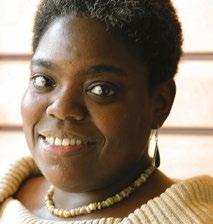
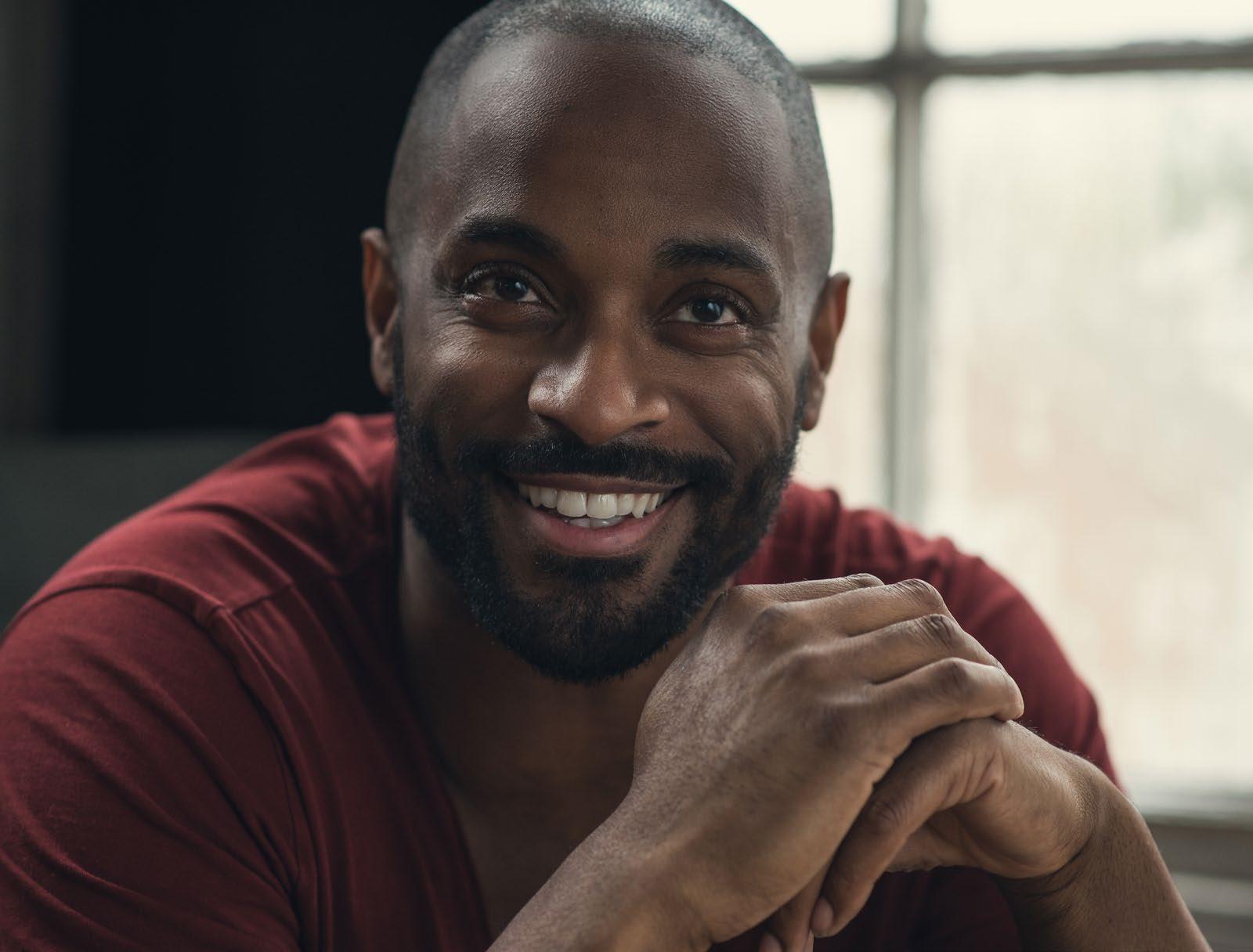
www.keepthefaith.co.uk 25
Juliet Fletcher is the Creative Director of Green Tree Productions and Windrush Church and Music. She is also the founder of the Gospel Music Industry Alliance.
Journeying back to good health
Those of us on social media learned much about the action-packed life of gospel musician, choir director, and pastor, John Fisher BEM, on the Facebook platform. He was always doing something – whether it was playing drums for artists, performing at events with his choir IDMC, serving as music director at New Testament Church of God, Brixton, or eating out often with friends and family. It was evident John was living life to the full. However, John’s life took a major turn when he had a serious stroke in 2022 and was hospitalised, followed by months of rehabilitation.
He is currently still on the road to recovery but has had the time and strength to make plans to commemorate IDMC’s forthcoming 30th anniversary celebrations.
Keep The Faith editor, Marcia Dixon MBE, spoke with John about his stroke, his journey back to health, and his choir.
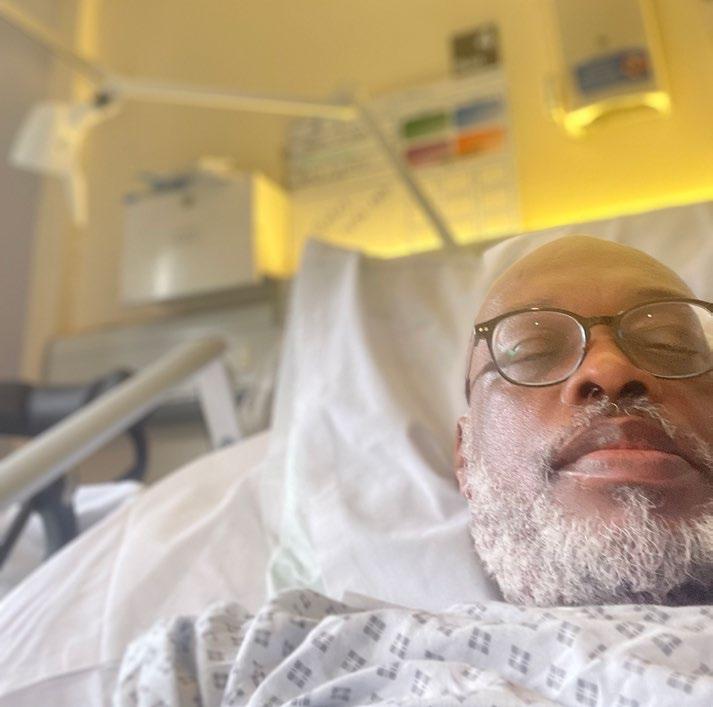
KEEP THE FAITH: What do you remember about the day your life changed, when you had the stroke?
JOHN FISHER (JF): The day of the stroke was a long one. I was busy at school, running music classes, and attended various meetings. It was a normal John Fisher-type day, to be honest. In the evening, we started IDMC choir rehearsal at the Front Rooms in Croydon, and went through a few songs which were going really well. We then started rehearsing a song called ‘Mosaic’ from the new album we were working on, and we got to some high notes which I was teaching the sopranos, singing in falsetto which I normally did. However, I found myself feeling dizzy and had to sit down to
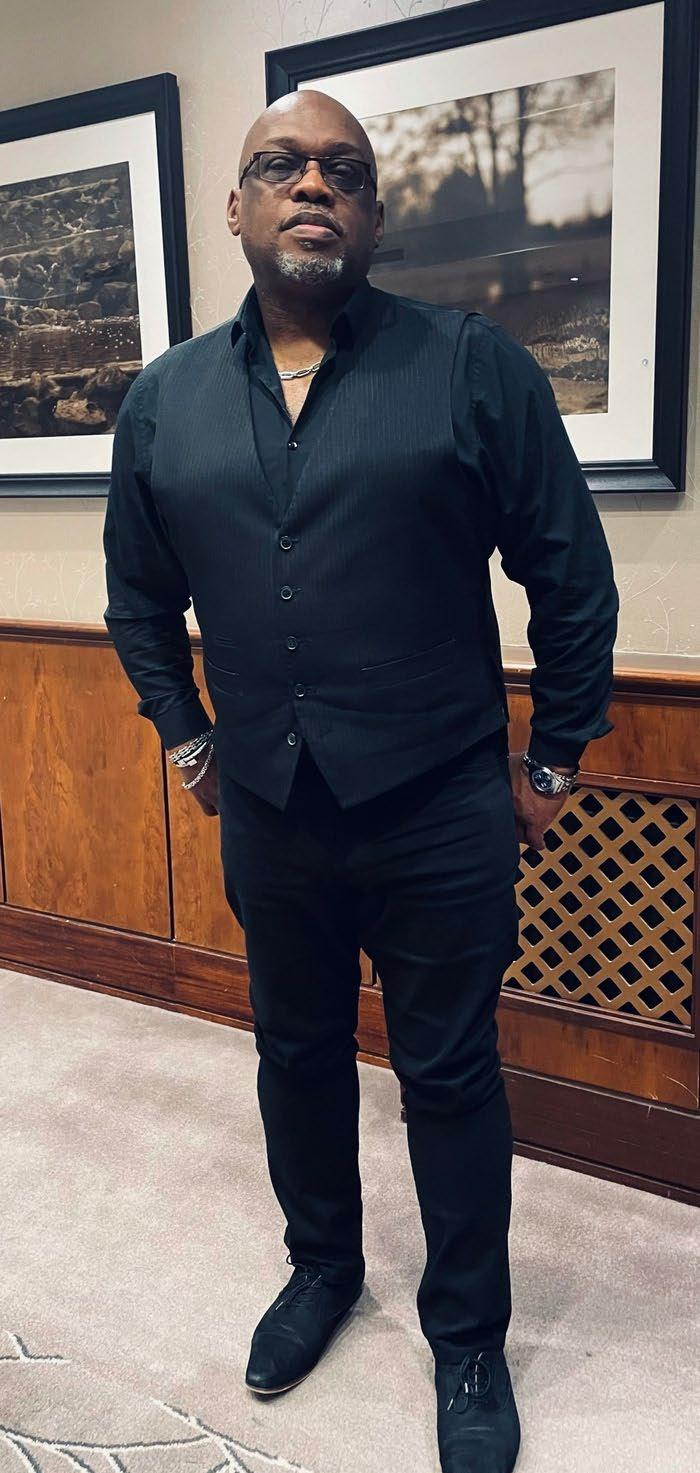
JOHN FISHER BEM
26 Find us on X and Facebook: @KeepTheFaithmag
steady myself. Feeling rested, I stood up to teach another section of the song and found myself getting dizzy again, so I sat down again. We called an ambulance and dismissed rehearsals, the choir prayed with me and waited for the ambulance with me, as they were quite concerned. I got taken to the hospital, where I was diagnosed as having had a stroke.
KTF: Do you have any idea about what caused the stroke?
JF: I understand now that my blood pressure was very high, and a cell from my brain had exploded and set off the stroke reaction. The cell poured blood on the right-hand side of my brain, causing my left-hand side to become paralysed. My speech also became a bit slurred too, but God was good because that came back straight away.
KTF: It’s been two years since you had your stroke. How are you now? (Are you still in recovery mode, still getting treatment etc.?)
JF: I’m doing well now. My physiotherapy has ended, and I’m in a gym, building back up my muscles. I’m climbing stairs every day too, and I’m going out walking.
KTF: What changes have you had to make in your life since having the stroke?
JF: I’ve had to slow my life right down. You know how I used to be, running from left to right, up and down the motorway, in and out of concerts every weekend…? It’s not like that anymore. My days are very quiet now and I haven’t even gone back to work yet.
KTF: What impact has the stroke had on your life and your family?
JF: My family have been absolutely amazing. I am the most grateful brother in London. My wife has been a total rock beside me, keeping me on a very disciplined diet, and helping me to lose weight, which has been
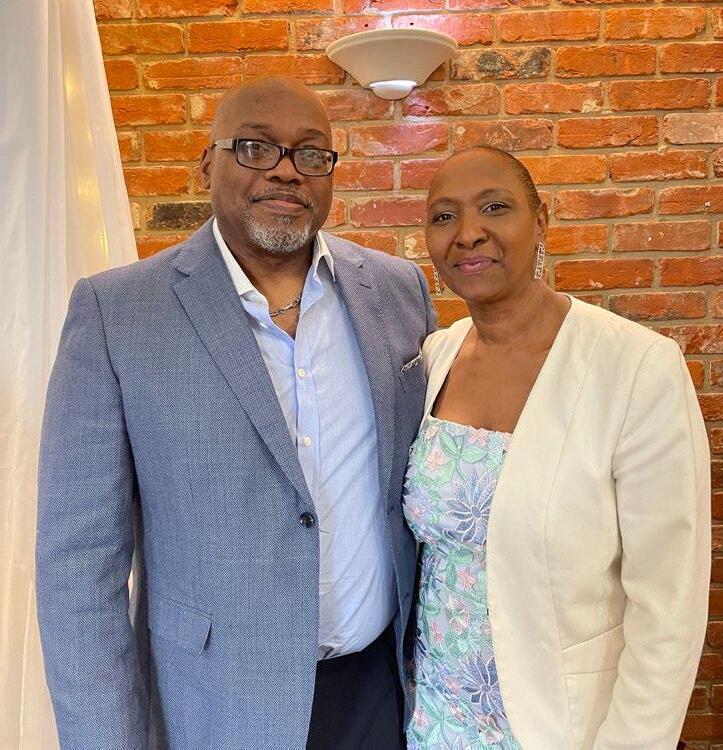
hard work. She has also been my chauffeur, taking me wherever I need to go, looking after my diary, etc. God is good.
KTF: The gospel community hosted a fundraising concert for you when they heard about your stroke. How did you feel about the support you got from the church community during that time, when you were suffering from the aftereffects of your stroke and getting treatment?
JF: It has been the prayer of the saints that God heard that have helped me to still be here. I couldn’t believe where the prayers were coming from, my name was being called in churches around the UK, the Caribbean, Africa, Asia, Europe, and the USA. The gospel community really showed up for me and gave the devil a good old fashioned smackdown. I am so grateful.
KTF: You are currently focused on celebrating the 30th anniversary of IDMC, the choir you founded in 1994. What will the choir be doing to celebrate this special anniversary?
JF: Yes, it is our 30th year of ministry, and I want to do so much, but I have be careful now because my mobility is still a bit shaky. God-willing, though, we will have a celebration
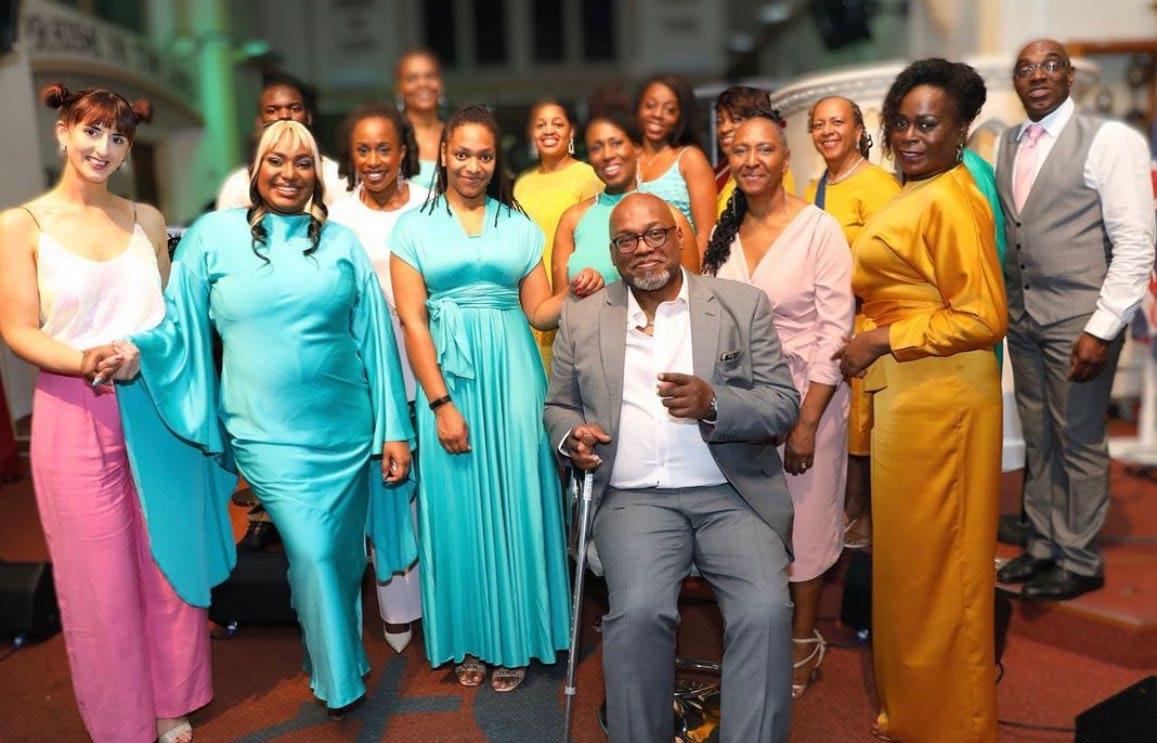
in London and a few shows around the country later in the year. A brand-new album was recorded in February 2021 up at LCGC Studios in east London. Look out for that.
KTF: What in your view have been the three most significant achievements of the choir over the years?
JF: Performing at the wedding of opera superstar Luciano Pavarroti; touring Denmark with artist Lukas Graham; and recording and releasing 12 albums, four singles and four live DVDs.
KTF: What should we expect from the choir in forthcoming years, and will you be releasing any music this year?
JF: I believe God has more for me to do, so look out for more shows with me at the front of the choir. Yes, there will be new music; I’ve still got lots to say and I hope to be at the front of the choir until God says: “Enough, John.”
KTF: You’re the child of a pastor, and a musician who has served your church denomination as well as leading gospel groups, including LCGC. How has your faith helped you cope with the aftermath of your stroke?
JF: While I was in hospital, my faith covered me and kept me strong. My conversations with God have been so rich, with Him making my life and purpose very clear. I was in hospital when Joey “Bass Man” Grant died and then André, the drummer from the UpMass Choir (led by George Anthony). I really thought my time had come to say goodbye, so that night I prayed, with tears in my eyes saying: “God, I have had an amazing life and I thank You for every opportunity You’ve given to me. Now, if it’s time for me to go, please take care of my darling wife and family.” I was ready to go, but in the morning, God said: “NO, it’s not your time yet, John. I’ve got more for you to do.” I thought, “OK then, let’s goooo!!!” And got really excited.
KTF: It’s said that our wealth is our health. What has your stroke taught you about the importance of health, and what insights do you have to share on how believers can look after and maintain good health?
JF: You’re right, our true wealth is our health. For the past two years I’ve been travelling firstly in a wheelchair, and from that to a Zimmer frame, from that to two walking sticks, and now just one stick. All I can say is that you should never give up. Set yourself goals that are achievable. Be wise with what you eat and go out and walk daily. Look after yourself, eat well, sleep well. Just be careful in all things and put God first in everything. Visit
www.keepthefaith.co.uk 27
www.idmcgospel.com
THE ROLE OF FAITH IN BUILDING A GREAT CAREER
Professor Paul Morrison has worked for some of the world’s leading tech firms and is currently UK Lead for Education at Zoom. He shares the role faith has played in his career journey
As I reflect on my exciting career journey, I am struck by the profound impact my faith has had on shaping the path I have taken. From the humble beginnings of my professional life to the heights of recognition and accolades, I have worked for some of the most renowned and largest technology companies in the world. Truth be told, my faith has been the guiding light that has propelled me forward, instilling in me the values of perseverance, integrity, and much more. In this article, I will delve into four key principles that have shaped my career trajectory.
PRINCIPLE ONE:
Authenticity of My Faith
I had never been one to overtly evangelise my faith in the workplace, but I’ve always aimed to live out its principles through my actions and deeds. I recall early in my career working for Cisco Systems as an account manager. This job was a great learning platform for me. I recall being asked to do a presentation to some of my peers. I remember it vividly, as it was the worst presentation I ever gave in my professional career. I had dry lips, forgot words and basically presented to the floor because I knew it was going disastrously bad.
After the presentation, a good friend of mine asked me: “Paul, do you go to church?”
I said yes, expecting a sarcastic comment to follow. “Do you speak or preach at church?” I responded yes. Then he asked: “Then why don’t you prepare and deliver your presentation in the same way you prepare a sermon?” That’s when the penny dropped. I had always tried
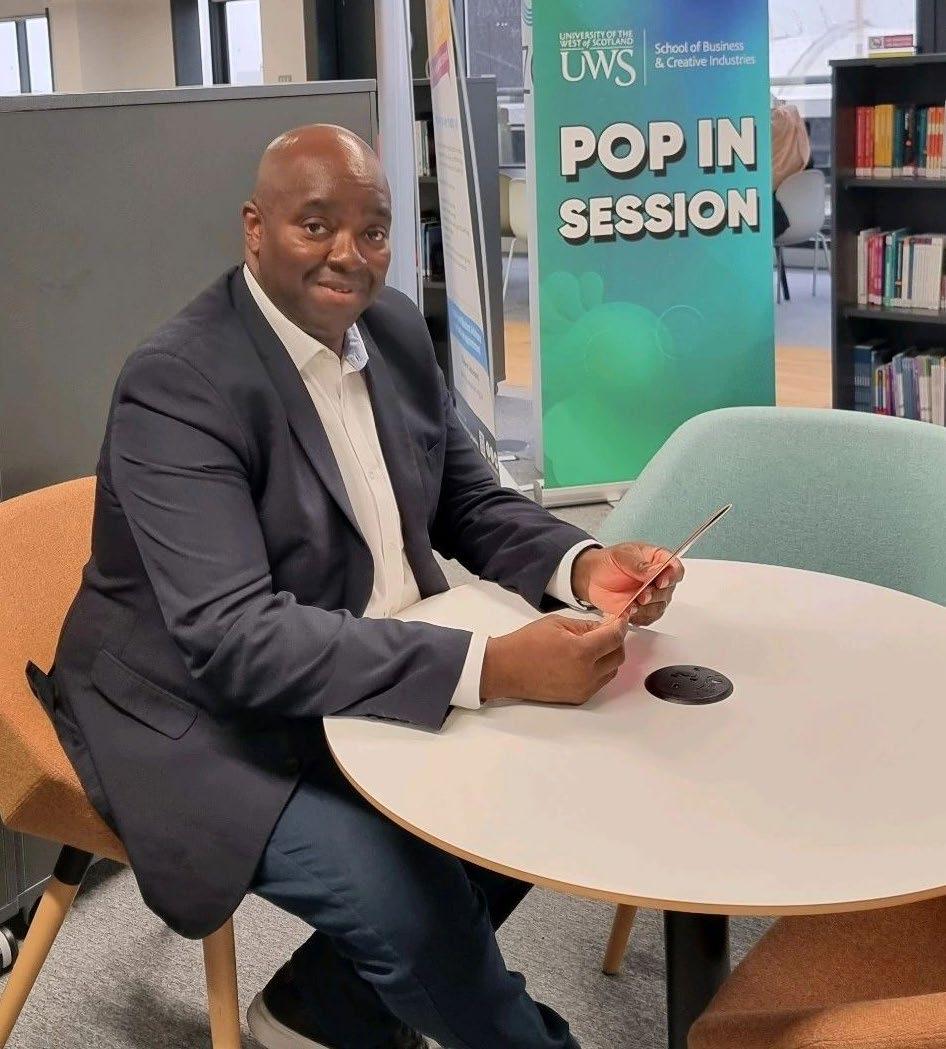
to keep my faith separate from my work, but in fact, my faith and the skills I had picked up in the church were strengths I should have included in my career – not just reserve them for Sundays in a church setting!
My faith needed to be genuine and rooted in my identity, guiding my decisions, actions and interactions in my career. This authenticity means my faith is not separate from my career but rather intertwined with it, influencing my values, goals and approach to work. In essence, I began to see my faith not only as a personal belief but also as a significant aspect of my professional identity and conduct.
PRINCIPLE TWO: Servant Leadership
‘And Jesus called them to him and said to them, “You know that those who are considered rulers of the Gentiles lord it over them, and their great ones exercise authority over them. But it shall not be so among you. But whoever would be great among you must be your servant, and whoever would be first among you must be slave of all. For even the Son of Man came not to be served but to serve, and to give his life as a ransom for many”’ Mark 10:42-45 (ESV).
Drawing inspiration from this biblical text, I have been committed to creating an environment where everyone around me feels valued, respected, and empowered to reach their full potential. This means fostering a culture of trust, openness and collaboration, where every voice is heard, and every contribution is recognised.
After leaving Cisco, following a four-anda-half-year tenure, I made the transition to 3Com, which was later acquired by Hewlett Packard. Subsequently, this entity split into two, with one becoming Hewlett Packard Enterprise (HPE). I continued my focus on the retail sector but soon transitioned to a leadership role in the education sector. I also took on the role of the UK Black Employee Network lead and the Black Employee Leadership Council Regional Coordinator for Europe, the Middle East, and Africa (EMEA). In these roles, I spearheaded numerous initiatives to support education, corporate inclusion, diversity, and engagement strategies.
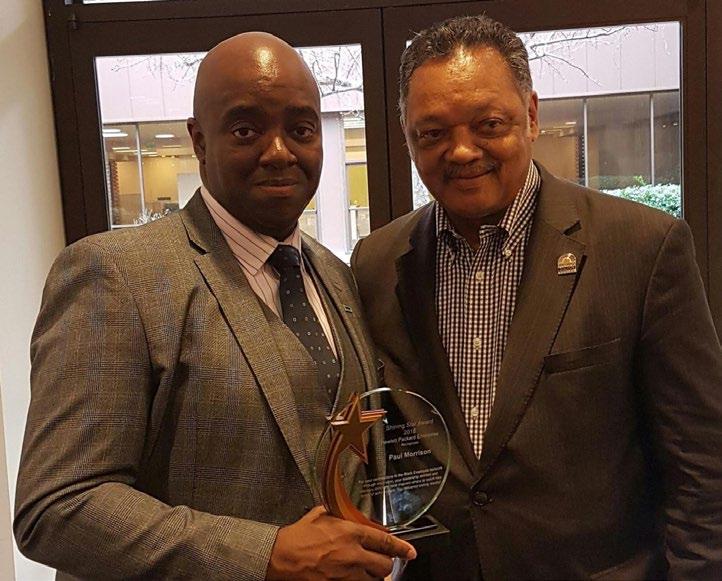
My servant leadership approach earned me the prestigious Shining Star Global Recognition award, presented to me by Reverend Jesse Jackson, the American civil rights activist, in San Francisco. I also founded the company, Idare2inspire, a programme aimed at transforming the lives of thousands of young people through various activities and mentorship.
28 Find us on X and Facebook: @KeepTheFaithmag
Many of the leadership skills I’ve developed stem from my faith and active participation in church. These experiences have equipped me with valuable business and leadership skills. They’ve also motivated me to provide leadership and transformational coaching to others. My journey embodies the ethos of servant leadership, where selfless service and humility drive meaningful impact and personal growth
PRINCIPLE THREE:
Write the Vision, Make It Plain
‘Then the Lord answered me and said: “Write the vision and make it plain on tablets, that he may run who reads it”’ Habakkuk 2:2 (NKJV).
Vision writing has become increasingly popular in recent years, with individuals in various fields engaging in this practice. Entrepreneurs craft vision statements for their businesses; pastors develop vision plans for their ministries; educators utilise vision boards in their classrooms’ and the list goes on. Typically undertaken at the start of a new year, this process involves outlining short- and long-term goals for one’s life.
After spending over nine years at Hewlett Packard Enterprise, I went through my own process of reflection. ‘Writing the vision and making it plain’ became a cherished principle, underscoring the significance of clarity, focus, and effective communication in achieving goals. Subsequently, Microsoft recruited me as their UK Industry Solutions Executive for Education, tasked with leading engagements between Microsoft and key stakeholders in education, such as Education Scotland and the Welsh Department for Education. This role enabled me to unlock strategic ideas and initiatives for the education sector. I firmly believe God operates with a strategy, and my personal experiences reaffirm this belief. In fact, I have created a roadmap for success that has allowed me to effectively navigate the journey ahead.
PRINCIPLE FOUR: Having a Passion
‘Whatever you do, work at it with all your heart, as working for the Lord, not for human masters.’ Colossians 3:23-24 (NIV),
Driven by this principle, I was deeply thankful when, in September 2020, during the COVID-19 pandemic, I had the incredible opportunity to join Zoom, where approximately 70% of UK education began to use Zoom for teaching and learning. Working for Zoom in a pandemic was unlike anything I had ever experienced. The urgent challenge and requests for previously face-to-face lessons to
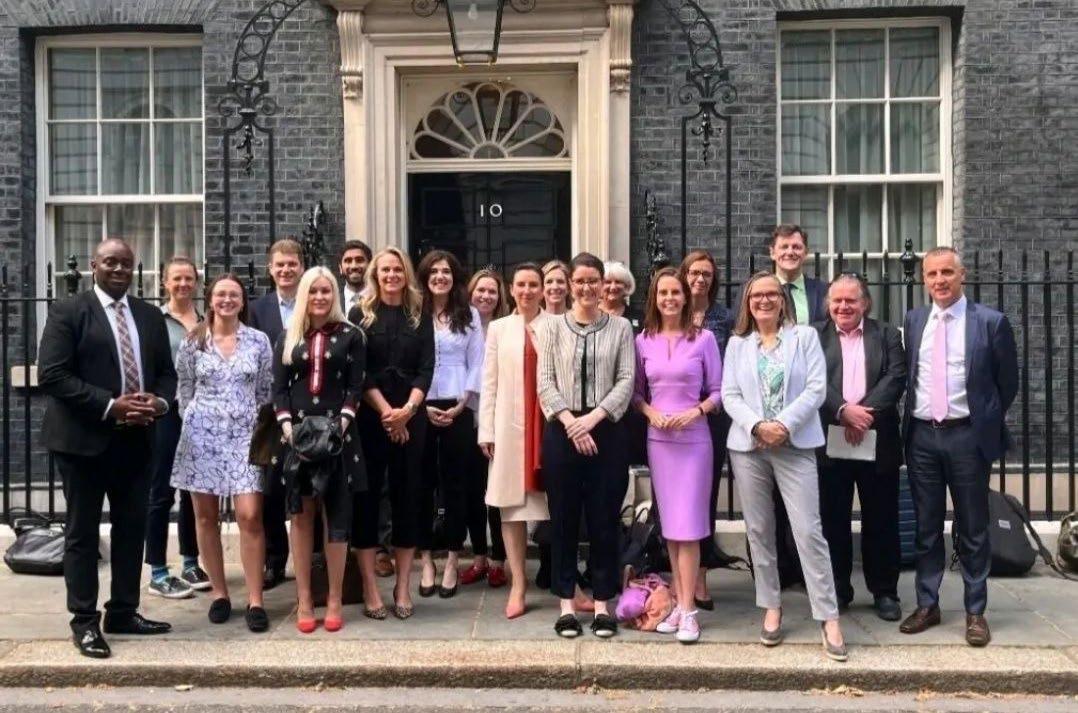
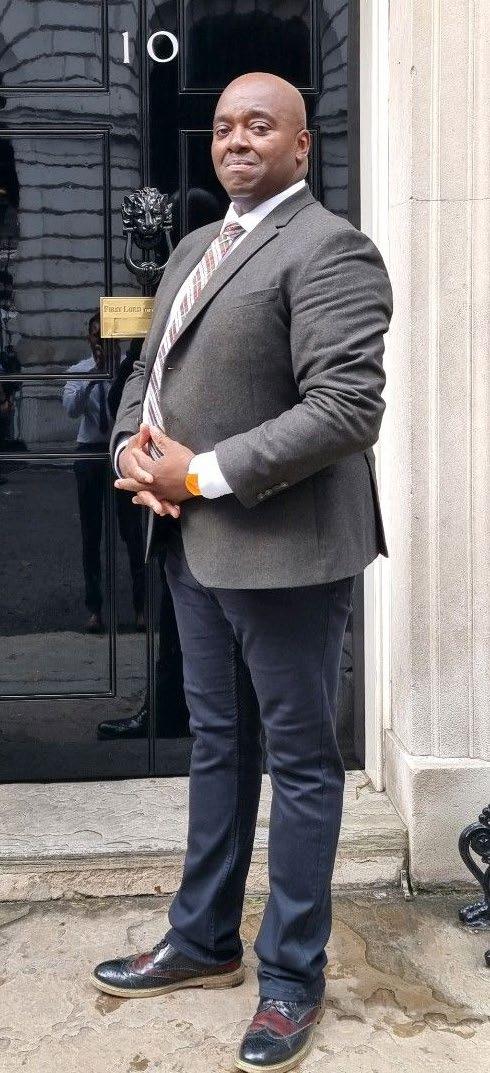
be taught online could not be underestimated, and I am super proud to say that we responded to the crisis with incredible results.
I was even asked to contribute to a book entitled Letters From Lockdown. Introduced by newsreader, presenter, and Barnardo’s president Natasha Kaplinsky, Letters From Lockdown features over a hundred letters from celebrity names, COVID heroes, and a diverse range of members of the public, all answering the question: ‘What was lockdown like for you?’ Other contributors included HM
Queen Camilla (formerly The Duchess of Cornwall), former Prime Minister Boris Johnson, actress Helen Mirren, and athlete Sir Mo Farah.
Additionally, I attended an event at Althorp, the former home of the late Princess Diana. Later, I received an email from a special advisor to the Prime Minister, inviting me to 10 Downing Street, where I was asked to work with other high-profile business leaders to drive positive change, focusing on mental health, well-being enhancement, and the de-stigmatisation of mental illness.
Furthermore, I was recognised as an Honorary Professor at the University of the West of Scotland, marking me as one of the few Black professors in the UK.
There are many more examples where my passion has served as a driving force, propelling me toward excellence and fulfilment. It is the fuel that ignites my ambition and sustains me through challenges and triumphs alike.
CONCLUSION:
In every career journey, challenges and struggles are bound to arise, leading to moments of stress and uncertainty. During these times, it may seem tempting to prioritise career goals over spiritual growth. However, I have found that true success comes from integrating faith into every aspect of life –including the workplace. Ultimately, integrating faith into our careers not only leads to personal growth and satisfaction but also enables us to make a positive impact on others and contribute to the greater good. So, as you navigate your career journey, remember to include your faith, for it is the cornerstone of true success and fulfilment.
You can follow Paul Morrison at www. linkedin.com/in/paul-morrison-education/
www.keepthefaith.co.uk 29
They came, they lived, they left a legacy
Shirley Anstis explores the life, values and legacy of the Windrush Generation – Caribbean people who migrated to Britain from 1948 to 1971
The Windrush Generation of Caribbean-born British citizens experienced a very different life when they moved to the UK. Whilst they needed to adjust their expectations around housing, weather, food and hospitality, there were other intangibles they could rely on.
They were courageous when they answered the call by the British government to work in the country’s labour-starved industries; they were hopeful of a better life. In the decades since, they have had time to reflect on the values that supported them, and we have taken time to look at their legacy and values, which they have passed on to their children and grandchildren.
The Windrush Generation arrived in the UK, curious and flexible. They were open and ready to take in new knowledge and skills in various industries, such as nursing, construction and transport. They also wanted and encouraged their children to do well at school, so they would have a less difficult life. They were learning to navigate the job market for themselves and the education system for their children.
Some were faced with overt racism in their places of work and others faced limited opportunities to progress. Some made the decision to return to the Caribbean and others adjusted their expectations whilst creating avenues for self-expression.
These limited opportunities meant they had to be resourceful. They innovated to provide products and services to customers who were not being catered for. Whether working for themselves or for others, they were diligent and hardworking.
Many wanted to provide for their families back in the Caribbean, and so would often do more than one job. Sometimes one parent worked days and another worked nights, which often put a strain on family life.
Many Caribbean people came from islands that practised Christianity as their official religion. One area of continuity with ‘back home’ was attending church. They expected to be welcomed when visiting churches, even though a warm welcome wasn’t always forthcoming. Whenever I’ve spoken to people about their initial experience in Britain’s traditional churches, they said it provided a way for them to hold on to their faith, whilst trying to find a place to feel a sense of belonging. This rejection from ‘white churches’ would help fuel the growth of Britain’s Black Church movement.
The faith of the Windrush Generation provided something to rely on in times of difficulty. Regardless of what the world signalled, they knew they were made in God’s image and protected.
The Windrush Generation valued keeping family and community relationships alive and thriving. They would often visit each other and sometimes arrange day trips to the seaside when they were off work. This close connection helped people to find work, accommodation, and long-term partners. People looked out for each other and remained respectful of their elders.
They valued hospitality and often got together for music, food, and games such as dominoes. They would get together to celebrate life and the small progress they were making. They also came together for the big events, like births, marriages and deaths – each one involving reunions and updates. These events were very inclusive as many people would be invited. I have been told that their stylish attire and sense of occasion would often stop traffic!
Eventually many would seek to preserve their cultural heritage, leading to their impact on music, dance, food and fashion in the UK today. Out of this would come the Notting Hill
Carnival, which was started in 1959 by Claudia Jones. Sport – and especially cricket – played a part in that sense of community. Others would encourage political participation. This legacy is evident in politics, academia, the NHS, art, literature and other sectors.
So many of the Windrush Generation have spoken of making the most of what they had. No one was keeping gratitude journals back then, but they practised gratitude every day. Even now, there are people who experienced great difficulty, who are not yet ready to speak up about it. They only want to remember the good times. They appreciate the chance they had for a different life but know that nothing would have come of it without their resilience and humility. Many practised walking away from trouble or keeping quiet, so they could survive mentally and physically.
So much of this information has been learned from speaking to the survivors, those who lived long and are happy to share their stories. I’m aware that many didn’t have long lives, never got to visit or return home, and perhaps never met their grandkids. We don’t know what they would say but their part needs to be remembered, too. Maybe they didn’t keep quiet, or chose to face difficulty head on. They are also part of the Windrush story. All contributed to the fabric of the UK and helped to pave the way for subsequent groups of people building a life here.

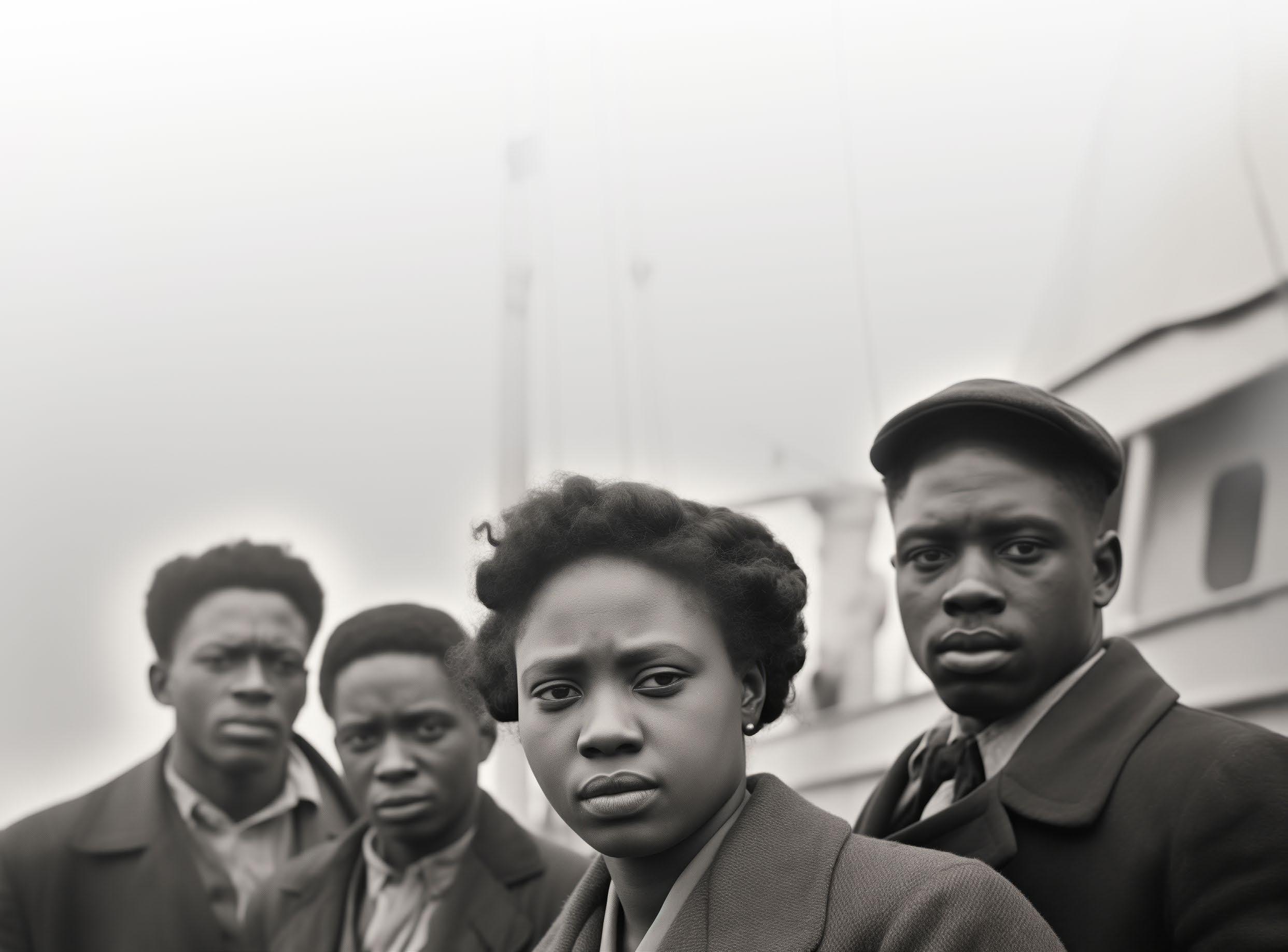
30 Find us on X and Facebook: @KeepTheFaithmag
Shirley Anstis is a counsellor, three-time author, life coach, and workshop facilitator. Find her books on Amazon and connect with her on LinkedIn.
Paying homage to a great people
Keep The Faith editor, Marcia Dixon MBE, shares why a recent apology by African church leaders – for harbouring negative views towards Caribbean church leadership – is a step in the right direction
Last month I attended a dinner organised by The London Project, an organisation committed to bringing together church leaders to dialogue, build relationships, and look at ways to share the Gospel with London – one of the most diverse and famous cities in the world.
If you’re wondering why I was at that meeting, it’s because, whilst I am not a church leader per se, I have been sharing gospel values from my various media platforms for several years.
It was a lovely meeting, held at a Greek restaurant in Islington, with church leaders like Rev Les Isaac, Bishop John Francis, Bishop Claion Grandison, Pastor Nims Obunge, Pastor David Daniels, and many others in attendance. Many leaders I know.
Everyone enjoyed a lovely meal, good conversation and fellowship, and I remember thinking how unusual it is for church leaders to chill out with each other, just talking and eating. They are usually so busy preaching, teaching and attending events, they forget to take time out to meet and chill with church leaders from other denominations.
I was sat next to Pastor Kofi Banful – a man I have known about for 30 years but have never had a proper conversation with. For the first time in my life, I did and was glad I could. And that’s the thing about being on the church scene, when we see people at church meetings, it’s often like ships passing in the night: we acknowledge each other, but have little time to engage in anything more meaningful.
Well… An extraordinary thing happened at this meeting. Whilst we were eating and enjoying each other’s company, Pastor Celia ApeagyeiCollins called the 50+ people to attention.
She then proceeded to publicly apologise to the Caribbean Christian community on behalf of African church leaders for the negative views and attitudes they had held towards them. Her thoughts were echoed by Pastor Agu Irukwu, Senior Pastor of Jesus House, who joined her via mobile phone (to concur with all the sentiments being shared).
To say I was shocked is an understatement.
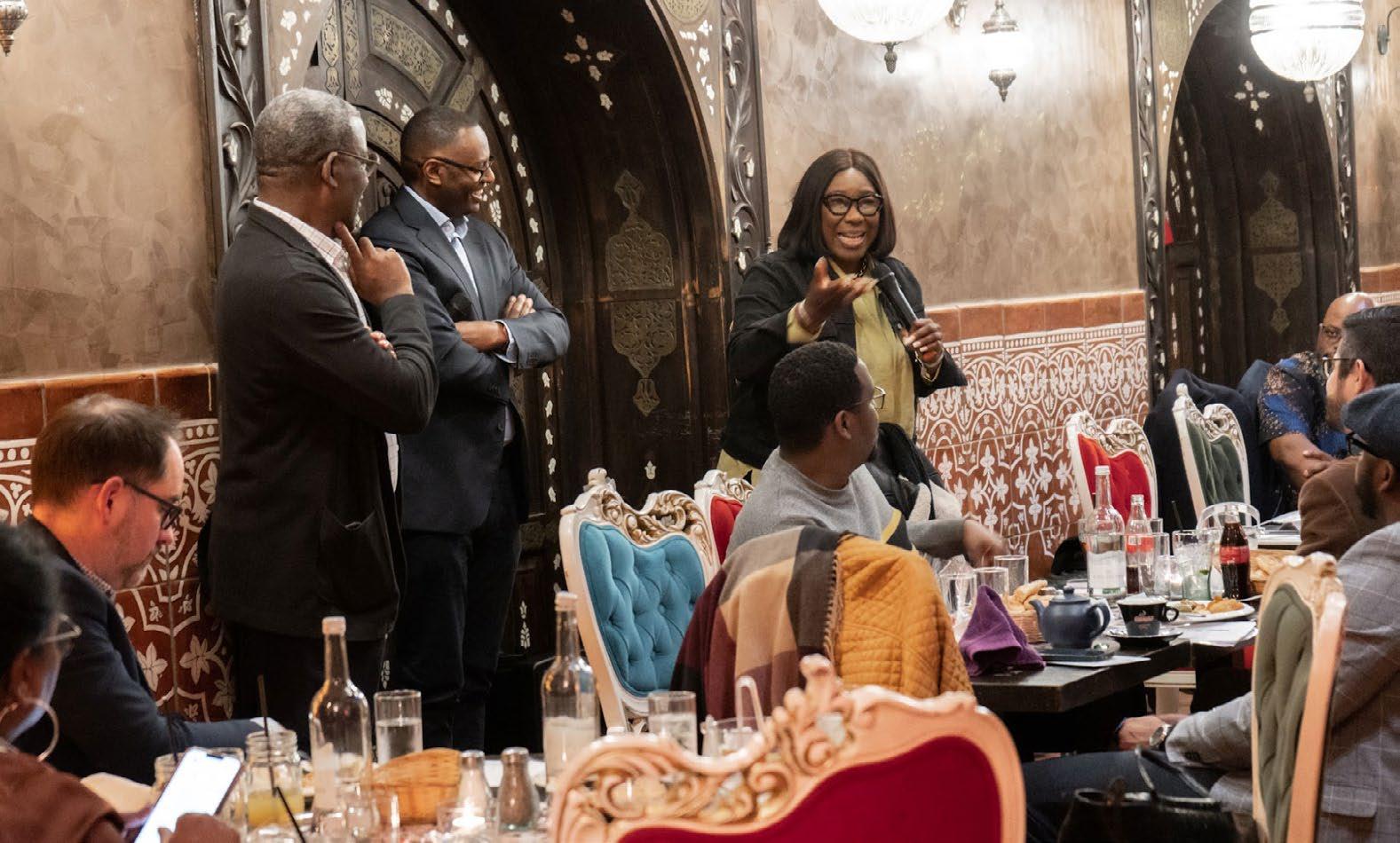
It was the first time I had ever heard anyone from the African Christian community here in Britain, publicly apologise for harbouring patronising and condescending attitudes towards the Caribbean church community – and it was good to hear.
Caribbean Christians who came to the UK between 1948–1973, otherwise known as the Windrush Generation, laid the foundation for what is known as the Black Pentecostal Church. This period saw the start of church denominations – like Church of God in Christ UK, the New Testament Church of God, the New Testament Assembly, the First Born Church of the Living God, and others – so it was good to hear African church leaders publicly acknowledge the pioneering work Caribbeans had carried out, building the Black Pentecostal Church movement here in Britain.
Caribbeans church leaders took the flak; dealt with – and overcame – the challenges of racism; and overcame the obstacles they encountered, as they sought to establish congregations; buy churches to house their congregations; and hold worship services on their own premises.
The foundations laid by church leaders of the Windrush Generation meant that when West Africans started arriving en masse in the UK from the mid 80s onwards, they had a much easier time establishing their churches. Some, like Pastor Matthew Ashimolowo, even visited Caribbean churches to get ideas and inspiration. He was a regular visitor to the New Testament Church of God in Mile End, east London, when it was led by the late Rev Dr Joel Edwards.

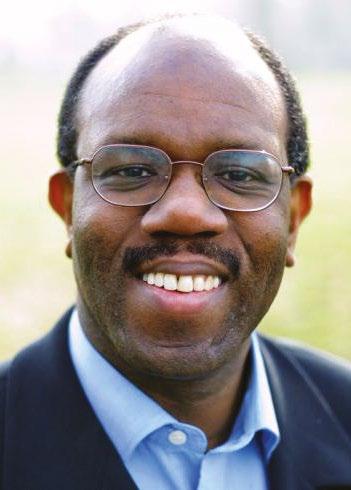
I wonder how many other African church leaders visited Caribbean churches when they arrived here during the late 80s and 90s to learn from them?
It’s important to state that African and Caribbean church leaders have worked together ever since they’ve been here in the UK, and people from these communities have attended each other’s churches. In fact, some Caribbean churches are experiencing a surge of African Millennials and Gen Z joining their congregations, and vice versa.
Let’s pray that the public apology marks a sea change in how Africans and Caribbeans view and relate to each other. We are brothers and sisters both historically and spiritually; and we are co-workers in God’s kingdom.
This public acknowledgement of the foundation laid by the Windrush Generation is long overview, but now both sets of churches need to build together and reach their communities and the wider world with the Gospel of Christ.
www.keepthefaith.co.uk 37
Visit https://thelondonproject.co.uk/
PASTOR MATTHEW ASHIMOLOWO REV DR JOEL EDWARDS
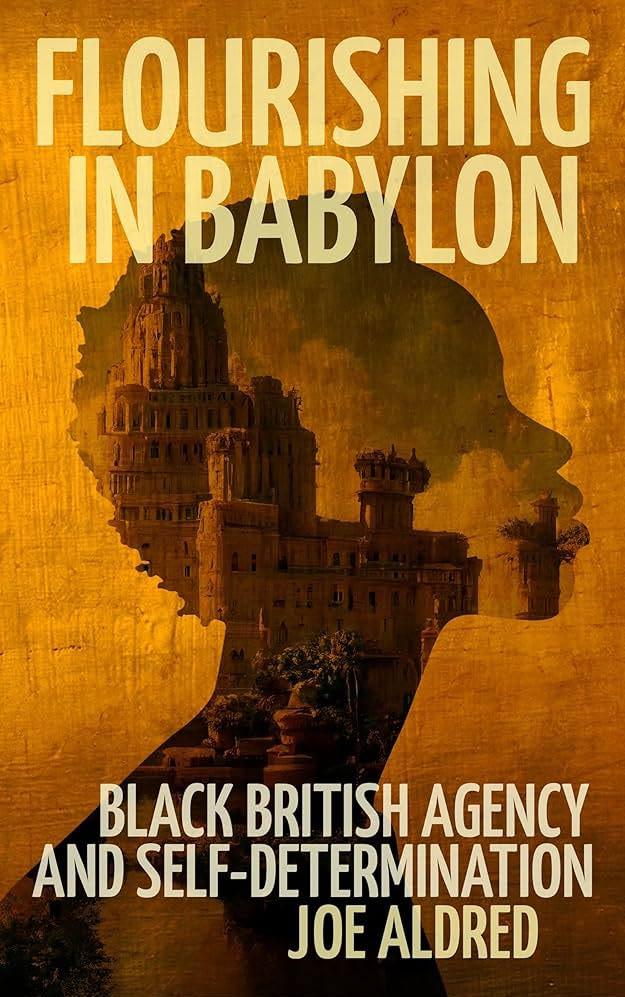
At a time when the oppressive white separatist apartheid system operated in South Africa – under which Black South Africans were legally denied their humanity, including their democratic voice – activist Steve Beko insisted: “I write what I like.” When Old Testament prophet Habakkuk was troubled about prevailing injustices in society and the apparent inactivity and silence of God, the prophet was told to “Write the vision” God had shared with him, so that a herald might take it to the people. In 2019, at the scene of the slow and painful death of African American George Floyd under the knee of a white police officer – while colleagues and a crowd looked on –one person filmed the incident which was then broadcast to the world, leading to universal protests and action against racial injustice, driven by the Black Lives Matter movement.
WINDRUSH SCANDAL
In 2018, when the Windrush Scandal broke, I became furious at what I saw as an inappropriate representation of the Windrush Generation (people from the Commonwealth – including me – who settled in the UK between 1948-1973) as a people wholly caught up in the government’s hostile environment legislation. They were unable to prove their right to UK citizenship – the right to live and work – and were consequently being denied such rights. I immediately wrote a blogpost entitled ‘Not in my name’, in which I distanced myself from the national public narrative and insisted that the overwhelming majority of the Windrush Generation were diligent and informed citizens who had kept appropriate
THE IMPORTANCE AND NECESSITY OF BLACK SELFDETERMINATION
Bishop Joe Aldred shares the scriptural inspiration behind his latest book, Flourishing in Babylon: Black British Agency and Self-Determination

documentation up to date, and had not been caught up in the hostile legislation-inspired Windrush Scandal.
I was correct about the majority; however, a small minority suffered untold pain and injustice; were denied rights; and were deported for being unable to prove their entitlement to citizenship. Appropriately, documentation and compensation schemes have been set up to address the wrongs. Sadly, the hostile environment legislations remain on the statute books when, in my opinion, they should be repealed. I remain angry at the pain caused to those who suffered, and at the public narrative that typecast and infantilised the entire Windrush Generation as objects of national white pity for being
the unwitting victims of these ungodly pieces of legislations.
What the foregoing shows are some varied reasons that drive people to write. Styles and capabilities vary as widely as depicted in the New Testament story of the distribution of talents, with some having one, some two and some five (see Matthew 25).
The lesson Jesus seems to have in mind is for us to learn to value and work with what we have and seek to add to it – never to bury, hide or undervalue it. Of uttermost importance is the content of the message the talent conveys. Sometimes when I read other writers, I am full of jealousy at their smooth, complex and erudite narratives, but I also know they are not expressing what I want to express. My instincts often juxtapose my thought patterns against dominant arguments and trends. It never occurs to me to run with the crowd; I am the ultimate unheard narrator! The only way for the sentiments and thoughts inside me to emerge is for me to write, using what talent I possess, which is a work of lifelong learning and development.
THE IMPACT OF GEORGE FLOYD
Flourishing in Babylon: Black British Agency and Self-Determination was birthed out of the nexus of the COVID-19 pandemic, the George Floyd murder, and fascination with my Christian Pentecostal tradition’s take on Jeremiah 29:11 that ignores the wider context of Jewish exile in Babylon contained in the book. In sum, Black British people were again popularly caricatured as hardworking but hapless and helpless victims of COVID-19. Faring worse than everybody else in society,
32 Find us on X and Facebook: @KeepTheFaithmag
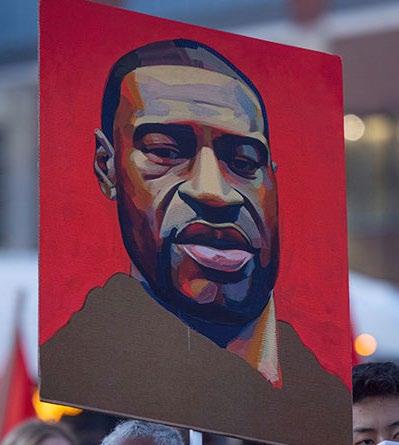
‘George Floyd lying helpless under the knee of the police officer was a symbol of the helplessness of Black British people in the face of the racist disadvantage we face...’
we were more likely to catch the virus and more likely to suffer and die from it. Our fate was in the hands of others: we had no agency; no power of self-determination; we existed at the ill or goodwill of others.
George Floyd lying helpless under the knee of the police officer was a symbol of the helplessness of Black British people in the face of the racist disadvantage we face, bereft of personal and group agency, and self-determination, existing – or not – at the whim of a racist system, condemned to suffer and die from race hate. If Black British people have any hope, it lies in agencies and powers of determinations beyond themselves, in the hinterland of white saviourism that has not saved them in the past but is their only hope now.
THE RELEVANCE OF JEREMIAH 29
It’s against this tide of dependency on the other for hope of prosperity – looking away from self in despair of a perceived infantilised existence of ethnic disadvantage and disparities – that my Pentecostal upbringing says NO! Black British people are humans made in the image of God (imago Dei) with agency, power of self-determination, and a plan. However, Jeremiah 29:11 has to become more than an optimistic plan when it says, ‘“For I know the plans I have for you,” declares the LORD, “plans to prosper you and not to harm you, plans to give you hope and a
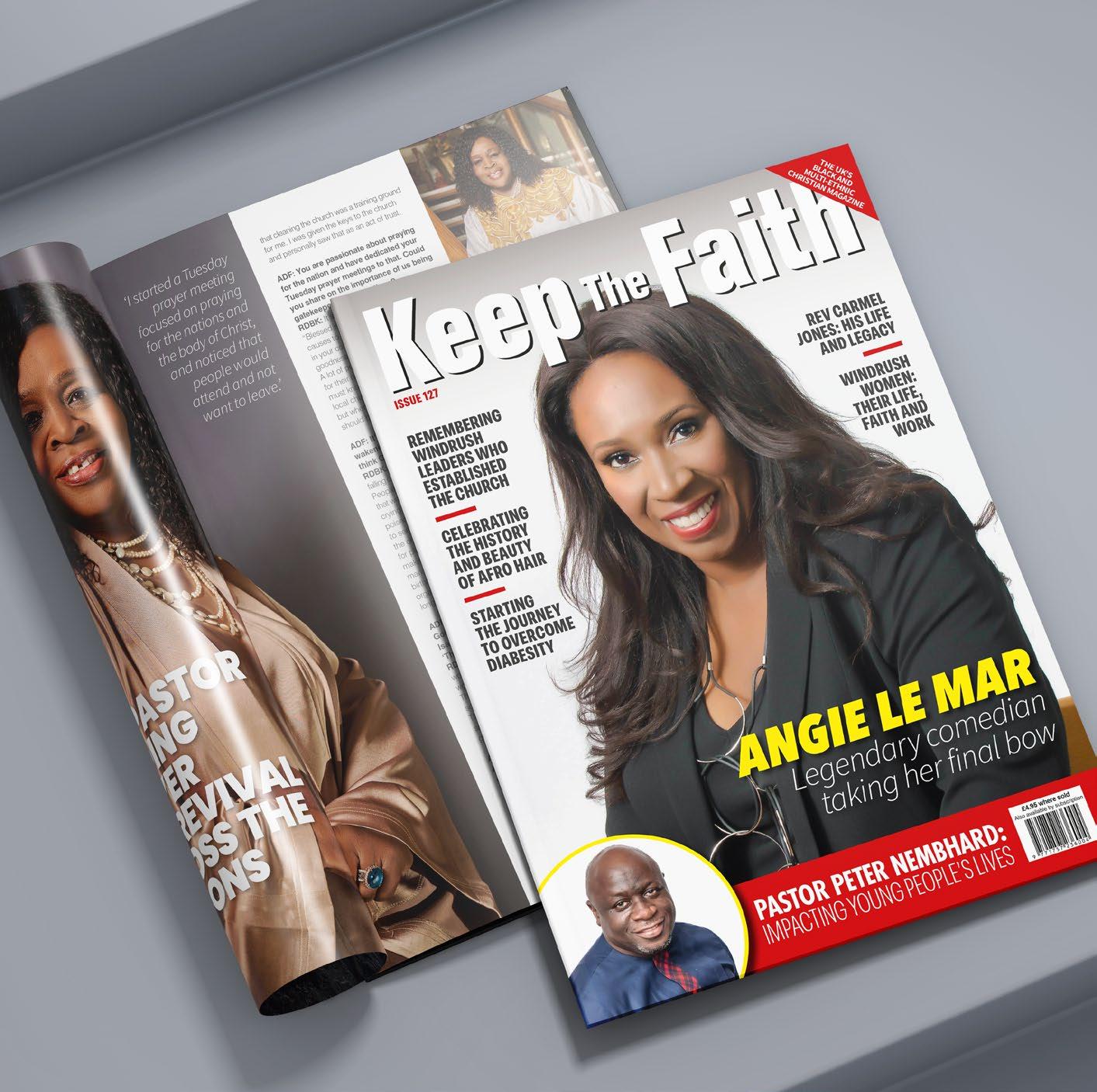
future.”’ God’s declared intention needs to be understood not as a fait accompli but as a call to action to make what heaven has declared come upon the earth.
Flourishing in Babylon: Black British Agency and Self-Determination therefore is a call to arms. It locates God’s intentions for us within a schema contained in Jeremiah’s letter to the exiles, encouraging them to adopt a plan for their survival, prosperity and eventual return home, based on a new cosmological frame of reference for God, their oppressors, and themselves. Simply put, ‘settle, build and grow’ was to be their watchword as they took their destiny into their own determinative hands, leading to prosperity and flourishing in Babylon. I write commending deployment of agency and self-determination as the vehicle capable of taking Black British people successfully to the place all humanity desires – one of humans flourishing in the company of each other and of Creator/Sustainer God.
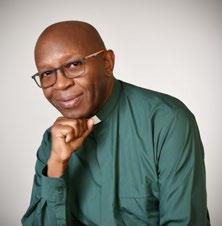
www.keepthefaith.co.uk 33
ADVERTISE WITH KEEP THE FAITH MAGAZINE Do you want to reach the Black Christian community – the most successful, stable, community-minded sector of Britain’s Black population? Advertise with Keep The Faith and make this space yours. Email advertising@keepthefaith.co.uk or phone 020 8868 0664 for more information
Bishop Joe Aldred is a retired Christian ecumenist, writer, speaker and broadcaster.

FOOD THOUGHT
BY MARCIA DIXON MBE
God is our help
Life is not easy at all and, during difficult times, we must dig into God’s Word to get the comfort, encouragement and hope we need.
There are so many things in this world that can make us feel hopeless, disappointed and depressed. Listening to the news is one of them.
I’m writing this article whilst listening to stories being broadcast about a teenage boy who was killed by a man wielding a sword in east London, and police storming a building at Columbia University to remove pro-Palestinian students protesting against the war in Israel.
Whilst we know that news in the media is not particularly positive and upbeat, it’s also a fact that our world is filled with much pain and suffering – whether it’s our own, that of people we know, or in the wider world.
The important question we must ask, however, is what does God have to say about pain and suffering? The good thing is that He says a lot through Scripture, and His Son, Jesus Christ, showed us that good things can come out of suffering.
1 Peter 5:10 makes it clear that suffering builds spiritual resilience and strength: ‘And the God of all grace, who called you to His eternal glory in Christ, after you have suffered a little while, will Himself restore you and make you strong, firm and steadfast.’
James 1:12 highlights that believers who overcome suffering will get a reward from the Lord:
‘Blessed is the one who perseveres under trial because, having stood the test, that person will receive the crown of life that the Lord has promised to those who love Him.’
And 2 Corinthians 1:3-4 emphasises that people can learn great wisdom that can be shared with others during times of suffering: ‘Praise be to the God and Father of our Lord Jesus Christ, the Father of compassion and the God of all comfort, who comforts us in all our troubles, so that we can comfort those in any trouble with the comfort we ourselves receive from God.’
When you serve God, no experience is wasted – even if it is a time in one’s life, filled with more shame than pain, even our mistakes. Paul wrote in Romans 8:28 – ‘And we know that all things work together for good to them that love God, to them who are the called according to His purpose.’
Life can be hard and challenging times will come, however, when we recognise God is with us, and that His Word contains all we need to overcome our difficulties, we’ll come out the other side spiritually strengthened and joyous.

The strength of men
Growing up as a child of the Windrush Generation, two-parent families were the norm in the Caribbean community.
Many Black people of my generation have a story to share of the disciplinarian Caribbean father who wasn’t afraid of using physical discipline to keep his children in line. Of course, there are variations to this theme, but there’s no mistaking fathers were a feature of Black family life.
They weren’t perfect, but they were present in their homes – unlike now, where too many children have no experience of being fathered.
As a community we need to be reminded that fathers are necessary. IMHO they are the protective backbone of our community, and their absence from families is one of the reasons we’ve seen a rise in gangs, youth violence and crimes.
Men, like women, are part of God’s glorious creation. Let’s recognise them as such and pray that they are restored to the position they need to be in our homes.
WINDRUSH GENERATION VALUES
As Windrush Day approaches, it’s a good time to reflect on the values espoused by those Caribbean people who answered the British government’s call to come and rebuild war-torn Britain. The values they arrived with were rooted in Scripture and reinforced by the churches and homes they grew up in. And they lived them out, passing them on to their children. I’m not sure if the children of the Windrush Generation have done as good a job, but here’s a reminder of some of those sayings and values:
1. People should respect themselves, others and their elders.
2. Individuals should honour their parents and love their family well.
3. Being truthful is a must. Who remembers the old adage ‘A liar becomes a thief’, often uttered by Caribbean parents?
4. “Don’t follow friend” (i.e., don’t hang with people who are negative or lean towards criminal behaviour) and “Know your own mind” (i.e., be an independent thinker).
5. “Don’t be bad mind” (i.e., don’t be spiteful, malicious or jealous).
6. ‘A good name is better than riches’ (Proverbs 22).
7. An individual should value education and be prepared to work hard for what they want.
8. Be generous and do good to others.
9. Love, pray and serve God.
We will and do fall short of living up to these values. If we have lost sight of them and have taken on some of the negative mindsets and behaviours prevalent in modern society, let’s take stock, reflect, and ask God for the strength and grace to re-introduce these age-old, positive and life-affirming values into our lives.
34 Find us on X and Facebook: @KeepTheFaithmag marciadixonpr.co.uk marciadixonpr Marcia-Dixon-Public-Relations 4
REPARATIONS: THE CHANCE TO HEAL THE PAIN OF AFRICAN ENSLAVEMENT
Alton P Bell asks: “How will the £100m reparation fund, being made available by the Church of England, help to address legacy issues with Black British men?”
INTRODUCTION
At the heart of British Christianity is a stain – the transatlantic slave trade and the part the Church played in the enslavement of Africans. This history is rooted in the interpretation of the Bible and the powerful beliefs that emerged from these ideas that continue to negatively impact the relationships between Christianity and Black African descendants today.
One of the greatest Christian interpreters of Scripture, Origen (185-254AD), an African church father, used the abstract notions of Blackness and whiteness to describe purity and sin. When he interpreted the Hebrew word for Ham as Black, every subsequent Christian exegete associated every Black person mentioned in the Bible with sin.
So, what has this got to do with the monies made available by the Church of England for projects to help descendants of those enslaved?
Long before Britain came into existence (1706), England’s moral authority came from the Roman Catholic Church. In 1442, Pope Eugenius IV issued a papal decree (or bull) – Illius Qui – which approved of Portugal’s Prince Henry’s slave trading expeditions to Africa. This gave Portugal sole rights over all its discoveries. His successor, Pope Nicholas V, issued another bull, Romanus Pontifex in January 1454, which gave formal support to Portugal’s monopoly of trading in Africa, including African slaves, with the instruction to convert ‘them’ to the Christian faith.
England joined the trading in African slaves in 1562, when John Hawkins obtained slaves from Sierra Leone and sold them to the Spanish during the reign of Queen Elizabeth I. Hawkins was knighted for his initiative and England subsequently became a major player in the transatlantic slave trade.
The trading in Black bodies was so lucrative that myriads of people were encouraged to invest in it. And as it was so far away from England, the investors had no idea of the crimes which were being perpetrated against the African slaves on the plantation. On arrival, the male had to be
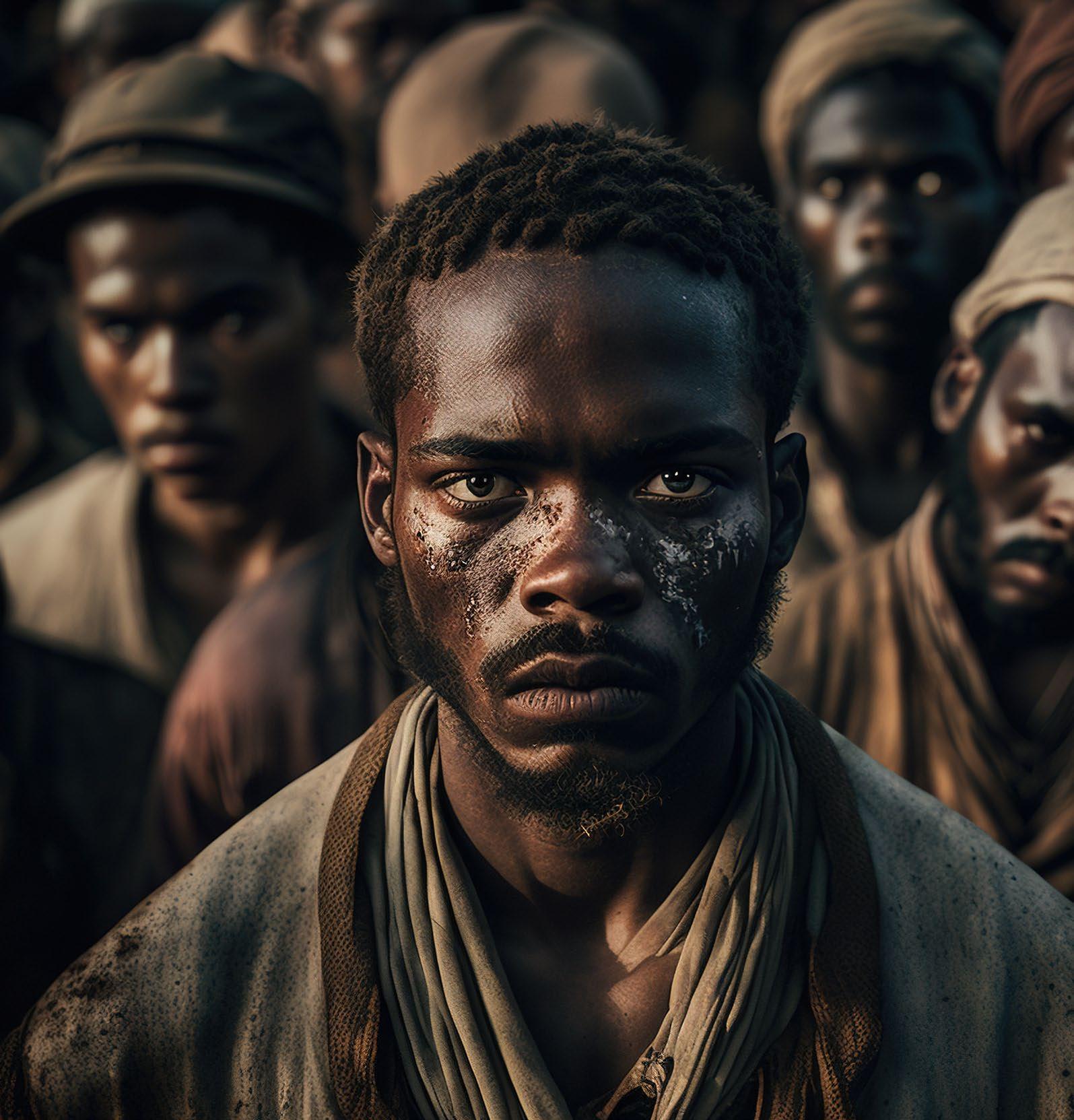
‘seasoned’. Part of this was having one of the ‘massas’ defecate in their mouth and urinating on their head. If the male survived this seasoning period, they would be taken to various plantations to produce offspring, since they were regarded as cattle.
The Church Commissioners invested in the South Sea Company in 1711 (via Queen Anne’s Bounty, founded in 1704), which profited from slavery, and the CofE became owners of more than 300 slaves when they accepted a bequest from Christopher Codrington in Barbados when he died in 1710.
DEVELOPMENT
Now, after 400 years of benefitting greatly and becoming one of the richest institutions in the United Kingdom, the Church of England has decided to atone for its sins. However, although this gesture is welcomed, this atonement has not followed any prescribed matrix for calculating quantifiable and non-quantifiable harm that took place during slavery and post-slavery. Furthermore, in announcing the £100m fund over nine years, the Church has not couched this in the well-established model for reparatory justice, viz. repentance, restitution, rehabilitation, recompense and ratification. How was this figure arrived at? As the current Chair of the Commission, Bishop Rosemarie Mallett, recently stated, this figure is not enough and should be in the region of £1billion.
CONCLUSION
Whatever figure they eventually land on, the Church needs to engage with scholars from the African Caribbean diaspora and the University of the West Indies to quantify their Black debt.
Racism is the biggest challenge facing Black and Brown people in Europe and the Americas. The Black man has been vilified, victimised and written off in the west, just because he is Black. The ‘Western code’, as proposed by Walter Mignolo, is deeply embedded in the Western psyche and, as part of the process of reparation, Western churches need to teach church history
The fact that the vast majority of the church fathers were African, and that North Africa was the centre of Christian learning, is always glossed over. The fact that Africa embraced Christianity long before it reached Europe is never emphasised.
All stolen artifacts must be returned. The funds made available should be used to debunk the myths of the past, and present the true Gospel of Jesus Christ – not a colonialised version of it.
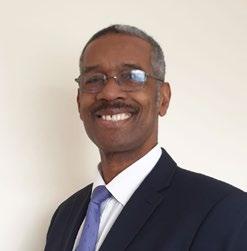
Alton P Bell is Senior Pastor of Wembley Family Church and Chair of the Movement for Justice and Reconciliation. Visit www.mjr-uk.com
www.keepthefaith.co.uk 35
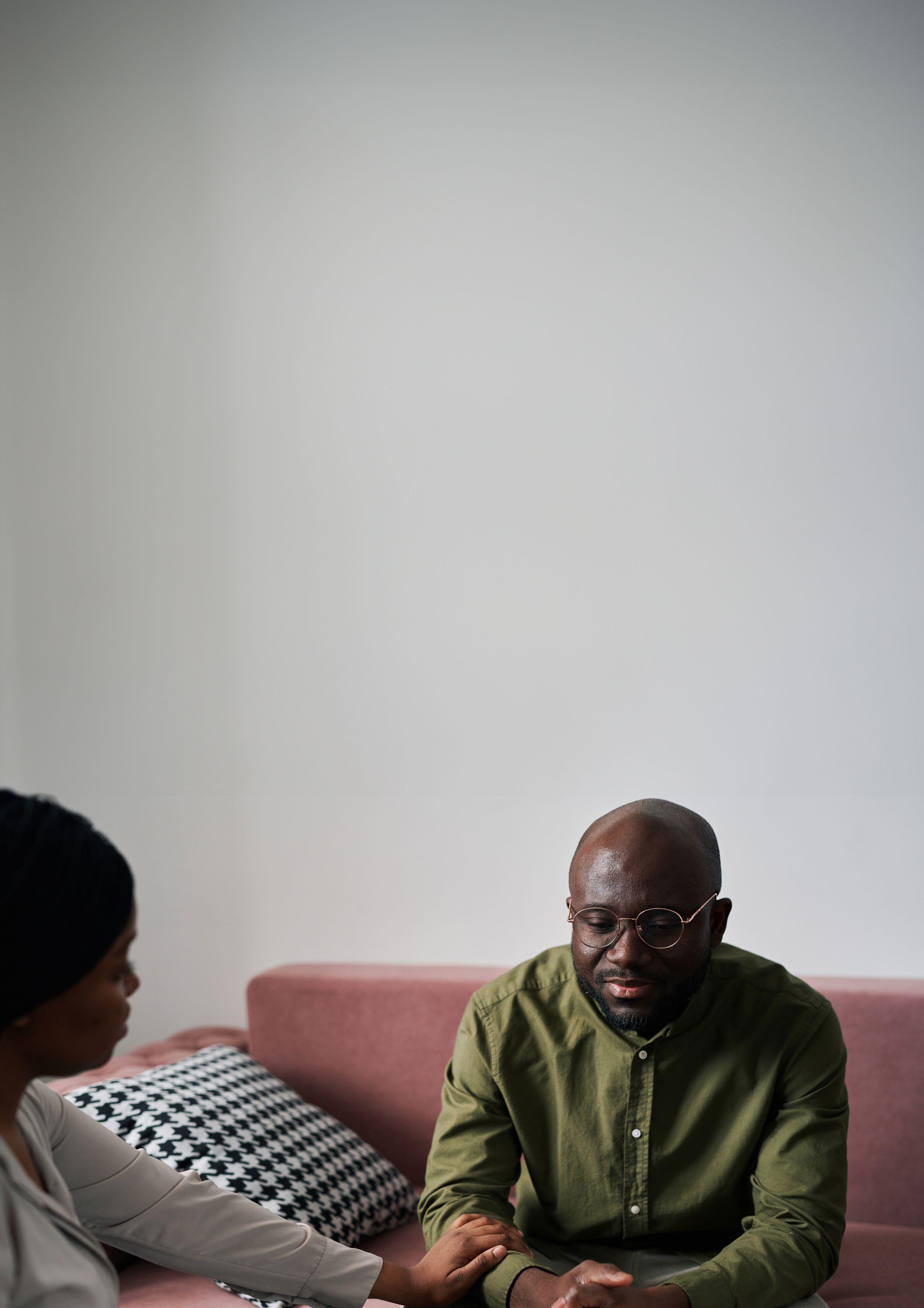
MEN, LET’S TALK ABOUT MENTAL HEALTH!
It’s said that men don’t like to talk about their problems. Dr T Ayodele Ajayi provides pointers on how to get men to open up about the issues affecting their mental well-being
The statistics regarding men’s mental health are a cause of concern. Three quarters (75%) of suicides in the UK occur in males (National Confidential Inquiry into Suicide and Safety in Mental Health). Globally, suicide is twice as common in males than females (WHO), yet only a third (36%) of referrals to Increased Access to Psychological Therapies (IAPT) in England are for men.
The conversation on how to support the men in our lives with their mental health could not be more timely. The challenge, however, remains that only one out of four men feel able to talk to friends or family about mental well-being. Men would rather talk about politics, sports and the economy, than emotions. Serious topics, like mental health, sexual problems, and money, remain hard topics to broach with even their closest of companions according to a recent survey. Could these facts partly explain disproportionate gender suicide? The most at-risk men are war veterans, low-income earners, BAME, gay, and the middleaged. What is also concerning is that a good percentage of men also feel it’s a
waste of a GP’s time to talk about anxiety or depression.
THE ALPHA MALE
Why does the male gender struggle so much to talk about feelings and emotions? Could the societal traditional definition of masculinity and the expectation of stoicism, strength, dominance and control from the Alpha Male be contributory to this, and possibly detrimental to the species’ well-being? Some research suggests that a reliance on these traditional ideals – as what it means to be ‘a man’ – may negatively impact men’s mental health. Men who feel as though they are unable to speak openly about emotions may be less able to recognise symptoms of mental health problems in themselves, and less likely to reach out for support.
BROACHING THE TOPIC
From years of negotiating this difficult terrain, both in my professional and social life, there are certain principles that appear to work when it comes to getting men to talk about feelings and emotions.
Authenticity: Many worry that not being mental health experts disqualifies them from supporting or talking to one another about their mental distress. In reality, ‘just’ being a listening ear that offers compassion, empathy and thoughtfulness is what is required. Attentiveness: Men are not as fluid with language when expressing mental distress. Be on the look-out for such phrases as “I’m feeling stressed” or “I’m not feeling my usual self”, as they may be the clue to ask again “Are you sure you’re OK?” Visit www.ruok.org.au for conversation prompts.
Privacy: Sometimes the opportunity to talk to a man about their mental state can come at an unguarded moment of disclosure. At other times, it may require some preparation on the part of the supporter to arrange a private place and time to
talk. An invitation to lunch, coffee or even a jog or walk can be all it takes for the other to confide.
Parity: Approaching a friend as a peer rather than as a superior is more likely to get them talking. Phrases such as “Man up” or “Grow up” have been identified as conversation blockers. No man wants another advising them on how to run their lives! A collaborative approach to a safety plan is more effective. Don’t forget to agree further support and checking-in times and methods.
Reciprocity: 35% of men surveyed in 2019 disclosed that if they wanted to talk to a friend about their mental health, they would ask how their friend is doing in anticipation that their reciprocation will open a conversation. I have found that sharing some of my vulnerabilities can be a great way to put the other person at ease.
Celebration: One of the greatest boosters you can give another man at their moment of mental distress is to offer a genuine compliment on something that is going right in their lives. That may well be thanking them for granting you access to the recesses of their hearts.
Confidentiality: Men will only share their emotions, insecurities and feelings if they know they are safe with you. The caveat to confidentiality is that a disclosure may be mandatory if a suicidal or homicidal plan is disclosed. In such rare instances, it is best to let the other person know why it is in their best interests to share to get them immediate help.

Dr T Ayodele Ajayi MBChB FRCPsych is a consultant psychiatrist, founder and convenor of the Tripart Care Emotional Wellbeing Hub and a YouTube channel called Tripart Care
36 Find us on X and Facebook: @KeepTheFaithmag
LASTING LESSONS FROM MY FIRST JOB
Gary
Clayton shares the spiritual insights gleaned whilst dealing with life’s little problems at work

Although it was many years ago, some of the lessons I learned during my first year at my first job have stood me in good stead. One is the need for creativity and innovation. There’s no point persisting with something if it doesn’t work.
Our offices were above a large London church, so getting into the building meant pressing the buzzer and listening to our instructions. When the buzzer went, my boss answered the intercom and assured his customer he’d reached the right place.
Then, trying to make himself heard above the traffic’s roar, he shouted: “I’m going to press the buzzer. When you hear it sound, pull the door towards you. Then, when you get inside, you’ll see a staircase to your left. Take the stairs to the fourth floor or use the lift.”
He pressed the buzzer, and I heard the visitor’s muffled cry. “Hello, anybody there?” So my boss grabbed the phone, yelling: “Pull the door!”
The man did so, but before my boss pressed the buzzer. Then, when the buzzer finally sounded, we heard the man pushing the door. “No!” my boss bawled, “Pull –the – door!”
The visitor did so and entered the building. Then, after a long pause, the buzzer went. “It’s me again! What floor did you say you were on?”
“The fourth!” my boss shrieked, then repeated the process of trying to get the visitor to pull the door. This, after several unsuccessful attempts, he eventually managed.
I’ve no idea how much time was wasted, but anyone new to our Christian film hire
company invariably arrived frustrated and stressed.
Being young, I assumed that the problem lay with my boss, but when I tried letting someone in, the result was exactly the same, though accessing the building hardly qualified for one of Hercules’ 12 Labours.
So, the next time the buzzer rang – having prayed for inspiration – I gave the company’s name, adding: “There is a lift, we’re on the fourth floor. When you hear the buzzer, pull the door!”
Believe it or not, it worked!
It still makes me think of the need to put new wine into new wineskins and the fact that you can’t keep doing things the same way and expect different results.
It also reminds me of Isaiah 55:11 which says that when God’s Word goes out, it won’t return empty but will accomplish its purpose. Words, I realise, are supremely important, as is the way in which they’re communicated.
The second lesson was less positive. There was a large window above my desk and every time I pushed it open to alleviate the heat, it closed again.
One day, I rolled some cardboard into a tube and wedged the heavy window open. All was fine until its weight concertinaed the cardboard and the window swung shut again.
Now, because the films we supplied often came on uncrushable metal spools, I decided to use one to keep the window open…
Sometime later, when I went to get some sandwiches, I looked up to see the room where I worked and, in doing so, noticed the large silver spool glinting in the sunlight.
And then it came to me! The spool was metal, the window high up and – this being
London – the people passing below extremely numerous. Were the spool to be displaced, it would plummet down, probably embedding itself in someone’s skull or taking their ear off!
Having no wish to be like Simon Peter in John 18:10, I shot across the road, pressed the buzzer, leapt up the stairs, rushed into my room and – heart pounding furiously –retrieved the heavy metal spool before disaster struck.
Later, it occurred to me that life is like that. We go about our normal activities with no idea that death or destruction can overwhelm us at any moment. Did the people living in Ukraine expect to be invaded by Russia, or those in Israel and Gaza anticipate conflict breaking out?
The metal spool was a literal sword of Damocles hanging over the heads of those passing below – any of the passers-by being a potential victim.
The Bible tells us ‘There is a way that seems right to a man, but its end is the way to death’ (Proverbs 14:12). Fortunately, people escaped the threat of the spool, but we have no idea what dangers await us through malice, misfortune, the foolishness of man, or our own deliberate fault.
It doesn’t matter how oblivious we might be – without God, everyone is lost and in mortal danger.

Gary Clayton is married to Julie, the father of Christopher (20) and Emma (17), and works for Mission Aviation Fellowship (MAF). To learn how MAF planes save lives and share Christ in some of Africa’s most isolated areas, visit www.maf-uk.org
www.keepthefaith.co.uk 37
MEN AND THEIR HAIR
Hair specialist Verona White provides tips, advice and insight on how men can maintain hair health and offers solutions for hair loss and baldness

Hair is just as important to men as it is to women, and one key issue men encounter is hair loss which goes through various stages – each one with its own unique characteristics. Understanding the stages of male hair loss will help in recognising the early signs, so that natural remedies can be introduced to prevent further progression.
The first stage of hair loss is usually a receding hairline, particularly in the temple area. This can be a natural aspect of ageing, but in younger men it also indicates male-pattern baldness. This condition causes hair follicles to shrink, resulting in thinner and shorter hair growth.
As male-pattern baldness advances, the hair loss can extend to the crown of the head, forming a horseshoe-shaped pattern with hair remaining on the sides and back. This progression can occur in men who have a genetic predisposition to hair loss or be caused by the effects of certain medications or illnesses.
The final stage of hair loss in men typically involves extensive balding on the top of the head, leaving only a narrow band of hair along the sides and back. This can have a significant impact on a man’s appearance and self-esteem; some men shave it all off and some embrace it.
Hair loss in men can be attributed to various factors, including genetics, hormonal changes, stress, and poor nutrition. Hormonal imbalance – particularly the conversion of testosterone to dihydrotestosterone (DHT) – plays a crucial role in male-pattern baldness. Chronic stress disrupts the hair growth cycle, while inadequate nutrition weakens hair follicles. To slow down the progression of hair loss,
men can adopt natural remedies to stimulate hair growth, improve scalp health, and enhance overall hair health.
Regular scalp massages – when used with essential oils like peppermint oil (which has stimulating properties) – are beneficial in boosting blood flow to the hair follicles, strengthening the roots, and promoting hair growth. When applied to the scalp, or used in head massage, peppermint oil enhances circulation, promotes hair growth, and soothes the scalp. Its cooling effects help reduce inflammation and create a conducive environment for healthy hair growth.
Microneedling is also an effective technique for promoting hair growth naturally. By creating micro injuries on the scalp with a special tool, collagen production is stimulated, blood flow is increased, and hair growth and thickness are improved.
Maintaining a healthy diet and incorporating fitness into a daily routine can play a vital role in preventing and managing hair loss. Essential nutrients and regular physical activity can promote overall health, improve blood circulation, and support hair growth.
Inflammation around the follicle is one of the causes of hair loss, so you must include nutrient-dense foods in the diet to maintain healthy hair. Foods rich in vitamins, minerals and proteins, such as leafy greens, fruits, lean proteins, nuts and seeds, can provide the necessary nutrients for strong and vibrant hair. Omega-3 fatty acids (found in fish, flaxseeds and walnuts) can also promote hair health and reduce inflammation that sometimes contributes to hair loss.
Regular exercise is also beneficial for overall health and can help improve blood circulation, including to the scalp. Increased
blood flow to the hair follicles can stimulate hair growth and support a healthy scalp environment. Engaging in cardiovascular activities, like running, cycling or swimming, as well as strength training exercises, can promote circulation and overall well-being.
Incorporating stress-reducing activities, like deep breathing exercises alongside a healthy diet and fitness routine, can further support hair health. Chronic stress can contribute to hair loss, so managing stress levels is crucial for maintaining a healthy head of hair.
When men prioritise a balanced diet, regular exercise, and stress management techniques, they can support their overall health and potentially slow down or prevent male hair loss. Consulting with a healthcare provider or a nutritionist can help create a personalised plan that addresses specific nutritional needs and fitness goals to promote hair health and overall well-being.
It is important that men are aware of what is happening to their body before hair loss occurs, as nothing manifests outside your body without it manifesting inside you.
Incorporating these natural methods into a regular hair care routine can help men maintain healthy hair and potentially stimulate hair regrowth.
Hair loss does not have to be something you assume you are going to inherit if all the right things mentioned in this article are implemented on a daily basis.

Verona White is a hair stylist, wig technician and author of 21 DIY Recipes for Curly Hair. She is also editor of online magazine Afro Hair Growth Challenge. For more hair tips and hair products, visit www. afrohairgrowthchallenge.co.uk
38 Find us on X and Facebook: @KeepTheFaithmag
SOCIAL WORKERS: WHOSE SERVANTS?
Joy Roxborough shares ways in which the Church can support those who may be susceptible to being scrutinised by social services
Recently, I had the honour of attending my graduation ceremony, having gained a master’s degree in Social Work. It was my moment to say thank you to God for the tumultuous time that He carried me safely through, even while I was completing the degree.
Like most Social Work students, I signed up for it because I wanted to help people. The curious thing, though, is that as I read for the compulsory Critical Perspectives module, I discovered that we were not being paid to advance our ideological aspirations of helping anybody. Rather, we were essentially pawns – as most other citizens of a welfare state are – and our role was to maintain social order and stability among the masses in order to protect the interests of Capital! Forget the balderdash in the Social Work Code of Ethics
The Critical Perspectives module expounded the idea that the current social work system is a product of the Victorian workhouse system and the Poor Law Act (1834). Under that old system, people who needed state help were vilified, deemed as vagrant, and the entire system was highly stigmatised. That fact is not hard to see when watching any typical Victorian-set film, such as Dickens’ Oliver Twist. Although the Poor Law Act was gradually dismantled and replaced by the National Assistance Act (1948), the current welfare state that emerged still carries vestiges of the former.
The long and the short of Critical Perspectives was: 1) We were being trained to go into the field with a clear understanding that we had no right or justification for adopting any stance of arrogance that could result in us looking down our noses at any client who, for whatever reason, found him/

herself dependent on state welfare; and 2) Welfare and all its trappings was the price Capital was willing to pay to maintain the societal order needed to make conditions favourable for continued capital accumulation for the minority. For those of you who may be interested in exploring these ideas further, Iain Ferguson’s Reclaiming Social Work: Challenging Neo-Liberalism and Promoting Social Justice provides a fascinating and easy read.
Most of us as Caribbean people are hard workers, so what has all this got to do with us? you may well ask. Think about the UK child protection system which, although separate from Welfare itself, is an integral part of the state apparatus and subject to social work interventions. While I am not in support of ‘smacking’ children, how many of you upstanding, church-going people would admit to applying any measure of pressure, however mild, to your child’s rear end in today’s dispensation? Maybe none of you, and that’s great.
‘Unless God intervenes, that is one more Black family fractured, in my estimation, for no justifiable reason.’
However, a family I know – serving in church, happy marriage, respectful children, though not perfect – recently found themselves subject to social work intervention for that very reason. One parent was forced by the system to leave the home and they were required to cut all contact with each other. Months later, when the intervention was wrapped up, Social Services stepped away and left the family amidst the ruins of the intervention. I say ‘ruins’ because the parent
who was arrested and forced to leave was so traumatised by the sequence of events that that parent was unable to voluntarily return home. Unless God intervenes, that is one more Black family fractured, in my estimation, for no justifiable reason.
This could happen to any family, if you raise your voice at your children – if you shout at them or smack them – and I am not even talking about the kind of beatings those of us in our fifties and older know about.
As churches, how would you support a member family who found themselves in such a situation? In the first instance, open communication from such a family would be important, and having someone to support them in an advocacy role at social work meetings would be useful. As I said previously, social workers are not there primarily to help you. If you do get one who understands and is in your corner, their suggestions/ recommendations can easily be overruled by a manager who does not really know you.
Secondly, churches could develop programmes to support families with finding alternative ways of disciplining children before problems arise.
Thirdly, counselling services are an invaluable resource for families facing struggles. Is it time for counsellors to become a regular part of church tradition once more? I would say yes. It could take some time, but it is certainly something to begin thinking about.

Joy Roxborough is a creative industry professional, writer and entrepreneur. Email joyroxborough@yahoo.com
www.keepthefaith.co.uk 39
Christian men, business, and the c all to entrepreneurship
Pastor Denis Wade gives reasons why more Christian men should consider setting up a business
From my early teen years, I have been fascinated by the call to business and entrepreneurship. Now as a Christian leader of over 30 years, as well as a businessman and entrepreneur for most of that time, I feel just as strongly about the call as I did in my 20s, 30s, and even my 40s.
For many Christian men, the call to business and entrepreneurship is a strong and enduring motivation, a journey of a lifetime, so to speak. It is not just the pursuit of profit, but also an important pathway which includes stewardship, service and self-fulfilment.
Why Christian men should set up a business or side hustle
The Bible clearly teaches that God entrusted mankind with talents and resources, and urges us to multiply and steward them wisely. Entrepreneurship can then become a powerful means, a vessel through which this biblical stewardship can be manifested. By establishing a business or side hustle, Christian men can embrace the call to be fruitful and multiply, not solely in material wealth, but also in impacting lives and advancing God’s kingdom on earth. Through entrepreneurship, men can express their creativity, leverage their skills, and be agents of positive change in society.
The benefits of running a business
Running a business extends beyond financial gain; it offers a platform to embody biblical
principles in the marketplace. Integrity, compassion and excellence can become cornerstones of operations, reflecting the character of Christ in all endeavours. Entrepreneurship can also foster self-reliance and resilience, while nurturing essential traits for spiritual and personal growth. Through the many challenges and triumphs of business, Christian men can deepen their reliance on God’s guidance and provision, while cultivating a faith that transcends various circumstances.
Things to consider before starting a business
Before embarking on the entrepreneurial journey, Christian men should prayerfully discern their motives and align them with God’s purposes.
Integrity should permeate every aspect of our business dealings – from our day-to-day business practices to all our relationships with stakeholders and associates alike.
In addition, a solid understanding of market dynamics, financial management, and legal requirements is also important. Seeking counsel from experienced mentors, coaches and peers is also highly recommended. Seeking wisdom from God’s Word also equips men to navigate the complexities of entrepreneurship with grace, discernment and humility.
How to ensure business success
It is important to remember that, for the Christian businessman, real success in business stems from a firm foundation that is rooted in faith, integrity and good stewardship. Christian businessmen should then cultivate a deep relationship with God and seek His wisdom and guidance in all their decision-making.
Heartfelt prayer should become the cornerstone of strategic planning, inviting God’s direction into every aspect of our business dealings. Additionally, embracing a servant leadership mindset is crucial, and it also helps to foster a culture of trust and empowerment
within any organisation. Christ’s humility and compassion are great examples for us as business leaders, and these values, when practised well, are often reproduced by those who observe and follow our leadership. We should keep in mind that continuous learning, flexibility, and the ability to adapt to changing circumstances in the marketplace are also important skills to master; they allow us to remain relevant and to innovate in an ever-changing environment.
I believe the journey of Christian businessmen and entrepreneurship should transcend mere profit-making; it should ascend to the biblical call of fulfilling Kingdom mission. It can be a means by which God uses men to fulfil the Divine mandate.

As we embark upon this worthy cause, may we do so with purpose, integrity, faith and compassion, and may the Lord be pleased with our efforts as we look to Him for guidance, inspiration, blessing and approval in all that we pursue.
Personal reflections on my experience in business
Reflecting on over 30 years of personal business experience in sales and marketing, property investing, and business management services, I realise I have faced many challenges that have put my Christian values and character to the test. But leaning on God’s Word has always brought me through, showing me the best ways to do business, manage people, and navigate the daily challenges.
I often found inspiration from the accounts in the lives of Bible characters, like Joseph, Daniel and Nehemiah, as well as modern Christian business thinkers, leaders and authors, like Zig Ziglar, Brian Tracy, Myles Monroe, and John Maxwell.
Their experiences and examples can light the way for you too, showing how faith and integrity can lead to success in the business world. So, whenever you’re in doubt, turn to God’s wisdom, and let these examples guide you on your entrepreneurial journey.
Here’s to your success.
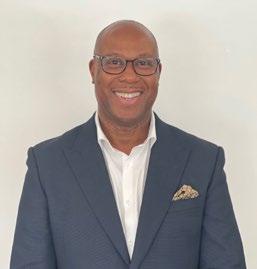
Pastor Denis Wade is Senior Pastor at Micah Community Church, London. Visit www.micah.org.uk
40

We are living in unprecedented times, in terms of the amount of information we can access from the internet. Furthermore, we are living in an era where those who access the internet are getting younger and younger. If you are a parent/guardian, or work with young people, online safety may be a sobering matter because of growing dangers, such as cyberbullying; exposure to inappropriate content; sharing personal information; and downloading harmful software onto their devices. This is the reality we are faced with today.
But first, let’s go back to basics
As Christians, we have so much direction and wisdom available to us throughout the pages of the Bible. We serve a God who is able to help and direct us in all things that pertain to our daily lives – including the online space. We must pray for the young people we are connected to, and pray that God will increase our awareness and knowledge about online safety. He will guide us on what do with the young people who are in our lives, and on how to approach this matter.
Now, let’s look at some suggestions that may help us to have a faith-filled mindset towards online safety.
Tip 1: Engage proactively with young people about their online activities and connections
Social media platforms and messaging apps can often be the easiest places for cyberbullying and viewing inappropriate content. So, seek to be conversational with your young person, to learn about the content they are engaging with online; the conversations they may be having; videos they may be watching; and what they find entertaining. Seek to learn all you can about their online world.
KEEPING YOUNG PEOPLE SAFE ONLINE
Vernette John-Joiles shares some insights on how parents and guardians can help young people navigate the online world safely
Tip 2: Encourage the use of mobile devices in open spaces, and not just in isolation
If possible, consider cultivating an environment where your young person isn’t left alone with a mobile device/laptop for long periods of time. Perhaps encourage them to use their device in an open space, in the company of other people. This means you can keep an eye on what is being downloaded or read/listen to online conversations. Minimising the use of devices in isolation will provide balance for the young person in what they are consuming. To take this further, if the young person is a minor, it might be useful to impose some limits on device usage, i.e. all devices must be put away late at night.
‘...seek to be conversational with your young person, to learn about the content they are engaging with online.’
Tip 3: Reassure your young person that they don’t have to do anything online that feels uncomfortable
As part of ongoing conversations, encourage your young person to take care who they connect with online, and tell them they don’t have to carry out any actions that feel uncomfortable. The temptation with social media, messaging apps and online forums is that psychological pressure can cause young people to get caught up in the moment, and comment or share without thinking. Be available for your young person so they know they can come and ask your opinion about any request they may receive – especially if it’s from somebody they don’t know or have only recently become acquainted with.
Tip 4: Consider using security features for devices and apps
If you are responsible for young children, it
can often feel convenient to give them a mobile device as a way of keeping them occupied. If this is something you do regularly, security features – such as password locks to restrict access to inappropriate content or inadvertent purchases – would be a useful step. Many mobile devices are installed with password locks and other security features, so that apps can locked after a certain period of time.
Further guidance
Lastly, here are some useful websites that have a Christian approach to online safety. Some also have mobile apps that can be downloaded.
Common Sense Media: www.commonsensemedia.org
Internet Matters: www.internetmatters.org
Protect Your Eyes: www.protectyoungeyes.com
In conclusion, let us not forget there is a lot of good that comes from the online space. Today, we have diverse ways of learning; easier methods to check in and connect with others; and countless ways to share the Gospel. It’s important, therefore, to hold a balanced mindset when thinking about helping young people to stay safe online. As a parent/guardian or somebody who works with young people, be sure to protect your own digital footprint as well. Online safety is an important topic for everybody.

Vernette John-Joiles is the founder of Digging Into Digital. Vernette enjoys teaching and training about digital and tech, to improve digital literacy for Christian leaders. Visit www.digginginto.digital
www.keepthefaith.co.uk 41
Ministry leader and pastor, Yvonne Brooks, provides wise, compassionate and insightful advice to readers experiencing problematic life issues
My ‘baby mother’ will stop me seeing my child if I get married
Prior to my conversion I was a rogue and had children by two different women, but looked after them by hustling.

However, after meeting a youth pastor, and hearing the Gospel, I became a Christian. Now, five years later, my life has real purpose and direction. I went to uni and now have a degree and I’m in a profession with good promotion prospects. I also serve as a youth leader in the church, and have met a lovely girl who I’m now engaged to. However… I have a problem.
One of my baby mothers has kicked off and said that if I marry my fiancée I won’t be able to see our son. I’m not sure why she is behaving like this; we parted amicably prior to my conversion, and she is currently seeing someone. I have always been committed to my child and would be heartbroken if I couldn’t play a role in his upbringing. I’m not sure how to resolve this situation. Can you help?
Peter, Leicester

Pastor Yvonne: I am so glad God is still in the life-changing business. Congratulations for all the work you have put in to becoming the man you are today. I salute you, sir. You have managed to grow and gain stability through Christ.
If you have been there for your child and taken an active role in his upbringing, then your child has a relationship with you. What parents may fail to realise, is that children grow up really quickly and will usually have a yearning for what they perceive is missing from their lives.
Matters Heart
of the
I believe it is possible that you will have grounds for a custody hearing/court case, in order to have access to your child. Be ready, though, to put up a fight. It would appear that your ex has a case of sour grapes. However, continue to show her respect as the mother of your child. Try, too, to minimise any trauma to your child so that they do not become a casualty of war.
Please pursue the route of pre-marital preparation, in order to ensure you and your fiancée are prepared and ready for the future, and that she is prepared to share you with your children and the possible bad behaviour of your ex-girlfriends.
Lastly, if you weren’t before, become a man of prayer.
Now I’m over 50, I feel the church is ignoring my leadership skills
I have served in numerous church departments – either as a leader or assistant leader — and loved it. Now in my 50s, I have noticed people in my age bracket are being overlooked for leadership roles which are, instead, being given to younger people.
I understand the need for younger leaders in church, but I also feel those over 45 have been put out to pasture. I feel redundant. I still have a lot to give to the church in a leadership capacity, and have begun contemplating going to the Baptist church – some of my mature friends have gone there and their skills have been welcomed with opened arms.
I love my Pentecostal church – it’s where I came to faith – but if they aren’t going to use me, am I wrong for wanting to go elsewhere? Jason, Birmingham
Pastor Yvonne: If you still have a lot to give then do not wait to be asked, just give what you have. What can you see that needs to be done? Who around you, in or outside of the church, needs help or support? The world is your mission field.
The Church is the body of Christ, and every part should function. In this 21st century, though, we are waiting to be asked or appointed. Do we have to be the head or the assistant for us to feel it is worth our time? The pastor is leading the church, but who is the Head of the church? Who really gives us our marching orders?
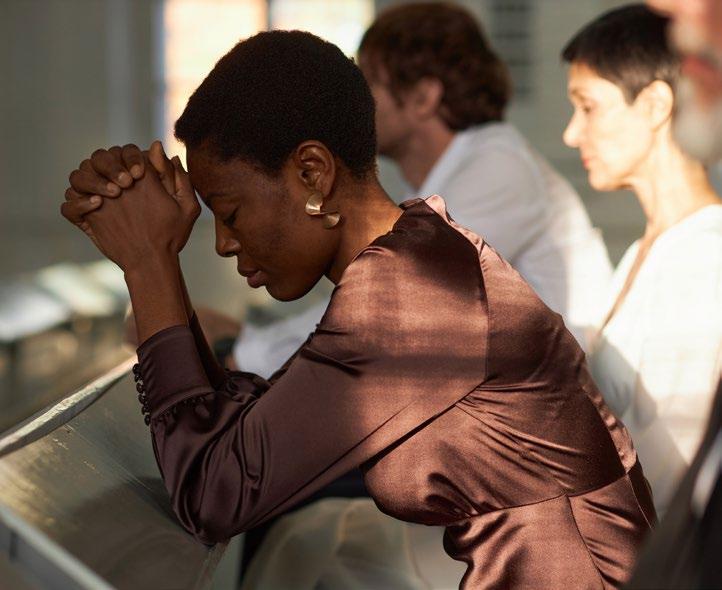
I would encourage you to get into that place of prayer and seek the voice of God for your next stage of life. Getting older can make us feel a little jaded and sometimes surplus to requirements, but I assure you that you are an essential part of the next move of God. The Church needs every age group, and I don’t think your church is any exception. Fall in love with Jesus and fall in love with those around you. His joy will strengthen you.
If you would like help with a problem, email editor@keepthefaith.co.uk Your details will not be published.
Pastor Yvonne Brooks is a co-pastor at New Jerusalem Community Church, Birmingham, and founder of Woman of Purpose, a ministry that encourages women to fulfil their purpose. She is also a speaker and author. Visit www.yvonneelizabethbrooks.co.uk
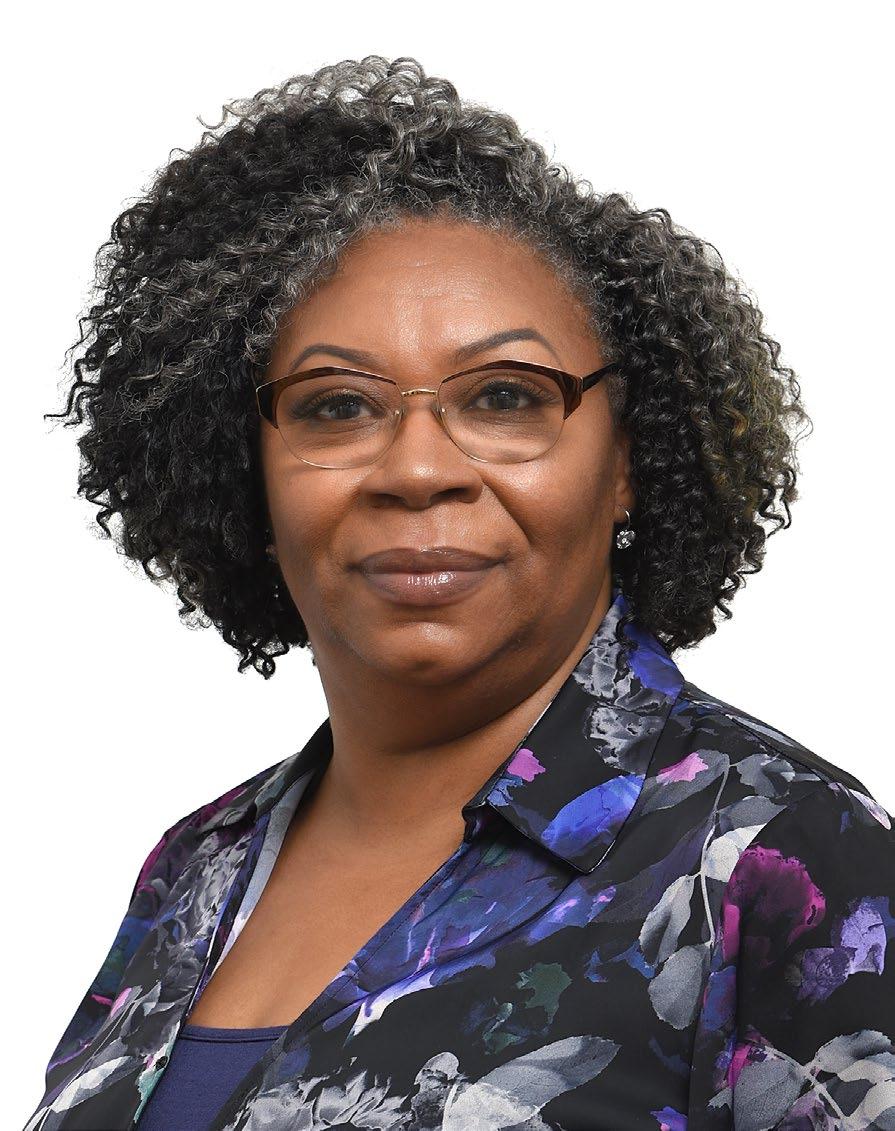
42 Find us on X and Facebook: @KeepTheFaithmag

WHY MEN’S HEALTH SHOULD BE A WOMAN’S CONCERN
Olivia Williams looks at the role women can play to ensure the men in their lives enjoy optimum health
His cooking skills were like honey from the honeycomb; he managed the household affairs, and attended to her medical needs with utmost care. He knew what she wanted and how she wanted it. He understood her routine so well. She, the one who was unwell, was cared for so well that his sudden passing caught everyone off guard. My grandfather, in his selflessness, prioritised my grandmother’s health over his own. Now, if you’re a woman, you’re probably asking yourself, what does a man’s health and fitness have to do with me? Well, the answer is: everything!
The importance of men’s health for women
Men’s health issues don’t just affect men; they have an impact on everyone, and without men, there would be a total collapse of communities, society and, of course, mankind.
Men’s health isn’t designed to be a solo affair; it is intricately woven into the well-being of those around them, just as Adam’s health was intricately woven into the well-being of the woman who was made from his rib (Genesis 2:22). As stewards of our bodies, given to us by God, it’s essential for both men and women to honour and respect this gift.
Preserving family legacies
We should see that taking care of the health of our ‘kings’ as honouring our ancestors, as well as preparing a healthy foundation for future generations to come. This was a responsibility given to us by God Himself.
The ripple effect
Our bodies are the temples of the Holy Spirit and, as such, their maintenance and care have a huge effect on our spiritual well-being. When men prioritise their health, they set an example of stewardship and responsibility for their families and communities. In addition, when women are empowered through education, they can support, nurture and create a healthy, happy environment.
Supporting
men through awareness
As men age, their testosterone and progesterone levels gradually fall. Changes that take place include a decrease in bone density and muscle mass; metabolism; and even sperm production and prostate function. So it’s important to support our men as these changes occur. We may put it down to grumpiness, but with hormonal fluctuations occurring daily, their overall well-being is impacted. It’s essential to be mindful of these fluctuations as, without good health and fitness practices, they can become a recipe for dissatisfaction with life and purpose.
FOUR WAYS WOMEN CAN SUPPORT A MAN’S FITNESS JOURNEY
1. Regular exercise
In 1 Timothy 4:8, we are reminded that ‘physical training is of some value, but godliness has value for all things, holding promise for both the present life and the life to come.’ Regular exercise is vital for maintaining optimal health and well-being. Not only does it help to strengthen a man’s muscles for the tasks ahead and to improve cardiovascular health, but it also promotes relaxation, whilst disciplining his mind and spirit.
2. Encourage regular check-ups
Prioritise his health by scheduling regular check-ups – just as he would do for the maintenance of his car to ensure it runs smoothly. Men’s bodies require the same level of care and attention as their cars – if not more.
3. Cook fresh nutritious meals
In 1 Corinthians 10:31, we are reminded, ‘So whether you eat or drink or whatever you do, do it all for the glory of God.’ By eating and cooking the right kinds of foods and eliminating those that are not suited to his physical condition or lifestyle, you can not only prevent, but also cure certain diseases trying to attack
the man in your life. Meals with no saturated fats and fewer preservatives are a start, and learning how to combine them in the right way may just save his life.
4. Incorporate zinc and magnesium Zinc is essential for the metabolism of testosterone, sperm production, and prostate function. Magnesium helps keep blood pressure under control, reducing the risk of hypertension and cardiovascular diseases. In addition, to address hormonal imbalances, consider natural practices, such as managing stress, maintaining a moderate weight, ensuring adequate sleep, and incorporating herbal remedies, like damiana, sea moss and sour sap leaves into the diet.
The ‘Strength of a Woman’ LIVE Masterclass
Just remember your man’s health is important to God; without him, we cannot be fruitful, multiply, fill the earth, subdue it, and have dominion. That’s why we’re inviting you to our upcoming webinar, The Strength of a Woman. We want to help empower you with knowledge to share your strength with the men in your life to create a happier, healthier family. We’ll shed light on spirit, soul and physical health and the vital role we can play in helping men lead healthier lives. No more allowing him to put himself last! It’s time to restore his health. So, ladies, secure your seat today at www.scriptfit.com

Olivia Williams is founder of Scriptfit, a qualified health and fitness coach, personal trainer and public speaker. Visit www.scriptfit.com
www.keepthefaith.co.uk 43
The business side to being an author
Literary agent Vanessa Grossett shares why it’s important for authors to be authentic, build their brand, and pay attention to the business aspect of book publishing
While I know writers are more interested in the creative side and getting their manuscript completed, it’s good to remember that being an author is a business. A lot of authors tend to shy away from the marketing side, particularly with regards to promoting themselves.
I still get queries, especially from new authors, stating they are looking for an agent to market them and their book. Though I do happily promote my authors’ works, not all literary managers will do so; they are not obligated to. This goes for publishers as well. It is important for writers to build their own credibility, readership and fan base – even more so if you are new to the business. Thankfully, with many avenues to market, building your brand as an author is easier than it used to be. Plus, you can reach readers from all over the globe.
Here are some tips and advice that will help get you started and maintain your brand:
Be yourself
This is significant, especially when you make the big time. There will be pressure to fake the authentic you, and to watch what you say. However, readers are buying your books because of who you are, and not just for a good story. When you start to be yourself in the early stages, it will be a lot easier to remain as you are as time goes on. I am not saying to disclose everything about yourself – yes, there are things that are personal – but just enough so the reader can relate. The authorand-reader relationship, believe it or not, can be long lasting. If a reader likes you, they will surely support you continuously and buy your books.
Build a website
There are a lot of free website builders you can use, like Wix and WordPress. Having a website is good for your brand, and for your
readers to visit. You can also allow readers to subscribe to newsletters via your website, and post videos about your writing journey or about books you are writing. You can also develop your contacts and collaborate with other authors by doing blogposts on their sites (which is also a great way to network). In any industry, having contacts is a must, and publishing is no different.
It’s good to do your own research on other author pages, or even look at website design in general to get a feel of what suits you.

Social media presence
If used in a positive way, social media can be one of the best marketing tools. It can help you reach people that you most likely would not have interacted with. I personally have found social media helpful in terms of networking and marketing, and you don’t need to post everything on there. You can share only what you want to share, and engage in other people’s posts and comments. The more you do that, people will tend to view your profile, and you can make wonderful connections.
With social media, don’t just post about your book. For example, as well as my author’s products, I also add inspirational or scriptural posts. It’s about having a balance and you don’t need to be on there every day. Furthermore, don’t get caught up in what everyone else is doing, focus on your God-given successes and accomplishments.
Remember, there is a time for all to have their big breakthrough and blessings – you included. Isaiah 60:22 says “When the time is right, I, the Lord will make it happen.”
Investing in your brand
Don’t be afraid to invest in your brand – which is ultimately yourself. Even if there is a monetary exchange, set a budget aside.
If it means hiring a publicist to help you get started, hire one. If you need to take a website design course, or other courses, such as creative writing, to enhance your skills, then do it. You are the business, and you want to present yourself in the best way possible.
You can always learn from other people, someone may have something of value to exchange, and to give you advice on. Investing in yourself and your brand is a good way forward.
These are just some of the ways you can build your brand as an author. Do remember to ask for help, especially as a new author. Don’t be embarrassed, everyone had to start at some point. One day you may be one of the ones someone will turn to for help.
Happy writing and brand-building. Vanessa www.theauthorsagency.co.uk

44 Find us on X and Facebook: @KeepTheFaithmag

A father’s love
Ousmane started searching for healing the day his daughter was born, over four years ago.
Aissatou was born with a cleft lip. Her dad knew it would make her life tough growing up.
So he visited every hospital he could find to look for medical help. He was turned away time and time again. No hospital was equipped to provide the surgery she needed. His friends in his village started to lose hope, telling him her cleft lip was beyond repair.
Despite the voices telling him to give up, Ousmane refused to stop searching for help.
Thanks to caring people like you, Ousmane’s prayers were answered. Mercy Ships sailed into Senegal, and his daughter could have expert surgery, free of charge.
“I love my daughter so much, I would never stop looking for her healing.”
You can help dreams come true for more fathers like Ousmane. Give now: mercyships.org.uk/lovemercy
Scan the QR code using the camera on your phone.
Registered Charity No: 1053055. Registered Charity in Scotland No: SC039743. Company No: 3147724 (England and Wales) © 2024 Mercy Ships UK Photos: Mercy Ships/Shawn Thompson, Mercy Ships/Tirsa Tapia
“I want him to be able to live a good life”
Sadio always dreamed of playing football with his son. Poor medical care in Senegal always held his little boy back – until now.
“You are strong,” Sadio murmurs gently. These words give Malang the strength he needs to push through the pain and learn to walk again.
Malang bravely steps forward with his now straight legs, his knuckles gripping tightly around the bars in rehab. Seeing his recovery makes his dad well up with pride.
Before coming to this hospital ship, Sadio had watched his son painfully struggle to walk, month after month, year after year.
So now, in these hours of rehab, it touched his heart to see Malang put all his strength into these steps. A new life was opening up for him.
A living nightmare
You can only imagine how much this means to his dad. When Malang was born, Sadio held his only son in his arms. He dreamed of playing football with him when he was older.
But when Malang turned two, Sadio’s dream turned into a living nightmare. Unlike other children his age, Malang struggled to walk. His legs began to curve outwards.

“I started worrying about his legs,” recalls Sadio. “At that time, I didn’t know how bad it would become.”
As he grew older, things only got worse. “It was tough for him to walk. I was very sad when I saw Malang walking like that. Sometimes his friends would run and leave him behind, and he’d cry.”
With every step, Malang was in pain. The pain of walking and even sitting down with his bowed legs. And the pain of being left out by his friends. At five years old, Malang felt alone and ashamed. Why don’t they stop laughing at me? Is it my fault? Have I done something wrong?
Sadio felt his son’s pain as his own. And he feared for his future. Like any loving parent would, Sadio wanted to protect him. He was determined to find him the medical help he needed.
“I worked hard to help Malang get his surgery, but I couldn’t afford it. If he wasn’t healed, I knew it would cause him more suffering.”
Bringing hope and healing
Sadly, millions of families like Malang’s can’t access safe surgery for their loved ones. In Senegal – a nation of more than 16 million people – there are no known children’s orthopaedic surgeons.
Left untreated, severe bone conditions like Malang’s only get worse over time. Young people are robbed of their childhoods. And parents like Sadio are plunged into debt by the cost of hospital care.
One last ray of hope arrived when Mercy Ships sailed to Senegal.
When Malang first came to the hospital ship, his dad carried him in his arms. Malang clung on tightly to his shoulders, scared of the towering ship before him.


One of the first people to greet him was Mame Birame Sy. A faithful, joyful member of our rehab team, Mame Birame Sy cares for many patients whom she says are “alive without a life” when they first come on board.
She gave the shy boy a bright blue balloon. Suddenly, he smiled. Her knew he’d be safe and looked after here.
Dr Rachel Buckingham, a children’s orthopaedic surgeon and volunteer with Mercy Ships, performed Malang’s operation. Dr Buckingham knew that the five-year-old’s bowed legs were just the beginning.
“It would have become worse over time,” she said. “He would have been severely limited in his walking ability.”
“He himself will probably never realise how bad his deformity would have got had he not had surgery.”
When Malang woke up from surgery, he saw his dad smiling at him. Both of his legs were healing in a plaster cast.
Over the coming days and weeks, Malang bravely built up his strength. He made friends with boys and girls on the veranda who had surgery too.
Now it’s time to go home. Malang walks proudly down the gangway. He’s not the same child he was before. He’s more confident, more daring, more joyful. He can’t wait to show his now straight legs to his friends.

Malang now has a new future. He’ll be able to run around and go to school. He’ll be able to get a job and start his own family one day.
“It touches my heart so deeply,” says his dad. Sadio puts his arms round Malang’s shoulders as they head home together. They have so many bright days ahead. But for now, this dad and son have some football practice to catch up on.
You can help a child like Malang step into a new life. Your generous gift of £40, or whatever you can afford, could help fund a surgery for a child on Mercy Ships’ floating hospital. Please give now at mercyships.org.uk/spring



By sharing the Bible, you can be the catalyst for a changed life.
Ruby has two children and lives in Ghana. She is a Christian, but until recently she didn’t have a Bible and couldn’t understand what she was hearing at church. A generous person just like you, passionate about Scripture, paid for Ruby to join a study group and provided her with a Bible.
She told us: ‘Now I understand! This programme has helped me hear the word of God clearly. It has helped my faith to grow.’
A regular donation to Bible Society will mean you are reaching someone like Ruby every month. You’ll be constantly bringing transformation to more lives through the power of God’s word.

Yes, I want to change lives through the Bible Simply scan with your phone to sign up online or visit biblesociety.org.uk/bam-ktf
Bible Society, Stonehill Green, Westlea, Swindon SN5 7DG Registered charity 232759
www.keepthefaith.co.uk 47 Give
a Bible, change a life
SHOW THE WORLD WHAT FAITH CAN DO
Countries like South Sudan are struggling in the face of conflict, climate emergencies and lack of food. But they are not alone.
Donate £12 a month and put your faith in a future free from extreme poverty

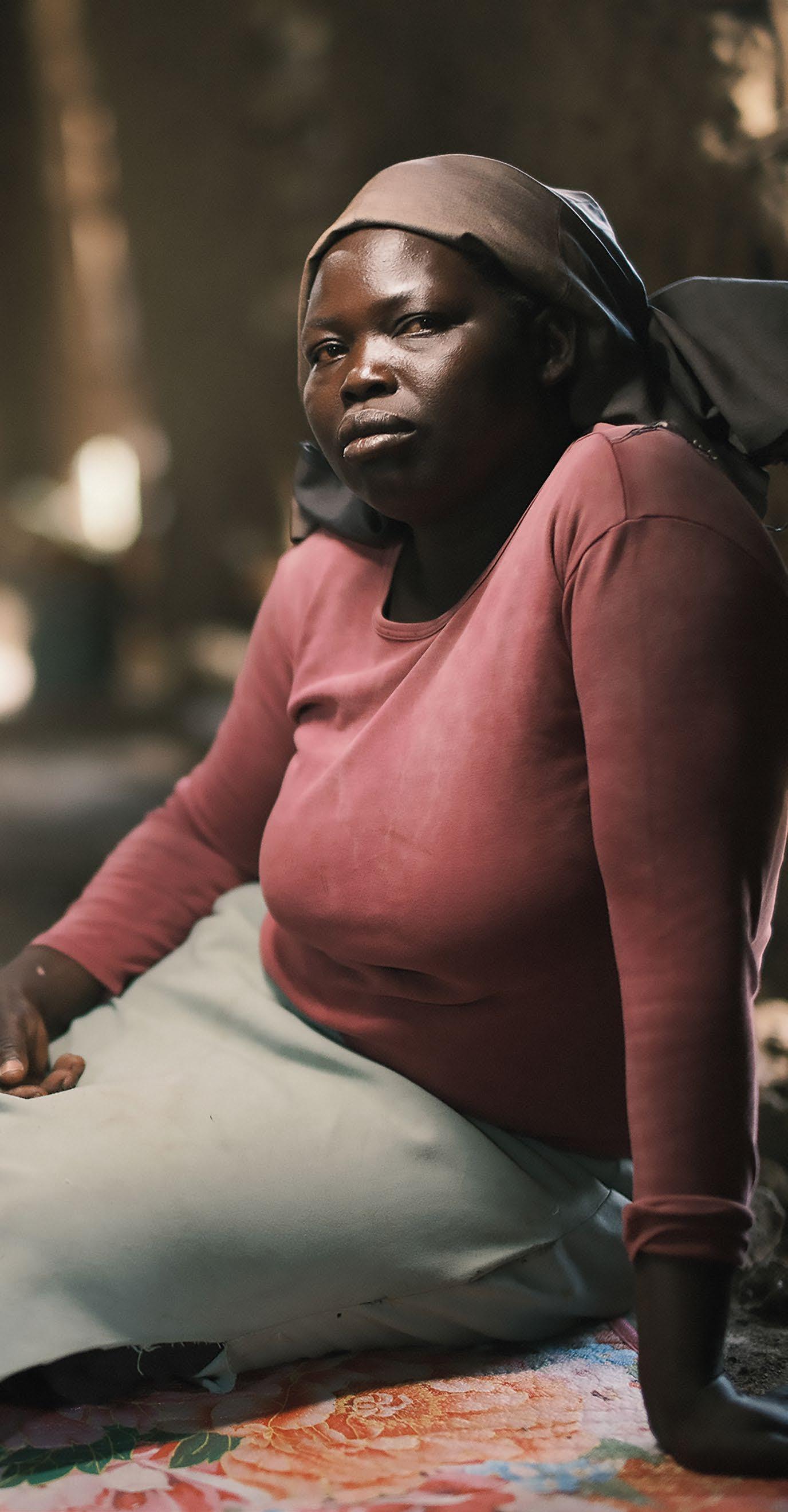

tearfund.org
100 Church Road, Teddington, TW11 8QE, United Kingdom +44 (0)20 3906 3906 info@tearfund.org /Tearfund Registered office: Tearfund, 100 Church Road, Teddington, TW11 8QE. Registered in England: 994339. A company limited by guarantee. Registered Charity No. 265464 (England & Wales) Registered Charity No. SC037624 (Scotland) Photos: Tom Price/Tearfund 1087-(0524)
Tearfund,
Scan the QR code to donate or visit tearfund.org/ keepthefaith










































 SEGUN AKINWOLEOLA
PASTOR MATTHEW ASHIMOLOWO
DR ROBERT BECKFORD
SEGUN AKINWOLEOLA
PASTOR MATTHEW ASHIMOLOWO
DR ROBERT BECKFORD



 BISHOP JOHN FRANCIS
SHABAZZ GRAHAM
BISHOP JOHN FRANCIS
SHABAZZ GRAHAM









 PASTOR ADE OMOOBA MBE
BISHOP TEDROY POWELL
BISHOP MIKE ROYAL NOEL ROBINSON
REV DR ISRAEL OLUWOLE OLOFINJANA
PASTOR ADE OMOOBA MBE
BISHOP TEDROY POWELL
BISHOP MIKE ROYAL NOEL ROBINSON
REV DR ISRAEL OLUWOLE OLOFINJANA







































































